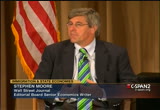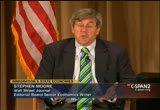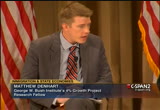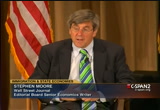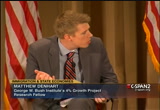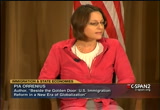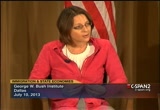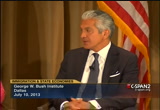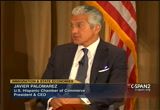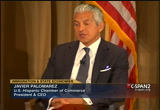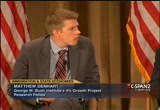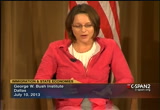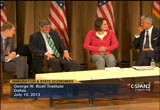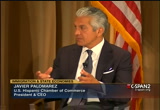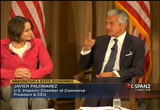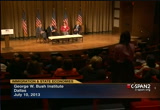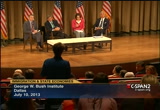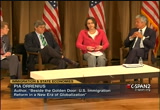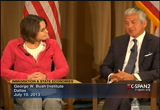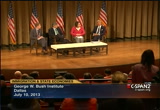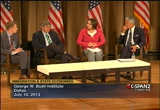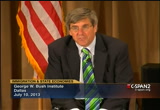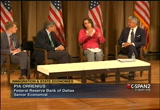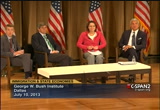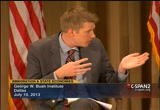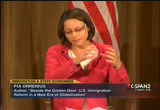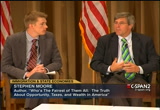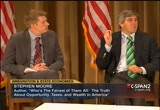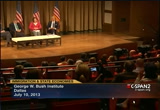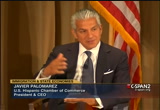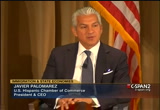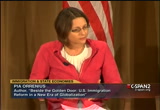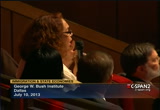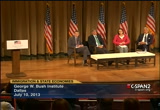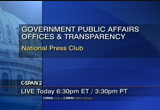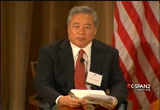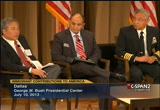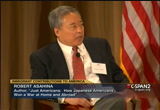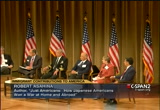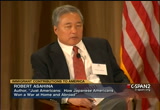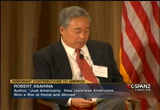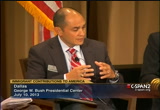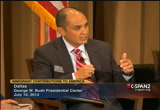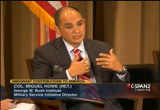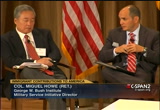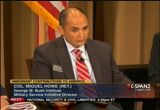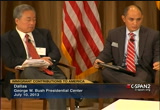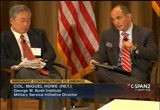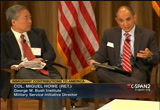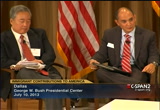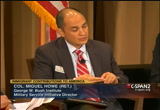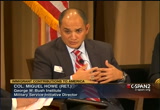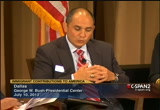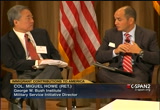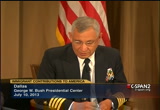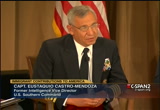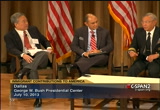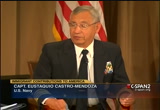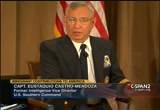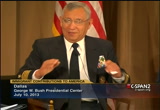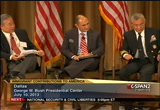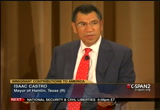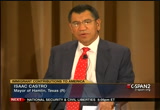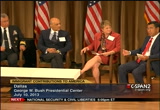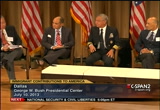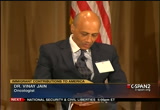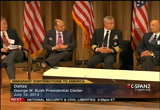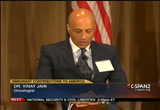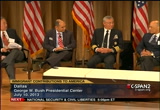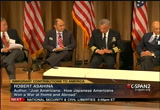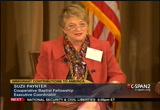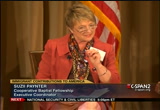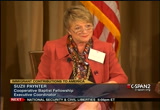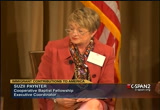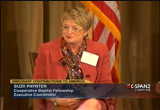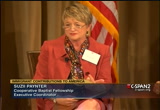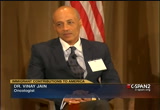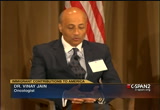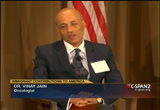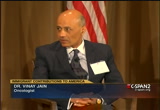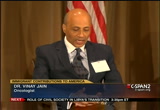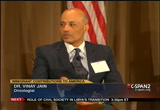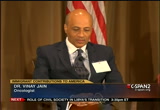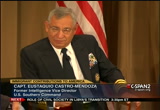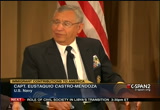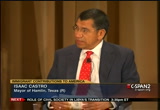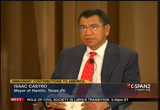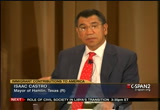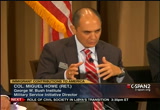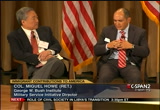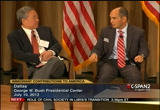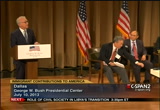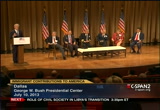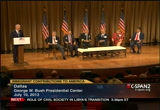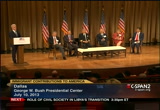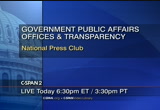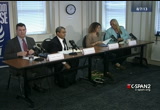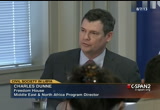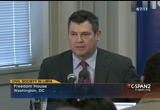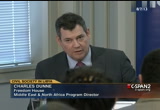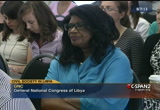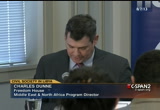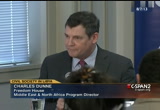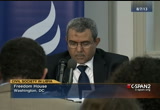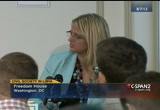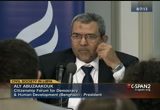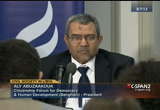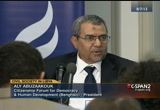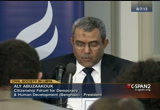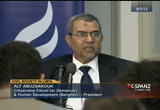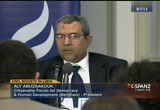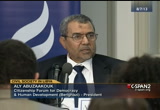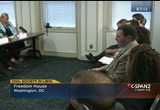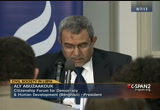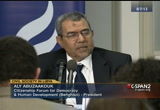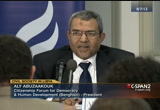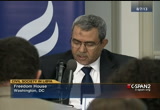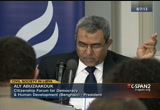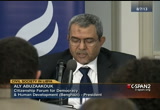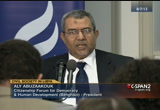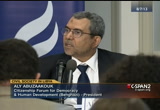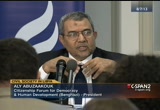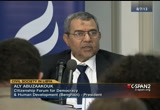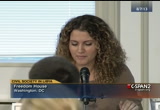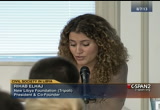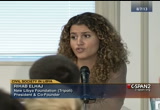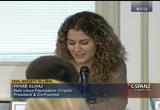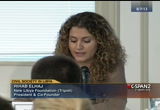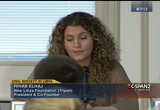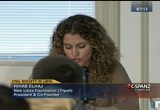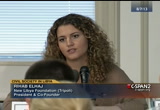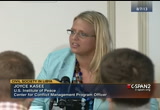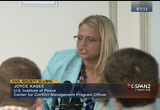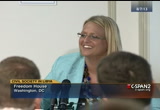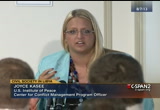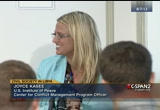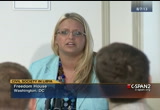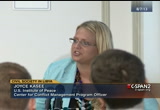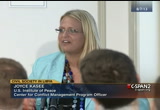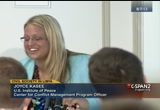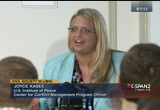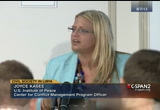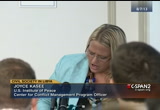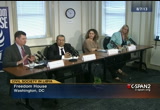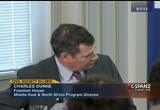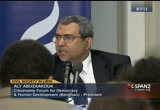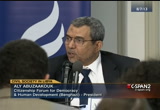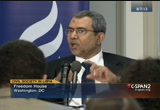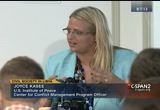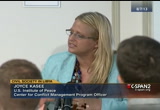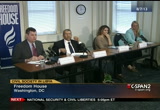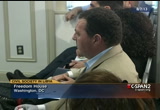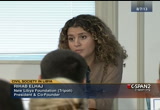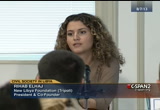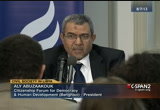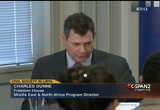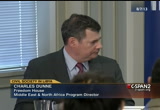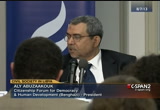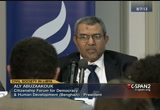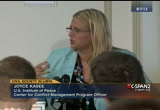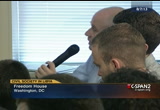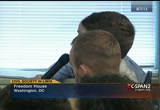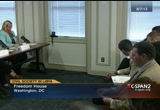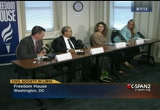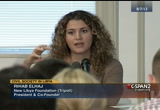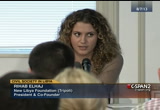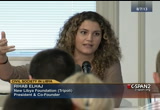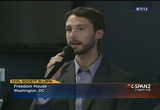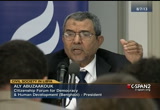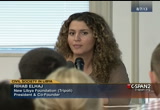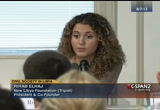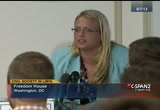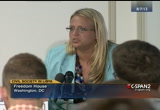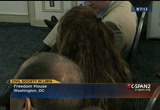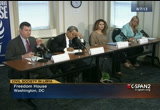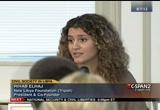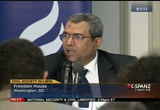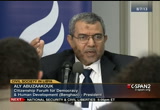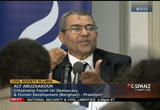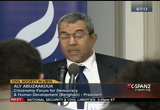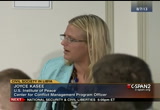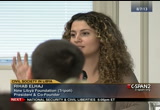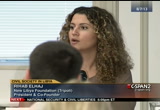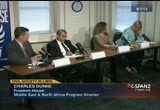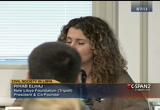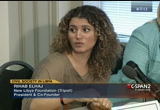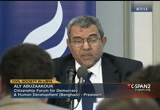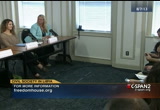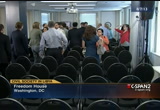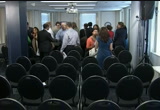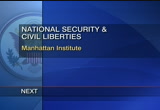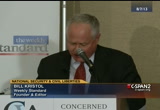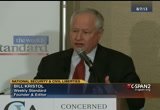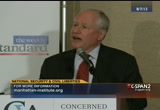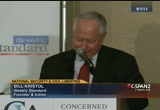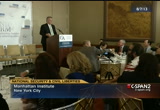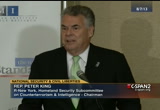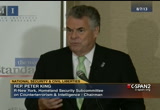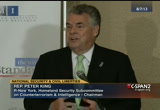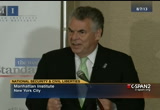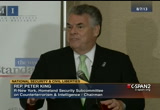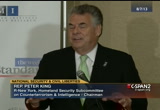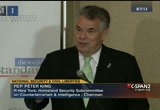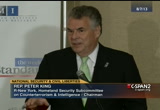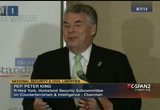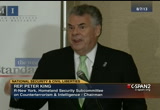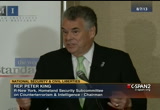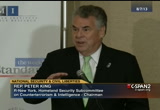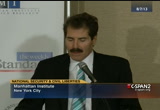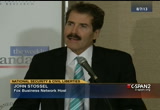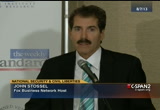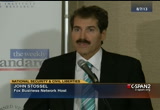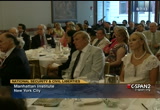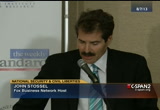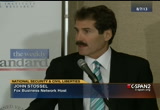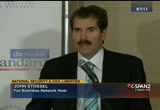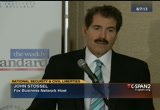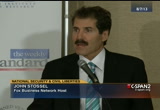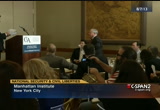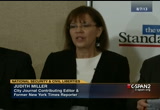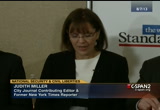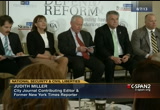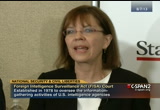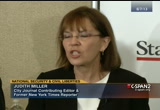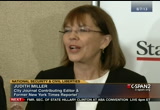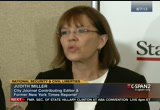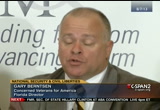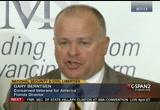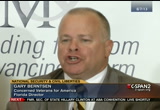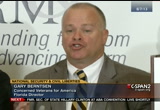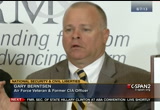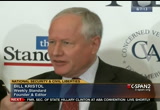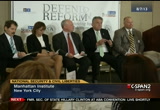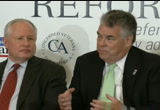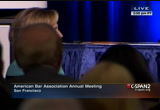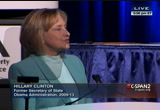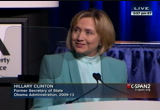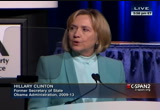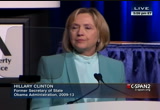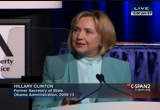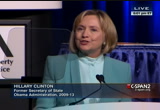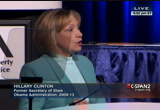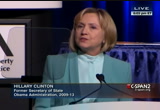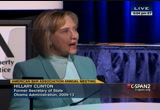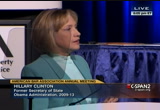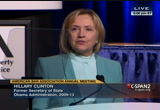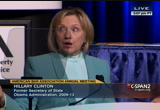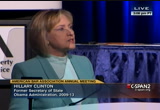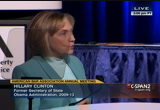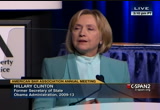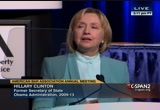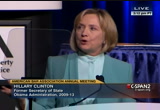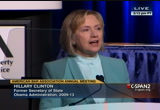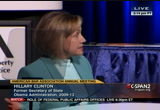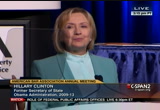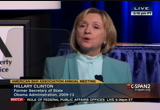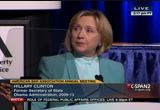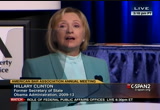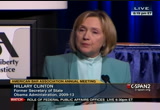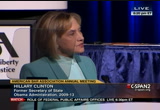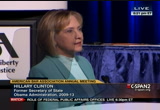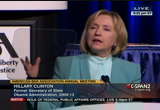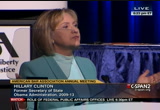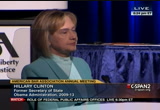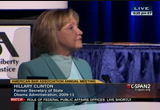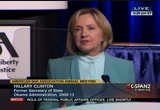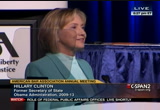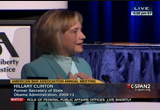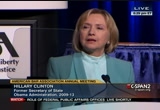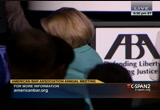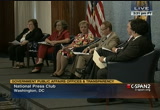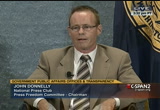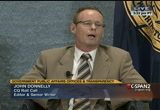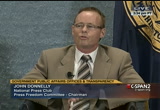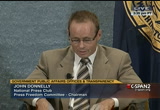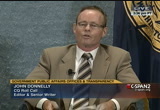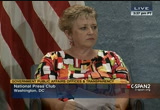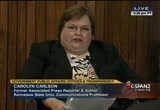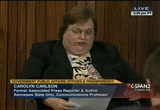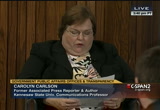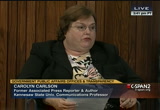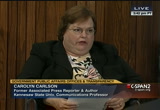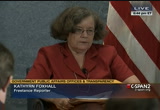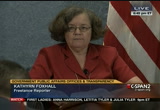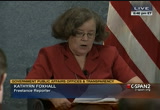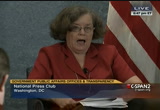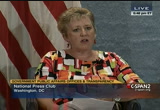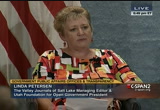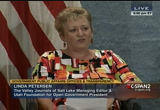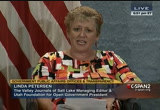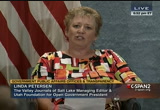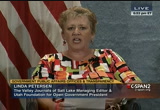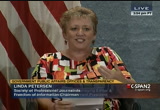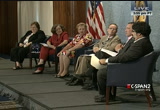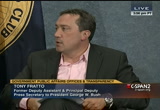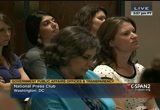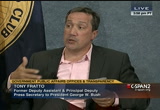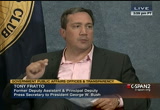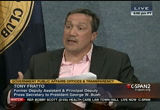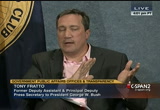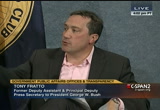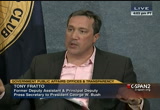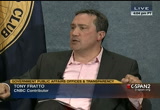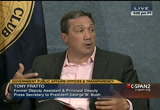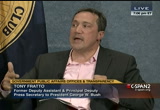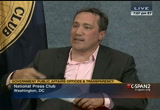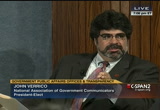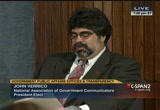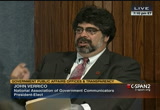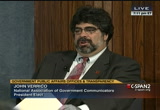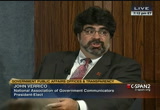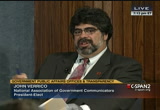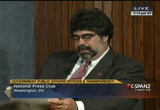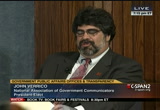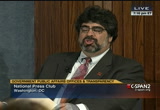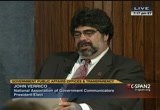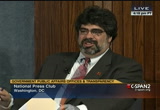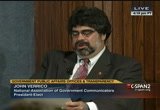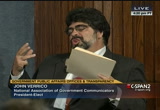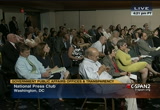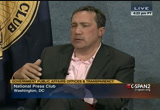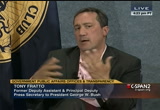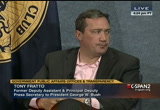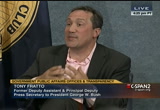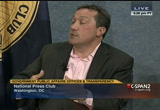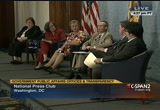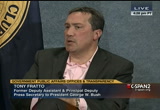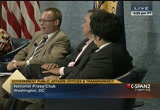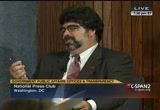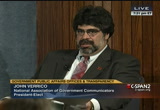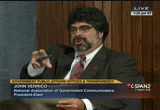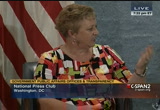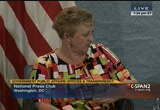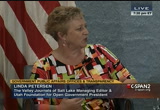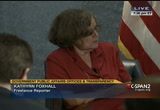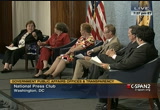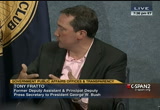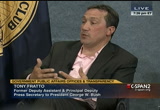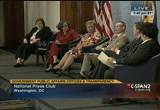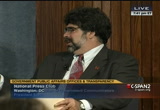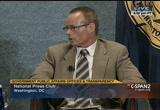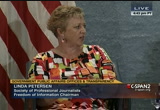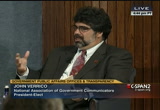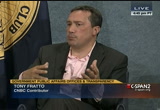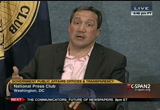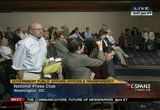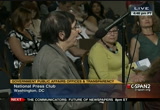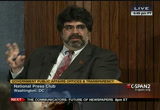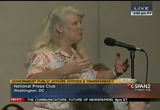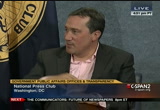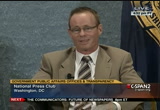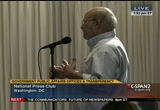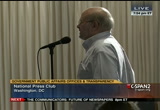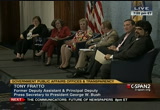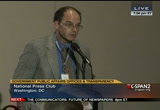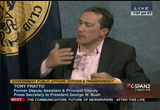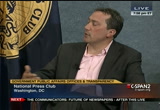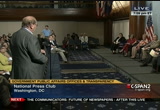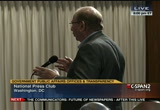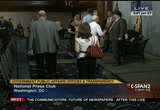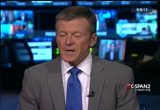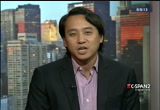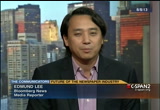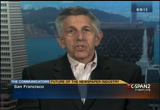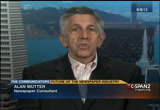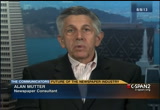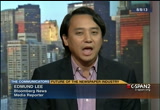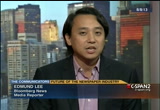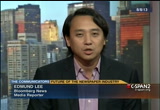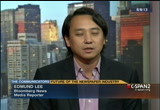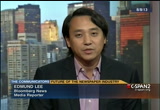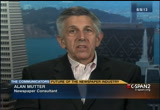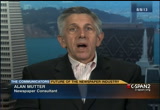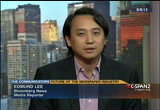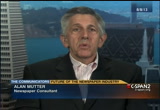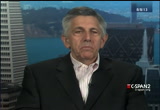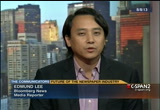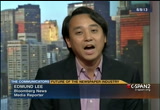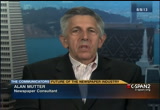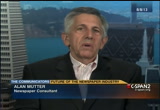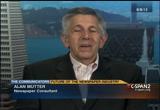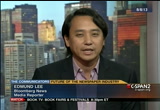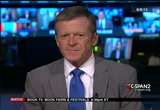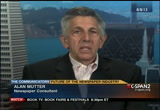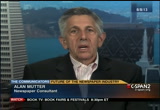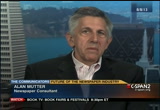tv U.S. Senate CSPAN August 12, 2013 2:00pm-8:31pm EDT
2:00 pm
texas, this is the supposition, but texas has that kind of free enterprise mentality that some of these states like california don't. .. and it's really an amazing phenomenon, they've got taken over those occupations. past events and job placement? probably. used to be whites and blacks that have those jobs. now they're going to eastern europeans. when you look, there was a "washington post" a big story on
2:01 pm
this, they were saying -- they interviewed a lot of these people which most of them were very new immigrants. some had just arrived. i just thought it was fascinating, the attitude of these immigrants. several of them told this reporter the great thing about america is there's all these jobs. that's not something americans think, like there's all these jobs. the other thing on these immigrants said was, the other great thing about america is that if you work hard you can get ahead in this country. >> i was here in texas a month or two ago, and it was a small business, just one little taxi come and the driver was an immigrant. i asked him about his experience when he came to america. he said when i arrived it was like i was woken up and i had these opportunities.
2:02 pm
>> i think it's kind of ambitious drive that is unique to immigrants. let's face it, there's -- 99% of the people in the world never move from where the girl. watauga but the 1% of people are ambitious enough and courageous enough to leave your homeland is a very courageous thing to do. so this is as an economist, i just think this is one of the kind of innate advantages of having immigration. number one, they are preselected for kind of economic success. and number two, this gets back to my point about china, let's face it, the biggest issue over the next 50 years is the united states, china will be the world world's economic leader. i think that's the biggest issue on the world stage. i was only kind of half kidding. the biggest advantage we have over china is that we are a melting pot and china is a totally homogenous population. and i believe that gives america
2:03 pm
a huge competitive edge. if you go to places like, i was out at microsoft out in seattle, it's like a college campus, it's so huge. i gave a lecture there, about 300 other engineers come it was like united nations but it was people from every country of the world. nowhere else in the world you have that kind of dynamism and melting pot than you do in the united states. i happen to think that's a good thing. >> i want to turn you a follow-up on what was broader. why do you think texas is a good -- into the society? and also something you might run some light on, what are some the trends, are they still doing that well, doing a better? immigrants, asked deliver longer they gain more education. talk about that process. >> well, i think in texas is a
2:04 pm
microcosm of the u.s., in the sense that the u.s. does a lot of things right about immigration. me being originally from sweden, i go back and there was a horrible protest recently some of these immigrant areas around stockholm. and i look at the u.s. and i always think what a we doing right about immigration? the thing i think the us does right is a put people to work. you can devise, all countries take different perspectives on this. in europe, traditionally it's been a lot of refugees and asylum-seekers coming to europe and they have been placed deliberately, actually deliberately left out of the labor market, prohibited from working for several years, and the liberally on welfare but it's not they chose welfare but there were deliberately put there because they are protecting german workers or swedish workers by being out of the labor force. i think they totally got it
2:05 pm
backwards. because the best way to assembly people is to get them into the labor force and working. another, you know again, looking at the contrast, wanted it done in germany when is it we can't assimilate our immigrants that they are not learning german. they're not contributing in the labor force. they devised these courses. now you have to take 100 hours of german instruction so you can learn german. how do we do in the u.s.? we say you can speak whatever language you want, but go to work an amazing what people go to the workplace and they learn english on the job. they get along that way. and they value the society in which there in because they are benefiting from it in a tangible way. they'rthere seems a result, thet of their efforts. i think western europe is starting to come around and starting to understand the significance and importance of employment-based immigration that is not just for the u.s. businesses, so that our businesses can prosper but it's
2:06 pm
also for the immigrant. >> javier, you, like i said you represent businesses across the country. so i know you talked about other states that have passed enforcement laws. tie this together a little bit. is what we are seeing in texas happening in other states? where should we be watching? especially promising source of future growth and other places? >> i think there are other states beginning to emulate what we're doing in texas. i'd like to kind of go back to the point that steve was making earlier in terms of this is the place where immigrants in every corner of the globe, imagine trying to start yahoo! in afghanistan or ebay in, you know, some other nation. and the reality of it is they come here for a reason. but if you study the impact of immigrant entrepreneurs on our
2:07 pm
economy, historically, you know, some of the most iconic brands in the world were created by immigrant entrepreneurs that came to america. some fortysomething percent of the fortune 500 operations were stored by an immigrant, and if you study that phenomenon, iconic brands like at&t, bank of america, ebay, google, intel, coles, yahoo!, their all-star the immigrants and their all started here in the united states for a reason. i think if you bring that back down to the state of texas and what texas is doing, i think first of all we are leading the way. texas is the number one state when it comes to exports to other nations. and it's important to recognize and i think the state of texas does recently because of the leadership though shown by george w. bush, is that when you look at states like arizona, not typical in arizona, but i was
2:08 pm
just thinking alabama, arkansas' next. if you look at arizona, if memory serves arizona export something like $50 billion a year. if you look at texas can we export $206 billion a year. 35% of those exports go directly to mexico. i think george w. bush understood the tenuous but important relationship that has to exist with our neighbors to the south. i think he was very strategic and smart in building and growing and fostering a relationship over time. and today, texas is benefiting from his leadership back then. a large proportion of the hispanic owned firms in this state and minority owned firms in the state are actually owned by mexican nationals. and so this didn't happen by accident. it happened because very strategic visionary leadership
2:09 pm
happened two, three decades or a decade ago. now we are benefiting from the. >> creating an environment. >> absolutely. doesn't happen overnight. now you see other states beginning to recognize that and trying to emulate that. the beauty of texas is there is no shortage, no stopping the state right now at the rate at which is going. it's really good news. but i do see other states trying to kind of study what's happening here and trying to learn how to harness, to steve's point, the opportunity that immigrants represent to this state and ultimately to the nation. >> one question, we will open it up to audience questions shortly. by question for you. we hear some about the situation in mexico, the economy is improving quite a bit. and some demographic changes as well. what does that mean for texas, the state where you said about 50% of the immigrants are from mexico. what are some of those international changes? what does that have in store for
2:10 pm
texas? >> less immigration from mexico. and so we've already started to see that. and i think even what you look at unauthorized or offers immigration we are seeing a slowing flow from mexico and i think they'll continue in the future. on the benefit side though, that is we're very excited about reforms in mexico. if you think the texas economy right now we're in the middle of an oil and gas been an economy is growing very quickly. and, of course, what we're really hoping as economists, as the texans also looking into mexico saying they are talking about an energy reform. could you imagine? michel and south texas extends into northern mexico, that would be really good for the texas economy. we all already hitting records in terms of our exports of natural gas to mexico. everything in mexico is paying off in the texas. we're so excited about more good
2:11 pm
things to come. >> let me say one thing about this. one of the things that bothers me, i'm in washington so i'm involved every day with this immigration debate, maybe some of you may not agree with me, but the united states senate just passed a bill to put $30 billion more in basically quote securing the border with, i don't know if they want to build the berlin wall or what, but the whole idea of the immigration of the texas and mexican economy which will begin with nafta is such a positive thing. and i just hate this idea that we're going to kind of wall off america from central america. because as you said, immigration of these economies in such a positive thing. [applause] spent i'm glad some of you agree with it. nobody in washington -- >> may i had a point? because i feel the same way state does. ideas can't be as a reverent sdk and. but i admire so much a plainspoken truth.
2:12 pm
i had an opportunity to speak to the president, president obama writes be did he is not the president here. >> right as he was departing to mexico. and, of course, we talked about immigration reform, and i of course wanted to talk about it from an economic perspective. that was fantastic. so i said, the reality of it is you wouldn't be mr. president if it were not for the hispanic vote. never in history of this country has the hispanic community played such a critical role in electing an american president. perhaps more interesting, never again will the be an american president without quoting hispanic vote. but the reality of it is that as leader of the nation, i implore you to please begin to change the narrative that has for time immemorial defined the relationship between mexico, latin america and the united states. >> not just with mexico.
2:13 pm
>> we open up our opportunities and we participate in the world market, everybody benefits. >> every time i hear about it, and again these are the facts, but every time i hear about it, the narrative has got worse like illegal immigration and drug wars and border crossings and so forth. again, that is true. we are not turning a deaf ear or a blind eye to that, but the reality is mexico is the second largest trading partner to the united states. it has been for decades and will be for decades to come. a good in england. bigger than france. bigger than pursue. bigger than andy. bigger than japan, and yet we never hear about that. the reason texas is in the position it's in is because it had a gun at a time that new that importance and courted that partner, that economic business partner. today, we are reaping the benefit. if the shale becomes what it could be, if we didn't have the
2:14 pm
relationship we currently have with mexico, because of george w. bush we wouldn't be in a position to be able to get finish of that opportunity that exists. but as a nation we would do well to recognize the economic importance of the relationship between mexico and the united states. >> thank you. thank you all for making that point. that's something i think we all need to remember more. we now have some time for questions from the audience. we would love to hear from you. we have such a great hill here, sort want to take full advantage of them with the time we have left. if you could, raise your hand. we have some microphones around the ringed. i would just ask if you would please give us your name so you know -- so we know you are. if you were hit with an opposition just let us know. and i would also ask please ask a question. we don't have that much time but we are happy to take questions. >> when you asked me about where immigrants are going now, the state over the last two years
2:15 pm
that has had the biggest increase percentage increase in immigration, has been north dakota. because north dakota is the state with, even -- >> we talk about 4% growth. i think it's over 8% growth. >> it's interesting that you have this state, you've got mexican immigration into north dakota now. it just demonstrates the point that immigrants go where the work is. >> absolutely. >> my name is deny, i'm with the dallas women's foundation and this may be a question for kind to our hobby or. with immigration being such an important engine for texas growth in our past, i'm very concerned about our issues with educating many of our hispanic youth in this country, both through k-12 as well as through the college stage. and our inability to provide a strong education going to be hindrance in the future? >> pia, you want to jump in?
2:16 pm
>> i think you hit on a very important point that we need to touch on in this conversation, and i think that we benefit greatly. immigrants that came to come in obviously are working age and they are already educated, and pretty much their education is done. and so it's the job for us then becomes to educate their children, which will be our future. so that is very important path, and i think that's something where with growth comes all these responsibilities to fund to a greater extent education and health care. and i think that's something probably the legislature has been struggling with in putting together the budget. it was easy this time than the last time, but when you so much population growth every year, our population goes over 400,000 people, half of those are in migrant with some of them large families and so forth. so i think that we have to have
2:17 pm
a clear understand that when we go this fast and we could attract as many people, there comes a large responsibility, education and health care, even infrastructure, roads and water. >> stephen cohen anything to add? >> i am at a point to that. i think when you look at the issue of immigration, there's a huge correlation i think between, or an intersection between immigration reform, business and education and business. first of all at the united states hispanic chamber we're not a political organization. we do not take sides. were a business association so it's about free trade, economic growth, job creation, et cetera. for the longest time with struggle as to whether we should even have were voiced an opinion as it relates to education. but certainly the hispanic community, there's a real challenge in terms of getting our youth to the proverbial next level and tons of secondary
2:18 pm
education. but if you look at it, education is an economic issue. it is a business issue. as a nation i think the sooner we begin to grapple with the notion that we've got to have a prepared and educated nation, which means educating the kids to come after us, we are not going to be the economy that we are. and at the end of the day, the greatness of this country, to large extent, rests on the fact the weather phenom economy. the economy that rest of the world comes to and where all innovation, the majority of innovation happens. but at a very concernin concerne are running out of educated and trained and prepared individuals to take us to the next growth opportunity. and so i think that there is a place for business to take an ownership for the education challenge. i'm very pleased when i see organizations, by the way, at&t, by the way a member of the --
2:19 pm
and by the way, headquartered in dallas, texas, in that i believe through their investment to help stem the tide of high school dropouts, they've invested some $300 million this year although to try to help that. but i think it's critically important to i think it's going to take all of the players in our community including your organization which is athlete of trying to create a thought process that's going to get us there. i don't think will get to the solution we need as a nation and less business gets involved, and texas again i think is leading the way in illustrating that businesses and business leaders see that correlation and are investing real dollars in helping to solve that problem spent on this issue about immigration with respect to education, especially the children, those are very real issues for states, especially the ones that have a big surge in immigration. but looking at the big picture,
2:20 pm
one of the reasons immigrants are such a huge economic advantage to the united states is because most, if you look at the most recent country data, about 65% of immigrants come to the united states between the ages of 18-35. they're right in the sweet zone. right when they're starting the roof -- working life. if an immigrant comes to this country at the age of 20 is like reverse foreign aid. the own country spend all this money educating these immigrants and then they come to the united states. if you view a human being as an investment in the first 20 years as all class and then during their working years is when you get the payoff from the investment. the reason immigration as such he is asset to the united states is we don't have to pay for the education class for the most part, the sending country does. and that is as i said the value of that each year to the united states is in the hundreds of billions of dollars. your point is right.
2:21 pm
immigrants have children and the fact they have more children often than americans do so there are those education classes for states like texas but let's not forget on balance immigrants are contributors to the public education system, not opposed to a. >> that's fine. i don't agree. i just wanted to add a couple of things. we just got recent data out about a sharp increase in the graduation rates among hispanics. so that's true for texas, also true for the nation i believe. so that's really good news. i think we're still trying to understand the processes because the increases are large and so think we're trying to understand how it's happening. it's suggesting that those projections made way off in terms of projecting out 30 years from now, you know, still 20% of nativeborn hispanics are going to drop out of high school. it doesn't look like that's going to be the case, hopefully. we are seeing the beginning of the changing. the other thing i wanted to say
2:22 pm
quickly was we focus a lot of education but we didn't -- we did an interesting study on dallas poverty and the poverty gap and we're looking at made his and, natives and immigrants. the fascinating thing that we came up with was we focused so much in education but the biggest discrepancy, the biggest explanatory factor for high poverty rates among hispanic immigrants was english. that kind of pokes fun at the germans are there. i'lofftake backloaded about that because we found that not being able to take english well or fluently explained over half the poverty gap between hispanic immigrants and natives. that was a huge factor. that's really, really important. and i think we could do more. i don't think that gets as much attention. >> another question, please. >> my question, what would you have done had you lived next
2:23 pm
door to the juárez and you couldn't supply your family with food, clothing, shelter, education, transportation? but you knew of a country, the economics for the minimum wage was 10 times greater in this country next door. what would you have done for your family? >> let's ask the panel real quickly, thank you. i think that gives us, gets us to a good point. people by chance are born in one country or another the it seems natural to want to follow the opportunity. what do you do the? >> i would have bothered god yet again with yet another request. i would have gone to the neighboring country.
2:24 pm
>> i think let's talk a bit about, so some of the barriers, i know you've written about this, we don't have a good way to come your. that's part of the problem. what are some of the problems about not having a way to come into the country? >> that's a good point because if you sort of seal the border with mexico, let's be honest, the great maturity of unauthorized immigrants come here for work. then those work opportunities will be open and how are they going to be filled? will they be filled with these overstays? will be filled with illegal immigrants? will they start coming in from canada? it's interesting to think even not going to fill the void with some workers, that was a void previously been filled by unauthorized immigrants, then how is this, how is this going to play a? what are the unintended consequences of doing what they
2:25 pm
are planning to do? >> steve, what's the most sort of pro-growth way we could provide a way for people to come here and work? >> first of all i think this gentleman has a great point. i was in west, texas, hunting, and i'm not a very good hunter but i was hunting with a group and we're out in the middle of nowhere in west, texas. we were not too far from the mexican border. at night some of these migrants would come to our door and they would want water are just some basic food and so one. that's an incredibly come to me it's just an incredibly heroic act that people would take the chance to come across the border and report their lives at risk to come into this country. i just think it's an important point that we remember the people always ask me, when we know that america's in decline? and it's when a million people want a leader instead of come here, right? it's the fact that people will risk their life still to this day because there is something
2:26 pm
we should admire about our country and the people who come. so to answer your question, that migrant families wants to connect them how we do allow them to have a legal channel? we've written a lot about this. there's no question that illegal immigration is a function on job opportunities. if we get this economy growing, jim glassman at 4% and we get the rates and 5% would is what we should do, they will come. for the very reason you said so. what we need to do is make sure there are ways they can come here legally. the idea of setting up an agricultural worker program, the program has a lot of negative connotations to it or a lot of abuses to the mexican -- >> that was a program in the 1960s. >> but if you look at, if you want to know the single most effective program in the history of this country in reducing illegal immigration it was the guest worker program. we reduce illegal immigration by
2:27 pm
90%. by 90%. by having a plan where people could come here legally. so that's the obvious solution. by the way the immigration bill before the congress does that and that will be much more effective than building these surveillance towers and putting triple fences and things on the borders. letting people come there and a legal way is the way to do it. >> great. to we have another question? how about down here in the front? please wait for the mic. >> [inaudible] >> that's okay. >> i'm with carnegie. a great panel. talked a lot about how texas economy has been, compared to an arizona or alabama, because of the hospitality and the political environment had been so favorable for it. are you worried about some of the harsh rhetoric starting to
2:28 pm
come out from people who are elected about, about how it sort of anti-immigrant that will affect your economy in any way? >> javier? >> i'd, again, without getting political i think the fact of the matter is that, that we see a lot of very harsh rhetoric and ill-conceived legislation that oftentimes is very draconian in the community spirit we've seen in florida. we have seen in georgia. we have seen it in arizona certainly. and at the end of the day, in our mind can we look at things from a particular perspective. this kind of anti-immigrant sentiment that leads to the anti-immigrant legislation is not only bad for the immigrants, we need to consider that it's bad for the immigrant, it's bad for business and that makes it bad for america.
2:29 pm
and that correlation, it's like 100% every time you look at these types of bills, and those that have passed into states like alabama and arizona, you know, the economies of the states have gone from bad to worse. that's a matter of record. there's nothing emotional about this. its clinical. and so i think every state, and nation, needs to be clearheaded about what we are intending to do. certainly it's an emotional subject. it is i think a both ends of the spectrum, but as an organization that really kind of tries to put the camel through the eye of the needle, if you will, the best thing that we can do is continue to remind people that there's some important economic or commercial implications to this type of draconian legislation. >> that's our focus here. we think that americans, they agree on immigration a lot more than we hear about a lot more
2:30 pm
than even a lot of us realize. especially when the talk about these economic contributions. a lot of times that's the third of four think people think about when they think about immigration. what we are trying to do here with this session and with all of our work, you guys as well i know, frame it back to the people, to americans so they can have a more informed debate on the topic. >> texas is very different from southern states but in 2010 although we did have lots of bills introduced with some of the harsh rhetoric and those like arizona, i don't think anything ended up passing. i think however it works, and often it works to the benefit certainly to the type of economy i would say, so it was really an astounding demonstration of just how different things are. and so i'm not saying again that there are not supporters of the harsh redick and so forth.
2:31 pm
i'm sure there's lots of come and for good reason as well, like i think in some case, texas is just and it's another demonstration of how different we are here and it's interesting and it's also has significant meaning for the economy. >> i think we have time for one last question. if there is one. please. please wait for the microphone. >> patricia from san antonio. you are talking to people that come here legally just to work. and talking to people both in mexico and your -- >> dgc legally or illegally? >> both, legally and illegally. this is the sentiment of people to come to work your butt they want to go back home to their families over there. so a worker permit is something that would be very beneficial, because they really don't want to stay. many of them stay here because if they go back, they can never come back.
2:32 pm
i'm sure you know that one worker may be supporting three or four families in mexico, with the money that they earn in the states. so their longing to go back. so i think particularly the return of these workers would open a door of opportunity for other people to come and go back, and then they would not stay, become a burden like what they call a sometimes. and i think there's something very provocative that should be, you know, because i myself when i came your, i was longing to go back for 10 years. i doubted myself and i made myself so happy but i don't want to go back because this is my home. but if the working permits would be for one year, it would be very, very good. >> right, wonderful. wonderful. i think we're about out of time. before we go i just want to thank the panel one last time.
2:33 pm
i think a key message we learned from this session, people are an asset. a special immigrants are an asset and they help drive the growth of the economy. >> the only regret is i wish paul krugman had been there. because paul krugman seem to think texas is some kind of backwater state without indoor plumbing and things like that. but this is what drives -- thank you for putting us on. >> let's thank the panel is and will turn it over to ambassador glassman. [applause] >> tonight on c-span2 at 6:30 p.m., then committee holds a discussion on whether government public affairs offices i really felt for opening government. the panel includes journalists and media communication firms.
2:34 pm
2:35 pm
a group of naturalist citizens share their stories of how they came to this country, succeed in every field, and how they get back to their communities. among the panelists are a medical oncologist to start his own business, and two brothers who serve in politics and the military. it's hosted by the george w. bush institute in dallas. >> thanks very much. one of the questions that came up at the end of the last session was about immigrants as human beings. one of the things i want to encourage all our panelists to talk about is their own human and personal experience. but to get to the point i want to move from a personal to the abstract for just one second. the book that i wrote that jim was kind enough to mention was about the experience of japanese-americans during world war ii. and i'm sure most of you know that after pearl harbor, over 100,000 japanese-americans were
2:36 pm
forcibly removed from their home and thrown into camp where they spent most of world war ii. that is, most of the three years after pearl harbor. as you can imagine, this was a huge dislocation to the japanese-american community. but the book i wrote was not about that. the book i wrote was about a much lesser known part of the story, which was out of that experience, a segregated unit of american soldiers called the 442, the 442nd regiment combat team, was formed out of volunteers. about half of whom came out of the camp. and this unit went on to become the single most decorated unit for its size in world war ii. and in writing this book i was struck, as i'm sure you are, by the fact that the very men whose
2:37 pm
families and in some cases themselves had been treated in the worst possible fashion by their own country, nonetheless volunteered to fight for the very country that had betrayed them. and i saw in this a story about what it means to be a citizen. because we had a lot of talk about the formal causes of citizenship, but being a citizen is more than just taking an oath and being a citizen is more than just beating former requirements of citizenship. one of the suggestions that came out in the last panel was this process takes several years and it often does. but it also takes a commitment on the part of the individuals that is exemplified by what the members of the 442nd day. but can be found across all spheres of life and not just in combat. combat provides the most dramatic example but we see people making choices everyday,
2:38 pm
large and small that add up to what it means to be a citizen. we forget that the concept of citizenship is both a very old and a very new one. it arose in the time of the greek and roman state. but then it really disappeared for about 2000 years. we didn't talk about citizens under the emperors and the kings. they were not citizens. they were subjects. it was only with the advent of the enlightenment and the spread of democracy and the american revolution that citizenship became an issue. and he became an issue because freedom became an issue. it became an issue because free men come together and form a state. and that imposes a special obligation, not just on the face but on the individual to decide to a citizen is and how you become a citizen. so a lot of what's going on in the public debate now, concerns
2:39 pm
the specific policy aspects of that. but there's a much larger philosophical question of what does it mean for me to be a citizen? what is going to cost me not just in terms of $680 but in terms of my identity as a human being. so this abstract question of citizenship that something worked out a very dramatic fashion in the book that wrote is something that all of these panelists have something to say either out of both the own personal expense or something they witnessed. so i want to move that question, that is the question of citizenship as involving responsibilities and in some cases involving sacrifice. and it's a great honor and pleasure to be here with two members from one active and one retired, of the military who can speak to that. but other members of this panel will also be speaking to it in terms of personal about what it means to be a citizen. so i would like to begin with miguel howe who many of you may not ask the director of military
2:40 pm
service initiative here at the bush institute. he had before that a very long to establish career in the u.s. army, which i'm sure refer to in his talk. but in talking to them before we started this band can he and i were both very struck by something that president bush said in his remarks this morning. that the members of the armed services were immigrants had risked it all the first time to become an immigrant, had given of their own country, had changed the light which have that settled in a new land. and by joining the armed services they were risking it all a second time, to make it possible for their children and future generations to have the same opportunities that they day. so i'd like mcgill to talk a little bit about that both in terms of his expensive at the george bush institute but also more important in terms of his expense as an army officer. >> thank you, robert pear like to start out by wishing
2:41 pm
congratulations are in news says, particularly corporal and a specialist. but to all of our newest citizen because my experience over the past 24 years as active military service has been a most passionate engaged service oriented and patriotic citizens and service members. and so as the director of the military service initiative here, i have the honor and responsibility to lead the bush institute's efforts to honor the service and sacrifice of all of our post 9/11 veteran, military service members and their families, but also to empower and unite these efforts of nonprofit, businesses, universities, individual citizens, and communities to prove the well being of those veteran service mayors and their family, but also to unleash their potential to continue to serve as national assets into
2:42 pm
their communities after their military service is over. and so since september 11, 2001, 2.3 million members of this country have donned the uniform are worn the uniform in iraq or afghanistan. and since 1973, we have been an all-volunteer force. so every young american, and i think we would still like to consider ourselves young, but every young american who raises their right hand and sites that oath of enlistment or that both of commission, which sounds very, very similar to the oath of citizenship that we heard this morning has really i think demonstrated that courage that robert described on two levels before the even set foot in places like iraq, afghanistan or wherever else our nation is called them to ensure our freedoms. and so those 2.3 million, ma and
2:43 pm
there's yet another 1 million who will lead the service in the next five years, but that 2.3 million include approximately 100,000 legal immigrants who were not yet citizens as we saw today with a young lance corporal in specialist who became citizens. and so that's a pretty significant percentage our military who, before they even become citizens, have made that commitment and had the courage. one of the mottos of the first units that served with him industry unit and hawaii was deeds, not worse. as you spoke, robert, in terms of action that come with the words of responsibilities as citizenship, clearly they have demonstrated through the action and their willingness to serve, knowing that they're going into harm's way, that they're likely to go into harm's way, and may
2:44 pm
be asked to make the ultimate sacrifice by doing so in order to achieve that hope and desire for freedom and opportunity that is in the families. but not truly an act of love i think to do that as well for all of us, and all of our future generations as well. and so, until he recently retired i was, i recently retired out of the seventh special forces group, an army unit that has responsibility for special operations activities in both latin america as well as afghanistan. and because of the imperative to be able to operate by with and to our partners in all of this nation's, there's an impetus to have a language ability and a cultural affinity and understand for where you're going to work and your brothers and sisters and alice, whom you're going to work with. and so because of that, we both
2:45 pm
attract and actively recruit for within that particular unit the hispanic population. and so approximately 35% of the unit are all latino. but from throughout, this heritage is throughout all of latin america. and since 2004, ma our unit has had 40 soldiers killed in combat operations in afghanistan. and those 40 heroes include men with names like my rallies, -- morale is, gonzalez, and nunez. firstclass nunez, a father of two young boys is an immigrant from mexico. and so as a new immigrant, and as a naturalized citizen, he chose to demonstrate through his
2:46 pm
action not only what he recognize as the opportunities that came with him and with his family when he came to the united states, but the responsibility that he has every citizen to give back. and so david served on two tours in kosovo, a tour in iraq and two tours in afghanistan. and in his last tour in afghanistan, may 29, 2008, his team, his special forces detachment and afghan national army members that he was serving with ran into a very significant ambush from the taliban. they were very significant outnumbered at that time and so they were trapped. their convoy was trapped at an ambush site. and so david, again, deeds, not words, made the ultimate
2:47 pm
sacrifice, ensuring the safety and the livelihood of his brothers, regardless of their nation of origin, that they would survive. and so david's vehicle came under heavy fire. he manned a machine gun to put fires on any, to suppress the enemy while receiving significant fire himself. his vehicle burst into flames, and because of his concern for his brothers that were still in the view and because munitions were storing to explode, david starkey throw those munitions out the back of the vehicle. and so we stayed with the vehicle to ensure that his brothers that were with him would not perish due to the fire and explosions and a small arms fire that they were receiving. david succumbed to his bones during that. and -- to his wounds.
2:48 pm
he was recognized with a silver star, the third highest award for valor we have within the military. but david is just one example, one example, and there are countless from this era, from all of those preceding it from the subsequent of acts of love for the brothers, servicemen and women, for the country that they have adopted, as you described so well, even under the most pressing of personal, arduous circumstances. and so when i think of what you talk about, robert, in terms of responsibility and service, and identity in terms of citizenship, i have been blessed with the opportunity for the past 24 years to see and experience that firsthand.
2:49 pm
whether in iraq or afghanistan or throughout latin america, all the places that i've had the opportunity to travel to, and back at home within the united states every day during training. i also served for a time, was responsible for the army's recruiting efforts in southern california. and so over the course of 26 months where the opportunity to bring over 5000 young people the army service. and so we were responsible for an area, the five counties of southern california. i know california is not necessarily the right were to say today, but there's some great americans that are living and serving out of southern california for sure. and so that area spans a very broad socioeconomic spectrum and some very vibrant immigrant
2:50 pm
communities. and so i had the opportunity to see these young people balance both the opportunity and the service and the sense of duty and obligation that they had to commit to serve in the u.s. military. and there's some myths and stereotypes that military service is for those who have no other option. and nothing could be further from the truth. as we sit here today, less than 25% of all young americans, aged 18-24, are eligible for military service. because they don't meet the minimum moral or physical qualifications that it takes to serve. so we don't just take anybody. so mental is a high school level education, and physical standards in terms of height, weight, basic goodness and moral standards in terms of challenges or problems with the law.
2:51 pm
and so it really is an opportunity for the select few. those who are willing to do it. but for those are willing to serve, it does come with tremendous opportunity, whether that is the economic opportunity of a job or a career, and the benefits that come with military service. whether it comes from serving within a values-based organization within the army, honor, integrity and personal courage. the opportunity for education and for training the new skills. and so there's the technical skills that some of bush we require within our communities and help our economy grow that we've heard about earlier. but then there's also some of the intangible skills of leadership and management and
2:52 pm
planning and situational awareness, judgment and decision-making under the most arduous of circumstances. the opportunity of being in a true meritocracy. when dave lost his life, nobody cared whether or not he was an immigrant or a citizen. they cared about who he was as a person. and as a broad and as a sister. so while those may be sources of, those are key sources of our personal identity for the team, for the family, for those that are serving in uniform, what matters is who you really are as a person, not where you came from or what your first languages. it's the last thing i'll say, robert, in terms of we need, we need these, we need immigrants within our service. we need them as a reflection of who we are as a nation. we need them for their talent
2:53 pm
and their skill. when i was in recruiting, i also had a nation and to recruit 40 noncitizens, legal residents, legal immigrants, so that we can leverage their language and cultural expertise, which i had previously not being aware of this program, leveraged in iraq, and subsequent leveraged in afghanistan. and so there are specific technical skills that they provide to make our military even stronger. but it is that commitment, that sense of obligation, service and patriotism that i personally, my experience has been the true strength, our immigrants serving with us. >> that's a very good summary of the contributions of immigrants to our military. i was very struck by the comment you made that the oath you take on entering the service is very
2:54 pm
similar to the oath you take when becoming a citizen. at our next panelist, captain eustaquio castro-mendoza, did, in fact, take both olsen. he took the oath of citizenship when you're what, in your early '20s? and shortly there after come in america. someone if you count a little bit about the qualities of your immigrant life that both let you to make both those, and that contributed to your obvious success since you are near the end of your 30 year career spent thank you, bob. thank you very much, and what i would like to do first of all is just thank the george w. bush foundation for inviting me here to this very important event. it's a pleasure for me to participate on this distinguished panel. i'm an immigrant from mexico, arrived here in 1962.
2:55 pm
and i think that my service, or my choosing to serve this country was for a number of reasons. one was my general upbringing, my parents who, my mother was born in bryan, texas, by the way. she went to mexico as a child, married my father in mexico, and then my father came back to the u.s. to work under the program in the early, late '50s, early '60s. and so myself and my brother isaac, here on the panel, we are products of a given society. but what brought us here was our parents desire for us to have a better life. and one of the driving factors for my entire family, a very
2:56 pm
large family, i will let isaac talk to some of that, i'm sure, was a pursuit for education. and a pursuit of a contribution to a country, which to us was very foreign and beginning. i mean, moving from northern mexico into north texas to a little town was an experience that i will remember forever, but it was a transforming experience for myself. and from that transforming experience, came by deep desire to be a productive member of society. i actually had no intention early on to become a military officer or my intent was to get a ph.d in biology, and i was pursuing a ph.d in biology. and i said you know what?
2:57 pm
i've always wanted to fly for the u.s. navy and it got to do that. i'm nearing the age limit for doing this so i've got to do it now. and so, as i went into the flight program in florida, you know, i didn't get my wings of gold, but i was so in love with the united states navy, and the military in general, because the u.s. navy and the military in general are like family. and i think a lot of immigrants are seeking to belong to a family type of grouping. and in this case, it happens to be the united states of america, the most wonderful country in this world, bar none. and i've been to many, many of those countries. i have known many, many people from all walks in other countries, and what i also think, and it's important to understand, is then why is it that so many want to choose to
2:58 pm
come to this country? and as miguel talked about, why they would want to serve in our military. and the reason is because, not just because of opportunity, but because they truly have fallen in love with america. and it's those ideals of democracy that we value, that we may sometimes take for granted, they don't. as an immigrant i never took that for granted. i mean, i came in knowing there was opportunity. and i was a child and i grew up here in texas, you know, to adulthood. so it's not just about getting an opportunity. it's about serving. it's about true patriotism. that's what makes people from afghanistan come to america, want to go back to afghanistan as soldiers wearing the uniform, and give up their lives for their country. you know, we have had citizens
2:59 pm
who have become citizens posthumously. you know, they've given their lives in the military. the military has recently facilitated people coming to this country and serving in the military, and then earning their citizenship through that service. which i think is a very good thing. and as miguel said also, that has given us a huge diversity within our military. and we don't see, in the military we don't see that diversity as a hindrance. we said very much as a very positive factor. and miguel has described some of the positive factors that arrived from that diversity. anyway, i think i'm getting off a little bit topic speak you are very much on topic. you stole my transition, which was i wanted to introduce the next, skip over the next day to get to the last person on the panel. ..
3:00 pm
in the so-called big country and i will steal his punch line. i will let him tell that story that he's had a very distinguished career as a politician and a public servant and has been a groundbreaker in the story i'm going to let him tell. >> thank you. well i might not be able to hit the bell, but thank you for
3:01 pm
staying. i wanted to brag about my tie. you can't see this but it is w04 come it's my george w. bush time when he was nominated in new york city. my brother and i grew up in a large family of 12. first six of us were born in mexico and the other six were born in texas on a farm where we grew up. i will skip forward and then you can ask me any other questions. when i first got out of law school in 1980, i was convinced to come home to stonewall county by county judge and the commissioner said the commissioners court would appoint me the county attorney.
3:02 pm
so why did that. came home june 2nd, 1980 appointed a stone wall county attorney. it didn't seem all that remarkable to me until later on, because i read in the newspaper a few years after that -- i don't know if it was two years or four years -- but i read in the news -- i don't believe everything i read -- but i read in the news that one of the -- there was a hispanic justice of the piece that had got him elected in abilene and he was the first official in the big country. stonewall county is part of the big country in the area. so at that point if it was true then i knew i was actually the first minority office holder in
3:03 pm
the area. so that became remarkable to me when i found that out, and then i tried to verify that there were not any other officials that were minorities and sure enough, there were not any others at the time. wasn't remarkable to me that i was in that position so much that it was remarkable that for older white men would appoint a 23-year-old hispanic to such an important position. so that's what came to me the most important factor. and now a lot of things have changed over the last 33 years. but that was the beginning of my career in public service and my political career as well.
3:04 pm
>> i think the point you made really needs underscoring which is what was regarded as a conservative part of texas that haven't known a lot of change for a long time, for white old men picked this then young hispanic man to be their prosecutor. and i think that speaks very much about this complicated but potentially rewarding, usually potentially rewarding relationship between immigrants and the people trying to become a part of. and i liked our next guest, if i can sort of top skip and jump a little that, vanay jane with clinical practice whose them also other things founding companies for profit and for non-profit that is himself a relatively recent immigrant who i think in our conversation
3:05 pm
suggested that he had somewhat the same experience as the new immigrant. and i wonder if you can talk about that. >> i would like to think the bush institute for inviting me here. my wife is here and is also an immigrant. we are pleased to present the community and be chosen for this now. my story began in 1984 when i came here to get a further education. i just finished my medical degree in new delhi and always wanted to be a cancer specialist since i was a teenager. it was a dream and it is still a dream. i am living the dream every day. america has the best schools and still does. i was lucky enough to be accepted by distinguished hospital in ohio, which is one
3:06 pm
of the hospitals in the forefront of advances in health care. i spent three years and ohio and then went to the national and became a governor and for five years i worked as an oncology researcher. also at this time i was amazed by the inclusiveness and the acceptance of the society. americans are pretty special people. and i can absolutely second the statement is made. i've been to many countries and i've lived in many countries and people are good everywhere. but there's something special about the average american. the average american is straightforward and honest and helpful and what other people to succeed. so the desired success is shared and the thought process is that your success helps me and my
3:07 pm
success helps you, so it is a shared success story. i was helped by so many people it's hard to count. but each step of the way somebody helped me come and guided me, gave me opportunities. and then just by pure chance actually were thinking of moving to california or moving to florida but ended up coming to texas. we came to nellis high and the gentleman that brought me here is still practicing the he is now 78-years-old and is working hard. our journey has been a journey of constant surprise and we just feel like you love your eyes and this is happening to you. this is a dream that i dreamt before we left the country. we were doing a number of things and i am still very involved in the fight against cancer. i'm in the middle of developing a couple cancer drugs with acute
3:08 pm
leukemia. i'm a specialist actually. and if you are fortunate may be in a few years we will offer some new medicines to patients who are struck by this disease. the city of dallas, two of them were born here and think of this has home now. this has been a great city for us to live. we have made many friends here. and we are very involved in getting back to this country and this community that has accepted us and made us not feel like immigrants. we feel like we belong to this community and with a little bit of luck and some effort, we hope that we can contribute in a small way for the next generation of people who choose to come here. >> thank you. very heartfelt perspective on this putative we can move a little bit towards the organizational i would like to introduce the final panelist who
3:09 pm
is the executive coordinator of the cooperative baptist fellowship which turns out to be much bigger than i ever imagined. you can tell us a little bit about that. one of the things she said to me in conversation is that one of her strategies was bibles, badges and business which is a way of uniting different constituencies behind the move to integrate immigrants. the nonprofit world of course has always been very much at the forefront of the process that we've described here, bringing new americans into society. and i sure your organization has done huge amounts for that. but i'm curious not so much from an organizational perspective but from a personal perspective the people who have benefited from this, how do they benefit and what do they do with the things you help them do and how do they move on to give back
3:10 pm
themselves the activities that you helped them with? >> i first of all want to say thanks again for including me on this panel. first of all president bush made in his comments and i saw on whitewater account he said immigrants bringing renewal to our national character and they have broad policy into our culture. i can say sincerely that in the base community and as a natural dissemination and beautiful part of our culture that immigrants have brought renewal to the church and to the characters, the moral character of our congregation and that they had a vitality to the culture. and primarily one of the most important aspect is the aspect of servant leadership. what you have heard today, and the title of this house immigrants served, they serve as leaders and yesterday's immigrants are today's
3:11 pm
theologians, pastors, committed and passionate visionaries. they are yesterday's immigrants that are chaplains in the military and hospice and hospitals. yesterday's new immigrants are in our inner cities around the world and the compassion industries and cultures and community. they would never expect another mission area. so in the community those beautiful gift of the new immigrant is for the renewal of our culture and the renewal of faith. one of the other comments that i would also connect to is when he ended the last panel and he made that compelling statement to bridge to our panel that when you stand up and say the officials for the belief that you have in the country. the first 16 words of the bill of rights are themselves a
3:12 pm
commitment to religious liberty and personal freedom. and i think this connection between the believe for many people who've come to our country and serve in our communities of faith, their experience they are spiritually connected to the people they've left behind, the homes they've left behind and maybe there a connection. dear citizens of two kingdoms. their citizens of this kingdom, but then also in the kingdom of god, the bigger kingdom. somebody asked me a while ago how did you get involved in immigration and for me my commitment came as a texas baptist because of our members in the hispanic congregation as we have over 1200 baptist congregations in the state of texas. in addition to the spanish speaking congregations in texas we have the 425 congregations that speak a language other than spanish and english every sunday morning. so the beautiful nature here in
3:13 pm
this one state is diverse. so looking again at those elements of how do our immigrants serve? they serve the connection again to the discussion about english-language and the movement of this one third, how do we help people move from this 8 million people who could receive naturalization services that they are faced with all of these problems. many of them have gone in their communities they have been approached by an unscrupulous, someone who's promised and immigration. in the state of texas and around the country, the cooperative we have churches in the 18 states and regions and 130 field personnel of the world. so to bring the integration services into the congregation
3:14 pm
to the accredited representative and the bureau of immigration and the accredited training so that the immigrants in that area can access low-cost trustworthy services at a congregational level. we work closely with our trusted partners in the catholic charity who are legal experts to a lot of the certification certify eink the training for the people within the congregation. but our immigrant communities are seeking not just to serve for themselves but as you have seen from all of these wonderful testimony is how they multiply the surface as leaders for each other and for other people. and so, these free services that are offered on saturday morning if you go back by the hispanic churches in your town on saturday morning you will see lines of people waiting around the building ready and waiting patiently to get in to have their status adjustment previewed for free by an
3:15 pm
accredited church. so these immigration services as a part of the community is one way that we are helping to promote that servant leadership and to hopefully bridge these gaps that we have heard about today so it's not just the service but it is also a way of joining hands with brothers and sisters towards that. and i say my husband and his service every sunday with a benediction that says risk something big is worth something good. in this culture and in our culture of faith i think we are asking them to list something big -- risk something big for something good, provide a class to reach out with the immigration services, reach out and support these individuals. the stories are heroic and they
3:16 pm
truly revitalize the community. >> that is a good transition to the next section of what i would like to talk about. risking something greg to bring out something good is exemplified by dr. jane who came here as a young adult and i was wondering if you can tell us a little bit about what in your background and then your family and in the culture of the country would enable you to make it possible to take that kind of risk. >> that is a great question and i don't know if i can answer that but i will give it a shot. they are defined by the people that we work with and the influence by the role models actually to look back either consciously or subconsciously you look back to people. a number of laureates that work in america that were trained at
3:17 pm
the undergraduate training this country, given the opportunity to use the gift skills to succeed for the good of society. so i wanted to work hard, study hard, and hopefully i would do something with on ecology we have about 120 different cancers and each one had a different reason each one has to be treated differently. so my hope is that from the time i started to the time i finished, if i could have one of those that i could make a difference and i would feel like i have done something and left behind something. but i didn't realize is academically i also have some business skills and those
3:18 pm
business skills cannot in texas. so i met my boss who is a doctor and also an entrepreneur. he said vinay, i think you should stop. i said i came here to practice medicine. he said you can do that but let me help you start. and i did. it became a very large business and hired literally hundreds of people so they do create opportunities for other people to benefit. in general everybody has more. and my story is true and other people just like me they never met a payroll and never even part of the person to have a company that has a huge revenue line and oncology and get jobs
3:19 pm
to so many people and created opportunities for a cancer patient to learn to read the magazine that is still being published called cure which is distributed in the hospitals and is meant for cancer patients. so it wasn't just coming when we start the magazine. to have the confidence to develop cancer drugs is an expensive process and it's quite uncertain and after investing years of work and money you may not have a drug that can fight the cancer. but i have the confidence that we should do whatever we are given to do. as i think the senior bush said to much is given much is expected. and i have received so much more that my wife and myself ever probably would have.
3:20 pm
warren buffett said yesterday something. he gave $2 billion to the gates foundation. people were praising him and saying how special you are. and he said something that stuck with me and actually he said i've never given a dollar that i needed. my wife and i feel the same way. we haven't given a dollar that we needed. he said that if somebody gives money they don't go to disneyland then that's real giving. if you give something that gives out of what you would otherwise. so i think i would get almost the entire credit of whatever success i have had to the people. people who have seen in me more than i find myself. and i continue to meet people like that. and i want to be like that for the younger people that come to work for me.
3:21 pm
so, hopefully we are only at the halfway point. i am by nature an optimist and i believe in the goodness of people and i believe in the human capital like you were saying people given the chance will do incredible things. i see that everyday. we work with the school district and i've always enjoyed going to elementary schools and we give them simple devices, but readers and many of whom come from mexico and other countries. at home they don't speak english. some of them are shy because they feel uncomfortable with of the language and i never really understood their challenges. you give them a book reader which reads to them, but kindle has a little something called text to read. they are not shy anymore. they can touch a button and each dictionary meaning is given. so i see those children and feel
3:22 pm
like here is the future generation or the next generation of doctors, astronauts, sailors, wall street bankers, everything, movie actors and i know there is a big debate going on the there's always an immigration debate going on. when i came in 84, reagan had passed immigration and 87 and was for amnesty and there there was all this concern. all those people assimilated and became a part of the society and that is a nonissue. there's a big debate going on right now and it's all right to have a debate so that everybody says they believe and. but i'm very optimistic that this would result in fall that we think is fair and correct and these people have another kennedy to become americans. they will become a huge part of the success of the country. >> i wonder if we can get a
3:23 pm
small consensus on what happened with them the castro family to produce this example of public service as well as your siblings. so you can fight it held in public about what was about your family, but it was about your parents experience, what it was about growing up that enable you to do the things you did and give back in the way that you have. >> i will take a first crack at it. it's hard, but it goes back to both my parents. my mom is a very strong individual. and like i said before, she wanted her children to come to the country where she was born and she wanted her children to be successful and education was a way towards success. so that was her primary driver.
3:24 pm
we were very fortunate to come to a place like old glory because old glory texas has a history. it's an immigrant community settled by german immigrants in the early 1900's. we were fortunate to come to this little community because i think that there have to be a linkage between us and the community that we came to serve. so quickly as children we quickly learned english. i think it took me two months to be able to converse with the other children in my school house. we came here in march and by may i was fluent in english and i learned reading. but for us it was all about education and about not wanting to fill my parents. they sacrificed all to give us the opportunity. when we came here it was a
3:25 pm
promise, not a promise promise that a promise of opportunity and that has always been the driver. in the large family that we had you have to compete with the others. >> let's hear the version from the younger brother and see if he has a different version. >> that's pretty much the way that i see it. our mother and father had no education whatsoever. but somehow, the new and they have always known how important an education is. i spent probably ten summers going out in the field with my family and other siblings and by the time is 9-years-old and i think the last summer when i was 19. we talked a lot about the opportunities that we had in
3:26 pm
this country. my mother always said you can be when you want here. and that was an opportunity to we wouldn't have had anywhere else. so all of us grew up hearing that and so as we graduated from high school, and of course everyone did, when we graduated from high school it was just a foregone conclusion that we were going to go to college. my mother and father didn't know to be able to instruct us about the colleges and majors and glasses or anything like that. so the always left those traces to us and it became a lot easier for me being sibling number five because there were pioneers in
3:27 pm
my family that had gone in front of me. our oldest brother, the first one to go i'm sure that i was extremely difficult for him. we would all as a family worked together to pitch in to send money and get them through school and then the next brother and the oldest sister and then my brother so we took turns doing that and helping each other do that. our next younger brother is a physician. so, everyone in our family except for one has a college degree or higher. but it was that instruction we have from our parents even though they didn't themselves receive an education. they knew how valuable and education would be.
3:28 pm
so we just instinctively in a way believed we could go on and keep going to school as long as we wanted. >> let me bring this full circle. if you could just say a few words about how an institution the armed forces health developed and respond to these qualities of judgment and decisiveness and leadership and so on and how the people who come up through the ranks can in turn benefit from those and serve the country and future generations. >> media will just give one small in compelling example. i was coming through my transition assistance program or class that all service members go through whether it is after 43 or 40 years of service that helped you with your transition from your military family back
3:29 pm
to your community. there was a young man sitting in that class with me, young assurgent ranger and we were talking about all of the opportunities that are now available. anything he could do, and he was looking at going home and being a cop in chicago and a lot of members kind of gravitate to the marshal service outside of the military so police officers or fire rescue. so we just started talking and i could tell that he had a desire to continue his education to teach and to influence young people. then he had an entrepreneurial flavor to him. i said why aren't you looking at that as well and he said why would anybody ever want to hire me? all we've ever done is lead people in a firefight in iraq ..
3:30 pm
the training and education and the leadership opportunities, and that called in the fire that you have experienced them you've been developing ways that you do not yet appreciate directly applicable to anything you want to do. >> i think that's a very inspiring note on which to end but also to open this up to questions.
3:31 pm
do we have a few minutes? >> not really. [laughter] >> but we will be having lunch, and i think the panelists will be there and the panelist from the previous panels. and i hope you can ask your questions then, i'm sorry. we ran a little bit over. we like to be right on time here in bush land. but i just want to say we've covered a lot of territory today. our starting point, just remind everybody, is that this is part of the 4% growth program. so it's part of our economic program, to bring america to 4% or as steve would have it, 5% growth. and immigration is a necessary engine to do that. actually it is more than that. it's america's comparative advantage. it's our edge on the rest of the world, and there is certainly the threat that we might lose it. so we begin by talking about texas and why is it that texas
3:32 pm
has done so well. a lot of the conferences, we have looked at success. so why does a certain country grow, why does a certain state grow, then we looked at the reasons for it. and clearly immigration is a major reason for the success of texas. and why is that? texas work. it's a kind of culture immigrants are drawn to, both the tax system, but the ease of starting a business and also the fact it is a welcoming culture to immigrants. i think that is just so important. and president bush talked about that this morning during the naturalization event. second panel is about the importance of naturalization itself in lifting the incomes of people who become naturalized and also helping america in general economically. and, finally, this wonderful panel about service.
3:33 pm
and you know, this is part of an economic, and economic program, but how do we quantify the contributions of miguel howe and the castro brothers, and dr. jain, the lies he is saved from cancer? i don't think that's recorded in gdp. but this is an enormous, you can call it an economic benefit to america. president bush said today, we are a nation of immigrants and we must uphold that tradition, which is strengthened this country in many ways. i think one of the ways we've seen today is the many ways in which immigration has strengthened this country economically, and otherwise. i just want to thank the carnegie corporation of new york and the knight foundation, and one of the foundation that is chosen to remain anonymous that have supported this event.
3:34 pm
and i want to thank the fabulous bush events team, led by for this event led by kate. it's kind of amazing. this event has put on an amazing event and very complicated in tanzania just a few days ago, and here they are doing this in dallas. and, of course, amity shlaes, matt dennard and matthew of the economic growth team. and i also want to thank the moderators, for their fine work. we should give them all and. [applause] >> as well as this been an the previous two panels. okay, it's time for lunch, but they lunch in the hall. thank you all for attending, and it's been a great day.
3:35 pm
♪ >> today, former secretary of state hillary clinton received the aba medal at the american bar association's annual meeting in san francisco. the aba medal is awarded for service in the cause of american justice, and it is the highest honor given by the organization. see that even live 6 p.m. eastern here on c-span2. >> tonight on c-span2 at 6:30 p.m., and national press club's press freedom committee holds a discussion on whether governments public affairs offices are really a help for open government. the panel includes journalists and media communication firms.
3:36 pm
>> the freedom house in washington, d.c. hosted a discussion last wednesday. the discussion was on the state of civil society in libya one year after the general national congress elections, and two years after the collapse of the gadhafi regime. panelists at this freedom house event included a representative from civic groups in aaa and benghazi in libya, as well as a conflict management official from the u.s. institute of peace. this is an hour and a half. >> well, if anyone wants to take the seats i'll get started. good afternoon, everybody. first of all welcome to freedom house. my name is charles dunne, i'm
3:37 pm
the director for middle east north african programs here at this organization. we are pleased to be able to host this event on the role of civil society in libya's transition. i'm happy to our panel today is being live streamed by c-span, so it ask you to silence all cell phones or any other objects that make noise, including small children, if anybody brought any. [laughter] little dogs, whatever. thank you. this event is cosponsored by the libya working group. and i just like to say a few words about the briefly if i can. this group is organized earlier this year under the auspices of the career-centric atlantic council of the united states in cooperation with freedom house and the project on the middle east democracy. it brings together a group of very diverse people concerned with and knowledgeable about libya. including representatives from the think tank world, the ngo community, academic specialists and business people.
3:38 pm
many of them, they been americans. and the purpose is to exchange knowledge of and build awareness of developments in libya. the reason why we identified this as an important it is because libya with its small population and large oil well -- oil wealth, should become an important success story not only in north africa but among arab spring transitional countries in general. the consequences of a failure in libya, too, are quite substantial. a potentially failed state that could spread instability far beyond its borders. it is a country, therefore, that will have a major impact on u.s. policy interests in the middle east, and we think should be viewed as such, both in washington and beyond. libya is a country that needs this kind of attention. just one year ago we witnessed a peaceful transfer power from the national transitional counsel to
3:39 pm
the elected general national congress. since then, however, growing political chaos, a deteriorating security situation and the crisis of confidence in government institutions has really combined a serious blow to the democratic transition. most recently the country was rocked on july 29 by the murder of human rights advocate, the 61st victim of a political assassination in libya since the end of the civil war, according to the libyan writer. he says this averages about 12, to one political assassination every 12 days. her assassination was shortly followed by a major reason break and benghazi, attacks on political party offices in different places in libya, and the resignations of some senior libyan political leaders. but the libya's problems go even deeper, as i'm sure most of you
3:40 pm
are aware. over the last two years, hundreds of armed groups have played a destabilizing role in libyan politics, notoriously through the seas of the general national congress which it forced to pass a punitive and by some reckonings destabilizing political exclusion law. aimed at members of the former gadhafi regime. the crisis of security that we've been seeing playing out has also been accompanied by a crisis of governance. the gnc is widely seen as paralyzed and unresponsive, and key issues faced sister lays. most notably, the roadmap to drafting a constitution, development of the electoral law, election of a drafting committee, and writing the constitution itself. now, there are real costs to all these crises. instability in libya threatens the country's transition but it is also contributing to significant instability in the
3:41 pm
region of north africa. libya has emerged as a key route for the illegal smuggling of arms, migrants and drug. these latter two mainly aimed at transiting towards europe. a bright spot in all this, however, has been the emergence of civil society in libya. estimates vary as there've been no formal sentence of the ngo population in the country, but anywhere from several hundred to several thousand new civil society or the stations have sprung up in the country starting even before gaddafi's demise. with the liberation of the eastern part of the country. these organizations are involved in a broad array of issues but everything from traditional development issues, environmental concerns, to election monitoring, civic education and discourse, women's rights, and the promotion of civic and political liberties. in a country rife with political polarization, these organizations can and do play key role in articulating citizens demands. crystallizing issues of
3:42 pm
importance to the public and then presenting them to the central government. in absence of an effective government of what we're seeing lately, civil society can play a key role in driving progress and focusing attention on issues which really do matter for the daily lives of many libyans. us, civil society is poised to play key role in libya's troubled but ongoing democratic transition. like other institutions these organizations face severe challenges including a lack of organizational capacity, and a lack of domestic funding for their activities, which is somewhat surprising considering libya's oil wealth, but is nonetheless a major concern. this is the entry point for international assistance, which is generally welcomed by most libyans. they want this organizational capacity and they want the assistance from anti-to the international community. this, therefore, is one of the best opportunities the international community has to
3:43 pm
help build a stable and democratic libya. we are very fortunate to have a terrific panel with us today to discuss these issues in the broader issues of the situation inside libya today. and let me start with a gentleman to my left, aly abuzaakouk was the founding and president of the citizenship forum for democracy and human development in benghazi and he's also the editor of a journal. he's been a long-standing democracy advocate and frequently contribute to international media outlets on the topic of libya. he was executive director of the libyan human rights and political development forum from 2004-2010, and managing editor of democracy watch from 2006-2010. from 2006-2009 he was the washington office of director and program director at the center for the study of islam and democracy. rihab elhaj is the president and cofounder of the new libya foundation which works to build
3:44 pm
levees emerging civil society or incubator centers and service office space and training facilities to over 100 of libya's most active civil society organizations. in both tripoli and ms. robb. he also supports civil society constitution networks of approximately 907 organizations. to ensure that the principles of inclusiveness, participation and transparency are enshrined in the constitution drafting process. and, finally, we have choice casey joining us as a program officer with u.s. institute of peace and set for conflict management. she currently serves as a member of usip iraq in north africa programs. from 2010-20 so she worked in iraq including serving as country presented there and managing u.s. ip's baghdad office. joyce has conducted field research in rwanda, uganda and egypt as was work in the field of organizational development
3:45 pm
for many committee-based nongovernmental organizations. focus on conflict transformation and mitigation. so with that i would like to turn it over to our panel, and we'll start with ali. >> thank you. first of all, i would like to thank freedom house for giving us this opportunity to speak to the activists in civil society, environment in washington, d.c. and it goes without saying i had to also thank my daughter for being an active encouragement, coming for here and to speak to you about libya, to speak to what might happen because really working for libya has essentially been the story of my life. even when i fled the country after being tortured and kicked
3:46 pm
out of university, ma i continued to work with activist, leaving activists, to combat and the regime and to create some kind of an opening an opportunity for a people in libya. and i would like to thank here, particular thank you for the national endowment for democra democracy, because they had been in the last 10 years backing us in all of our work. so thank you. to talk to you about the role of civil society today, this seems like a far-fetched possibility two years ago. those who know the situation in libya, we combat the regime for many years, but to really to have, to see its end suddenly the way it had, was beyond our
3:47 pm
imaginations. the fight for freedom in libya started since the coup d'état in 1969. and i am a witness of that testament. and manifested in a new form during february 2011. comprising many people, colleagues sacrifice their lives from gadhafi come and for the liberation of libya. so even with the current grim and for the transition that we are seeing and facing, i just wanted to share this personal reflection with you. with regard to the current environment in libya, i will touch base on a few points and then tried to emphasize on the civil society. the security issue is one, number one, number two and number three in the country. we have the armed groups who have the arms and who are really the de facto power in our country.
3:48 pm
we have the army and the police force, nation army and police force in the making. they have not yet been able to take charge of the country. we have assassinations and attacks at police stations, and jailbreak and other things. in benghazi alone, over 50 incidents of assassinations, unfortunately. attacks on foreign embassy and diplomatic and i think we all are aware of it. and the perpetrators of these crimes have not been brought to justice, or we have not yet received any information of who have done these things. so there is a very large question mark, who is behind this unfortunate events. as when they come to the political side of the legislative branch in libya, we have a in gc -- gnc which led to the resignation of the chairman,
3:49 pm
and his first deputy. two of the most notable leaders in libya. they seem to be, you know, made the decision it is better to resign than to be kicked out because of the politics. the gnc elected for the first time, that the positive side, minority members to be the president of the gnc. one is from a small minority there in libya. but the election is a positive sign that libya does recognize the minority with equal rights with the rest. the best thing of the electoral law for the committee, went through a lot of hardships, ups and downs, and till it was done not many people were happy with it but the backing of it was itself i think a landmark, and
3:50 pm
we would see the results of it because now we will be working on the election of the committee of the constitution. because sometimes the constitutional committee. but it is a major point in the history of the building of libya. the recognition of the ethnic cultures and languages, that was about four weeks ago, that's another loss because really gave people some of their god-given rights. and that's something that we cherish and we appreciate. we come to within the gnc, two major political blocs, the coalition of the national forces and the block of hezbollah, the
3:51 pm
party for justice and construction in which is linked to the muslim brotherhood. both of them did make very strong statements that they release their members at the gnc from their obligations for the party, that they would be acting as individuals and they would not receive any orders or commands or policies from the parties anymore. so now what we have in the gnc, only the small parties like the national party or the party for the union of the country, or other small bodies represented by one or two members. but they made drastic decision that all their members are independent members. they do not have any allegiance, clinical collegians are at least any linkage with them and with their parties.
3:52 pm
the cleaning up of the gnc has not started yet because of the -- that's something that we are still waiting the committee, you know, implement the law has just started forcing, and we will have to see what will be the result of cleaning up the gnc or the government of the members who will become you know, considered to be not acceptable according to the law. as for the government, you are all, those who are following the news, reading the "herald" because that is one of the best sources for information and news about libya can you can see the antidote of prime minister to govern the country has been quite clear. there are so many calls of him to resign and to step down. his failure to control the nation commits you to resolve the crimes commits failure to provide even basic services are
3:53 pm
not considered cognac on a topic again and many members of the gnc are calling for the change in who is the prime minister there. he is set back by designation also by some ministers and gnc members, and the most i think astounding was the resignation of his first deputy, the doctor, who is one of the best i think technocrats that were in libya since the beginning of the revolution. he was the one who gave the continuum of the administration there. and he said share power. he is resigning because of that. people are increasing their skepticism against political parties. i think it's because of the culture of 42 years of
3:54 pm
communist, feeding the people, parties and politics is against democracy and that whoever is a member of the party, 42 years of indoctrination cannot be wiped out within one or two years. plus the fact that the political parties themselves have not learned yet how to exist and work with their differences. the consensual, you know, culture of democracy has not yet taken root in libya. and that's one of the reasons i think there is skepticism. there are people who are feeding this skepticism, and i think rumors around the country, you know, someone is being deported -- deported and construction, supported by qatar. liberals and sectors are supported by the emirate. it goes around the country all
3:55 pm
around and nobody has shown any proof. it's just hearsay. but i just say that hearsay sometimes, and rumors, to move the street. people becoming unhappy with the government and the gnc because of their lack of, you know, productivity. in a sense people have seen the members of the gnc were failing to act according to the norms that they expect them to do. and i always tell them come here, trainees, when they work with me, i say, as we are, we will produce our members and we cannot bring agents, while we are not ages. so the members there are representing us so have to deal with them until they learn to work according to the norms of the political work. these are just to touch base on
3:56 pm
a few things. my major work is that civil society is really the brightest society in libya. as you know, in libya civic activity and political parties, civic society or the stations and media outlets were nonexistent. the only ngos that existed were those that were charitable in nature, and worked with gadhafi's regime. any type of association, organization of political intellectual or controversial nature for the regime was banished by death. whatever the criminalization of any linkage to political parties. professional associations embedded in the state structure and carefully monitored by the committees existed in place of independence and labor unions and professional organizations. since the civil uprising first
3:57 pm
into gaza in february 2011, a newly been civic arena was built itself from scratch. from zero, as a matter-of-fact. during the revolution, civil society played a significant role in supporting humanitarian relief and assistance working with the displaced and refugees, sustained the civilian efforts to provide basic services such as food institutions and medical services. we also witnessed social political activities where media outlets went from one weekly state newspaper to more than 150 unique publications and distributions in the city of benghazi. in the first three months of the revolution. been gussied became the help of these activities which ran 24/7. there was no down, downfall of gadhafi. the city was bustling with
3:58 pm
visitors, activists, media people. it was really great days in a ie city of in gaza. some of you may have seen the benghazi uprising. it really showed that the people were really engaged in a wholesome work to bring down the dictator. it was during the revolution, may 2011 to be specific, that i was able to return to a liberated libya and establish citizenship forum for democracy and human development. my work is focused on democracy, education, and political development. since then, the center, citizenship forum from organized close to 50 workshops around the country. we have successfully trained over 1500 our disciplines. some of them are members of the
3:59 pm
gnc. the training covered the basic principles of democracy and their compatibility with islamic values. with the liberation of live in october 211 and the end of the turkey regime, what started off as a group of people working together informally, begin to develop structurally and soon organized organizations were formed and maybe even register with a culture and civil society. i had to cut short. there is also what you can say, nice and wonderful example of civil society organizations taking care of all issues. an example of it is the women in benghazi decided to clean up the situation by bringing back at the traffic lights and giving it to their drivers to say -- means get back in the car.
4:00 pm
4:01 pm
750. it misurata itself. and a small city in the cornerstone of whether 50 members in the organization. talking about benghazi, we saw how civil society mobilizes in the u.s. consulate pentax ambassador chris stephen, who consider to be champions. american activists in civilian -- act innocent civilians alike to deceits condemning the attack in the presence of autonomous arab groups, organizing a very strong movement in benghazi and the counterparts when they decided it should be cleansed from all military presence. they are still working on that. what does double society in libya need in order to move
4:02 pm
forward? first and foremost, financial resources. until now, libya has not really established itself out how to support the civil society organizations. the political actors are still a need to support the financial side of the department of civil society in libya. these resources can be funded by the libyan government if it were done in a better way. we did again with the international center for the world movement for democracy and also network of democrats in the arab world, two major works, one in benghazi and one in aaa work and how to break the best administration for the civil society role, which is drafted and we are still working on it so that it will be really according to the international
4:03 pm
acceptable principles of civil society work. i have to finally say that civil society must be safe working. they should be not political factions. in conclusion, what we can all agree upon is that it sets challenging times, civil society is the key to get in libya's momentum back. supporting the development work of civil society is a win-win situation for everyone working to contribute to building libya. it is time to make it a priority again and to take it more seriously so that the world can move to the next level. >> thank you very much. rihab. >> at afternoon. my presentation is going to be relatively short because -- seven to 10 minutes and then a figure you all have a lot of
4:04 pm
questions considering the amount of work you've been doing on this topic. overall, i would like to give kind of an overview of the situation in libya from the eyes of a citizen on the ground. there has been a marked increase in petty crimes in revenge crimes in tripoli in the absence of a legitimate law enforcement or will the fly, people have very much taken law into their hands and unfortunately, this is something citizens are now relying on tuning in the piece. there's an escalation of inter-militia fighting, it is a firearms roughly every day in certain areas people are learning to avoid these areas and also you have an economic rate down in most areas of town. as a prolonged absence of international community and foreign investors and is beginning to create anxiety among libyan citizens who are hoping to see economic growth and prosperity at this point in
4:05 pm
time. with the exception of the occasional traffic control, perception of a total void in law enforcement and the rule of law and this is pretty much true and generally, local people from tripoli make up about 20% of the population in tripoli because it is the economic and political center of libya. there's a lot of immigration from other -- not immigration, but other citizen who lived in tripoli, but they are not from tripoli. this really affects the social dynamic and ownership people can feel or civil society can feel about facing the challenges in the city. within civil society, challenges are extremely limited capacity in extremely limited know-how on how to run an operation, how to develop a team from how to basically execute on project. we see a recurring theme is to
4:06 pm
have ideas of what they want to do. they're usually very large, very elaborate a little experience on how to execute on a project or how to create a proposal, for instance, very basic. 90% of ideas are taken into implementation phase for that reason. civil society is extremely affect on a local level, but not very affect on a national national level appeared locally they have access to decision-makers. they represent the defense. they do carry the voice of the average citizen and they are able to have an impact with local councils, for an sense. on a national level, you don't see anywhere near as affect you. there's a deep distrust of unknown groups and people within civil society as well as the gnc across libya equally. within mobile society for communication and no coordination mechanisms for national movement. there's a lack of understanding
4:07 pm
or acknowledgment of the difficulties that exist in governance, therefore expect tatian can be misaligned. there is a lack of -- there's no institutionalized access between citizens and decision-makers. most decision-makers don't have enough is locally. they don't have a staff. there's no official website where you can talk to your representative. therefore after elections, citizens felt essentially there was a representation process and indeed there isn't. armed groups and special interest groups are more than impacting decision-makers and civil society. there's been no precedent for government and civil society collaboration on a national level twice the national dialogue, public policy and legislation. while there are initiatives like the initiatives that aly abuzaakouk mentioned about the civil society of law, they have
4:08 pm
not created a president adapting such legislation and initiatives for the purpose of creating an alternative to citizen participation. also, there is a one year one year-long initiative to guarantee that dirty 5% of the constitutional commission would be comprised of women and when the time came in this initiative is probably the largest initiative of its type in libya. unfortunately when the time came, despite having a great deal of support, it was not considered in the making of the elect your love. again, because they're women, often times they don't have a special interest group. the lesson was that doesn't really matter. how well organized you are or how many people you represent here that was a blow to civil society. in general, the challenge we first see a civil society in
4:09 pm
libya is the shortsighted vision or no future vision for what libya can do despite the tremendous manpower in a leadership has not created a vision that citizens can coalesce around and work towards. the culture inherently goes against an institutional mindset. there must be reformed for his building stable democratic institutions, very deliberately that is reflected as a priority by all decision-makers. the non-institutional mindset lends towards very random decision-making, very emergency -- like a constant state of emergency, which ultimately does create emergencies because you don't have the infrastructure to run a state. there's no strategy towards communication and public education. one of the things that civil society is working towards is the promotion of legislation that would guarantee adequate
4:10 pm
inclusiveness, participation and transparency in the drafting process. one thing a legislation that the gnc if i cannot positively for national public education office, which would create branches in each municipality and engage citizens starting with education on their rights, starting education on what the constitution is, democracy is the representation as to how citizens can take part in the process. i think aly abuzaakouk covered with civil society is come which is more support, but also looking at civil society on a national level to engage in to coordinate and how do you create precedents for civil society to become a legitimate means for impacting decision-makers. thank you. >> thank you very much, rihab. choice. >> thank you. it's very humbling to be on a panel with all of you.
4:11 pm
i heard about your long before i met you in a grateful to work with you since january, so just throw that out for everyone in the familiar faces i see in the audience. i would like to focus specifically on the organizational capacity side of civil society. i think that we've heard already a civil society is comprised of a lot of very favorite actors and there is a culture of what i tend to refer to as the revolutionary spirit of volunteerism and excitement, where you have everyday citizens involved in multiple organizations and excited about contributing positively and holistically to the transitions in libya and are finding ways to take ownership of that. i think finding a way to bring that excitement together to coalesce around certain issues, to understand the power of
4:12 pm
advocacy in a much better way to understand the structures and decision-making processes that are to access. that will be a challenge in addition to the organizational development act, which i hope to focus on. in addition to having his tremendous. impassioned, i would say there are significant gaps in civil society as an institution. so just as in the daily news we hear about the importance of building security institutions and i think often we forget the civil society as an institution needs to be built as well and that happens on a national level and it also happens that an individual organizational level. the international community is hoping to make huge gains in that way. we need to re-shift our focus to focus on an organizational development side of things. a few general observations about the status of libyan society, which i have to say many countries over them, i've never
4:13 pm
would just and more empowered group were excited group of act to this from young people to women, those that are willing to drop everything they are doing to go welcome her to organize a protest, organized campaign to develop some sort of educational materials. i mean, this excitement needs to be harnessed and put caused the views. so what we saw after the initial end of the revolution was lots of these programs taking place. do not have a drop drop off in this return to normalcy in which a lot of people went back to work. people were back in schools and there is still a large number of organizations that were registered, but those that remained to them that the compliance requirements of the ministry of culture kind of dropped off. which is a bit natural and post-conflict transitioning countries. i would say from my point of view at this point, there is a tremendous amount of frustration
4:14 pm
over the donor strategy of engaging civil society in libya. every time and time again from partners that there is a commitment to funding projects and there? a commitment to building sound organizations. and so, organizations fill their job and from project to project and yet there is a strong commitment to building structures that would make them operate more efficiently, whether that is financial management, program management, good governance, all of these things. there's a lack in dedicating to that, but there is support delivering on different campaigns and projects. a second observation be a lot of civil society organizations very early on in their existing. you see a focus. there is a mission and a mandate and many are jumping from
4:15 pm
project to project for to project for outside of the scope of their mission. that could be a result of donor strategy, but the result of a lot of other things. this overwhelming commitment to make libya better might jump around from place to place. if we look and post-conflict in transitioning countries, we know this is a trend in this happens in a civil society becomes more organizationally sound, organizations will stick more to their mission was happening right now. i'm hopeful we'll get to that shift, but it is something that is an issue right now. i would also highlight engagement with more grassroots organizations. so at this point, a lot of feedback that i received on a daily basis, sometimes wars in so many organizations are plugged in to facebook is that there is a frustration and providing training our workshops, but this missing piece of mentoring and technical
4:16 pm
reach back following those immediate events. so some partners have expressed a feeling of the international community setting up civil society to fail when they trade on conflict analysis, when a train on facilitation, basic training on transitional justice reconciliation. all of these are important and needed and it knowledge minute how important those things are. then we come to a point of implementation and trying to move the skills and apply those skills and not having technical reach back and support is a frustration that i've heard them a lot different darkness nation. if we are going to make an impact, when he too shipped ourselves and resources to be able to address the mentorship world with the international community and organizations in this room play a tremendous job. is getting out of project cycle focus and focusing on more long-term strategy and organizational development. other key parts to engaging with
4:17 pm
more grassroots organizations is getting outside of the city centers. it is difficult because the security situation, because of scarce resources. often we do programming, we can only take so many cities or areas that want to focus on. better coordination and ensuring we have more geographical representation is going to be really important. lessons learned and the guys they can be applied elsewhere. if there's a way to build the national institutional level of civil society come is going to require more knowledge sharing and information sharing on the regional level than what's happening right now. my fellow panelists have spoken about there is no national coordination mechanism. if it's happening right now it communicated right now is happening through personal connections even though almost
4:18 pm
every person you talked to really want some sort of national way come the national level way of networking and sharing knowledge. i would also save key observation is frustration for grassroots organizations that don't have english in their ability to provide for proposals, their ability to make pitches to the international community. we have to get more creative on how we work around the language barrier issue. the grassroots organizations to absolutely phenomenal work and often they are very difficult to get to and sometimes it's easier to go to this site if languages are a barrier. figuring out how to engage everyone to make sure we are building the institution of civil society, not just those easiest to access either geographically or language. so to move forward with a few recommendations that outlined the organizational development
4:19 pm
side of things, we are at a where training and workshops need to be applied in earnings to be that technical reach back i was alluding to earlier. if the number one issue by hearing people are very excited to apply the skills that matfield dead in the water because there is no one to support them throughout implementation. so when you get to a plaintively provided this many trainings in a span of workshops, this is usually valuable and should continue. figuring out how to think long-term and more strategically on how to share the knowledge of people's experience of civil society throughout implementation. i can't speak specifically to the fact that while if you type to any libya, they say we are not in fact, some make no comparison, but i will do that anyway. usip has had success at leveraging our investments and the capacity that we spent 10
4:20 pm
years building with some of our network of iraqi facilitators to help defeat initial training and mentoring of our alliance of libyan facilitators. it is a way to ensure that the information shared and skills being taught are being taught in a way that is regionally relevant and accessible in something people can connect to and understand. the more creative we can be in figuring out how to leverage our other investments or at the region and apply those in libya, i think the better. i wanted to talk a little bit about just the definition of civil society in libya because i you like often we can't really set in our ways and consider civil society at this point our ngos, that's it. what i am hearing from most organization is a huge area bringing to start focusing on engagement with the religious
4:21 pm
sect or, engagement with academics. all many of those that disseminators are engaged in some way with civil society, fakery out how to empower them in a way to expand the definition and thereby expand the engagement to include a much larger cross-section that has direct access to decision-makers and are hugely influential in the local level and national level. just to speak to civil society in transition, you know, we've heard about the flurry of registrations that took faced with a culture following the revolution. one of the key areas that remains an issue is that illegal framework for governing civil society still doesn't exist. a lot of organizations are doing tremendous work to ensure that law and its final form is exact with it via needs.
4:22 pm
in the outcome also not having the legal framework creates room for fear and mistrust and not understand what is the role of civil society both from a government perspective, but also civil society actors themselves on understanding where they have power, where can i leverage, where do with purity success. the closer we can get to formalizing a law in clarifying and define what will civil society actually play, i think that there will be a much more openness on a national level. civil society act as change agents right now. i have tremendous local connections, but there is still mistrust and fear because that legal case is not defined. i would also say that in terms of creating this space for civil society to develop his organization, you know, a few
4:23 pm
gaps are really glaring. financial management and monitoring, i think good governance. you have a charter, in mission, a board and executive director? is it clear who is accountable for spending? who is making sure that you are in compliance with the current rosette date ministry of culture. all these things if we are committed to building the institution of civil society, it requires a direct commitment to building really found organizations and that requires a shift away from just mere focus on projects. >> thank you very much. we will open up for questions in a second. i will ask the first one i would like to just say the first of all i enjoyed your presentations very much. all three of you -- they're subtle, cards, but there's one i would like to highlight. it's a number of words that exist in libya today come with the boys in civil society, organizations come up with the
4:24 pm
governments of the national level and the need to fill those voids. what we have seen and i think he mentioned this by specifically that you find the militias filling the voids and their influence. so my question is to focus on civil society. what add a macro level can realistically be done to help civil society writ large start filling some of these boys, playing some of these roles? we've talked about the organizational capacity company for financing and technical assistance. is there something missing that can help them be affect the players on the national level? can we realistically expect that if they are they can begin to challenge some of the armed groups for political influence. obviously an entirely different set of tools. but can they broaden their political appeal to fill that role. after that to anybody who would like to comment on that, first.
4:25 pm
>> i will take a shot at it. first of all, the question is really defining the role of civil society in libya. if you look at the coalition of political groups that aly brougt together in the political coalition, and many members of the organizations of civil society are part of it. so there is not a distinction between working for the civil society and working for the militant side. and that is found and that has not been a clear market and the culture and activities in libya. as for ken may play a role that can stand facing the military or a call from the arms groups? if they can't and they have
4:26 pm
shown that they can. the faith of benghazi was it larchmont, which meant to be clearing of benghazi from all the military barracks in the military groups in the city. and it really cleared out from the center, from the outskirts. the same thing which civil society organizations are working in tripoli. they need to create tripoli as a nonmilitary city. that is some end that is not made by weapons. it is made by public demand, public administrations and the two major centers of tripoli. both of them are filled with these people and they have done that quite often. there is a market relationship. people of the civil society work and have only coordinated nationally. but it was not done until some
4:27 pm
military groups occupied the minister of foreign affairs and justice. many people think there is an impact of this occupation of the ministries versus beating of the political law. when no one can deny the fact that the pressure with the groups occupied the ministries would have a fracture in doing that. the question for us in libya, don't just judge what goes on in benghazi. their other places places that have affect the way worked out and solved many issues without having to go to the resource of arms. arms and killing and tensions between some of the tribes that have been in the western mountains between some of the tribes in the south.
4:28 pm
in the east, which is known to be the tribal basin of libya just shows that it is not the tribes. it is an animosity that can be created and who feeds it and who ignites? there are many speculations. to conclude the civil society organizations can and have shown they can stand up to the arms groups. >> anybody else? >> i would completely agree. i would say a few things. number one, civil society is a much better place than i was a tunisian civil society at this point when it comes to the blurred line between political party versus civil society organization. you cannot have resistance becoming more political residents in asia it is so blurred it's really difficult to
4:29 pm
for that political party has. i would say it is a huge positive and civil society is very clear on what they want. they want a democratic transparent accountable government. is it happening at the pace they would like? definitely not. they recognize that takes time? definitely. if you look at recent polling that a few organizations, including the minister and has sponsored, there is still optimism that while things moves quite slowly, there's an appreciation that democracy is going to take an insanely long time. to your specific question, charles, the legal framework question is key. how can he operate one silica framework is in place and makes it easier for them to go and take larger national level action. acting advocacy is a huge issue. you have a lot of civil society organizations that are really passionate and they want to
4:30 pm
4:31 pm
>> thank you. i would like to ask about the responsiveness with the u.s. and how we can utilize this and find out how to respond in the correct way. this is very important and sooner or later we need a response from the libyans on this matter. how does this response did viewed in the united states? >> i will answer your question with my microphone. can you hear me? okay. i am under the belief that in a society support center on why
4:32 pm
they have not made any mechanisms available to finance the society, the answer is usually because the civil society's capacity talked about funding for international bodies to the extent that the funding of the end of the year is not used. and so in libya there is a great concern with corruption which goes hand-in-hand with the absence of institution that can monitor the spending of funding. so in the absence of such institutions and the capacity for civil society to execute programs, for the majority of civil society, the understanding is that currently it is working okay, the funding, as it stands. secondly, we do have one of our largest grants with a telecommunications company, which is a local libyan telecommunications company. our experience with them is that while they offer of cash in a bag, essentially, which is, you
4:33 pm
know, any programs. the capacity and the support is limited to oversight and it took about nine months to get the grant issued to us. some of the items in the contracts are not necessarily following through. they just changed their board of directors because of the political isolation law. so the people that we signed with initially have been replaced. because the situation is not -- living institutions are not becoming more stable. we do believe that there will be a reliance on foreign funding for more time to come so therefore i think maybe a transition plan a couple of years from now is probably more appropriate than trying to develop a local funding mechanism at this point in time. >> thank you. i would just like to answer as
4:34 pm
well. there are two sides of it. as for activities that run the within the similar groups of civil society, at least and then got the, i have seen it personally, there is an attitude by the private sector, even though it is still the private sector who have yet to help. it is important. but some not yet. and that is why i think that even the ministry of civil society has not yet accepted as an organized this. even suggesting it for them, creating something like this that can support the programs and don't forget about supporting organizations. let some of the programs be active. we are working with many people who have a lot of money. so we need civil society that
4:35 pm
can not be wasted. they are convinced, but they are convinced of the mechanism of supporting the cannot be made from the office of society. as for the private sector, it has not yet been in a really strong enough way to support organizations and programs. especially in civil society. >> thank you. >> okay, let me throw out a question here. let me just ask. we raise a question of the we will untranslatable framework of the civil society and we see what happens when you have a less than fully free legal framework in which places can operate like egypt and honestly
4:36 pm
it has undergone the ngo trials. there is such a law right now which is an initial reading which can be fairly liberal if it is adopted. i am just curious how you see that going forward and what is the political context for and what is the attitude towards foreign funding and foreign support for civil society organizations in libya. i made the assertion that it is fairly open. on the other hand there is a suspicion that was nurtured under 42 years of the qaddafi regime. of domestic political policies because they represent agendas. how is that playing out in the development of this legal framework? >> from my own experience
4:37 pm
whenever i started the workshop, i tell the people that my organization is an american institution funded by the congress. you can gladly know that 1500 people have participated in especially because there were a lot of accusations against us and all of the junk that goes along with it. this aside, the civil society administration, there are many drafts that we have studied and this includes the united nations and the program is working with us and we are working on creating the best way for our legislation to present by the civil society organizations to the dnc.
4:38 pm
we have done this together and i think that we are hopeful that this process will be the best of the libyan minds with the experts. in general in the mainstream, there isn't much what you can see that you find in tunisia. in libya, we all say things for qaddafi. so in a way there is no xenophobia. there are some elements that want to be created. but this culture that is a welcoming attitude, the question is what i think my colleague has spoken about. transparency is very important so that he will feel that there is no hunky business and there is no money under the table.
4:39 pm
we need to know what they transparent attitude. and i think most of the organizations are clean from this. >> hunky business is a new one for me and i will have to start using it. i would just echo what you said in saying that often what we are finding is organizations are open to an agreement where there is cost-sharing but there is no direct handover of funds for this issue of transparency and not going to be seen both in the community or their family as pushing a political or a foreign agenda. you provide the technical expert, you pay for the venue, you do this. then we will bring our people, we will coordinate the logistics. so we are seeing that. so instead of taking on those
4:40 pm
funds because there is also acknowledgment of a lack of capacity to acknowledge those funds and also do not want the perception has been pushing the foreign agenda or pocketing money. it has been very important. >> thank you. your other question here? and can you identify yourself as well? two thank you. >> thank you. i am with the u.s. and libya business association. it is wonderful to see you back here. it has been too long. i have been back to libya a couple of times since april of 2012 when we were both in tripoli and benghazi with the u.s. private sector. and then most recently in june with tripoli. one of the things that struck me as we talk about the libyan private sector and its role in civil society, i sort of see an
4:41 pm
economy where the private sector serves a role in accomplishing things that need to be done that the government is not in a position or able to do this at the moment, what you cited was clearing the airport to an example that we saw with a prominent businessman that was underwriting the publication of books and pamphlets and explaining how civics work. i have seen less of a role of libyan private sector as a legitimate private stakeholders trying to voice their views and providing input into public
4:42 pm
policy, whether that be transparency and corruption aspects of development of public policy to encouraging the libyan government to reengaged in this global killing system with the wto or engaging in various forms of united states government. i am interested in any of your opinions whether the libyan private sector, the commercial sector is generally, and if they view themselves as a relevant stakeholder in the civil society and what, if anything is being done to both increase and challenge their own capacity to serve responsibly and not roll? thank you.
4:43 pm
>> not to speak of something in the making, but the center for international private studies is working with the public sector in libya with the role of the public sector not just the infrastructure but the economy and also in the democracy building. and that is something the initial stage that we have done it with them and people are excited about it and it is in the making. technical resources are needed and from your center we might even be able to look for help for future programs. >> there is legislation on the books for revolution requiring that corporations give 32% of
4:44 pm
their profits to social responsibility programs. a few corporations and companies in libya have taken it upon themselves to do that. but the law is not enforced. there are many corporations not paying the tax where the fee. as far as the involvement, as i mentioned earlier, great relationships exist on the local level. but there is a lot of collaboration on a national level between businessmen and business civil society. tripoli is kind of justin example of that. although it is a town, it's more like a national body in a local body. while most of the economic center is tripoli, because there is a relationship that really doesn't exist between civil society and decision-makers, that type of collaboration does not exist. whereas they do have a trade
4:45 pm
town initially to begin with. and civil society kind of operates along very practical lines of how can we build our city and contribute to education and health care and infrastructure. that is very much the role of civil society and for the most part i am sure that you have had a similar experience. so this is an exception. but with most of the money in the absence of communication between civil society and decision-makers, i think the primary source for success in libya is interest ordination and communication and for building capacity. one thing we are putting together is a proposal on a coordinating group for the constitution writing process. how civil society can work together to advocate for major issues. once that time comes.
4:46 pm
one of the needs we have identified as the need to to not just coordinate the two actually, because the trust is missing, to build trust actively with different players when you are coordinating with the group with events and retreats and bringing in experts that deal with teambuilding and the psychology that libyans have to face on a day-to-day basis when they are working with others. so coordinating not in a big umbrella sense, but when it comes down to what everyone here probably does as part of their organizational development. in a very practical level, people building. i think it was the theory on social capitalism begins with the individual trusting themselves and belief in their own capacity and trusting their community. the highest level is trust in the state and state institutions. we are asking them to put trust in state which is what can i
4:47 pm
contribute, can i contribute anything, what is my value, what is my work. really bringing it down to the most basic block in civil society. >> thank you. >> yes? >> hello, i am russell from freedom house. focusing rightly so are many of the challenges, i am hearing a lot of enthusiasm and we had, as you mentioned, more success on the local level. i wonder if you could talk about specific examples that have stood out since the revolution and if there are any lessons that could be drawn from this, especially since these strategies are unlikely to
4:48 pm
change. >> specific examples of organizations that have really stood out and been successful. what are the lessons to be learned from those examples. >> yes, that is correct. >> i think the first example would be a national campaign and it has really worked out day and night for months until they have achieved this. this shows that the strength of the civil society when they bring their forces together that they can achieve something. as i said, it is market with the groups and many people forget that it was not just these
4:49 pm
groups of the two ministries. it has worked day and night and they have contented the media and use this quite often. and they have really made it a national campaign. that is an example of civil society organizations working to achieve the advocacy of the high level. that is my take if you have any questions. >> i agree, although that i do think that the way that the political party like the law as part of the national front for the salvation, kind of having basically the way that there
4:50 pm
were a lot more politics and outlawed under was just grassroots civil society activism in the interest of citizenship versus apolitical interest of any sort. but it was a very successful campaign. and it was a campaign to leverage all the tools. including, you know, the threat of violence towards the end of the campaign. but on a local level there have just been a selection of counsel heads that has been in consultation with citizens and civil society and the local in its totality election laws are being determined very much with the collaboration of civil society. the national council for human rights and civil liberties, for instance, is working for civil society and they are working with them on how to draw up the
4:51 pm
local municipality election laws and how to guarantee maximum citizen participation. am i breaking up a little bit? okay. so on a local level of campaigns, local education campaigns, there is a really fantastic anti-smoking campaign that citizens have led. but many have passed about not smoking indoors. something like that on a national level would be very difficult to pull off, for example. >> i would assess a civil society initiative, which has been a very active member in meeting and supporting. the fact that you had civil society from across the country come together to develop a manifesto of principles that should be enshrined in a
4:52 pm
constitutional process and reach agreement on those principles and then nominate members within their own communities to coordinate and a raging dialogue sessions to get input on this manifesto and then see those recommendations back up through a civil society working group that actually got those recommendations to decision-makers across the board. i think that that is a huge success. the fact that civil society, i think many are registered in 1500 might've been the last number that i saw. it is hugely successful. i would also say that the work of civil society and memcpy with some of the diplomacy discussions and negotiations that are going on in civil society that takes an active role in engaging with him oj or police or other security officials, you know, following security incidents to share
4:53 pm
information and negotiate, cease-fire agreements to pull the right people to the table, to make sure that everybody can demonstrate an embrace the citizens of benghazi, but they don't want a malicious state. these things are very powerful and civil society is in the front even when there is a government response. it is civil society that is in the front and demanding it and that is a huge success. >> thank you. >> thank you. >> hello, i am a libyan american. first of all, thank you. for the most part we can say that this is uplifting and there
4:54 pm
is a lot of momentum on the ground. when we talk about civil society, how widespread is the constitution of civil society. maybe about 1500 that we have written on the books. but what is your sense of this. are we dealing with a minority of people in the part of these organizations or is this just a very small minority in a can you talk a bit about that? >> i would like to add an adjunct. in terms of advocacy, eating people's participation. what is the role of the social media? has a limited and in internet penetration? how is it being used and how can it be used more effectively. how can it engage more people in civic participation?
4:55 pm
>> as far as citizen participation goes, i think benghazi is probably very different. but i think initially people wanted to participate in the absence of any participation that weight off. as a result you have a handful of organizations probably not with very strong grassroots outreach and then you have kind of groups that already exist in the outskirts of tripoli. but that are not necessarily doing civil society activity, but organizing community activities and keeping their communities safe on a day-to-day basis. so depending on your definition of civil society, i suppose. there are active citizens. hate to say it, but it's a state
4:56 pm
of anarchy and always it has been that way. even before the revolution. citizens have learned to manage their affairs and they have learned to really kind of create the piece and go about their business on a day-to-day basis. so they are actually working actively towards keeping things in order. by virtue of some kind of being libyan citizens for the last 40 years. it is advocating very limited activity in that regard. >> i would like to talk about the two issues. first of all, the activities that we are engaged in. or the relationship, like the issue in the most dire issue
4:57 pm
between benghazi and tripoli, in those two cities it has shown that the two people of the two cities are very much in line of trying to work out and wish the government and it is a process using all available means for them. i have seen this and benghazi and i'm sure that benghazi is still at the hub of the revolution for many of the problems. it seems that our citizens, for example, it seemed like it liberated all over the country.
4:58 pm
many people from the south and east came to benghazi. also giving support for the family. just to say that the absence of the rule of law, but it is that way at time. >> there are 13 to a million pieces in libya, which means almost every libyan. so there is something there that create some kind of stability. because they are there to attack her home because they know that they cannot give you a ticket because it is important to understand the situation.
4:59 pm
in a way that you can look at it, people have used this methodology a lot. it is creating movement, calling people together. we haven't seen a week without an administration and the people out there protecting something. i think in many ways, regardless of the security presence, i have met with so many people and then causing to create what is called the chamber of security and benghazi. and they all collaborate to work together and there is an effort of civil society to engage in the security of the city.
5:00 pm
5:01 pm
facebook, sharing very different opinions. the engaging in discussions and dialogue and even if that is just on facebook, it's translating in other ways to your daily dinner conversations to the working group meetings that you're attending, these sorts of things. so that's a really positive step that these groups have come out into the open. >> i think somebody is here but i'm not quite sure. i did a brief consultancy to kind of explain the presence of media and how people in the civil society news media and the discovery is almost everybody agreed the most legitimate forces in the media are facebook. the people from content and you can check out various different groups to see how they are reflected on the news so it is basically a one-stop shop for
5:02 pm
kind of investigating what's happening. so it was wonderful that a resource like that was available. even members of congress said that often times they got the news from facebook before they got it from the official speaker because the speaker was kind of limited to a lot of bureaucracy within the gmc. there are a lot of ways to leverage that because there haven't been real facebook campaigns that have been leveraged at around movement, civil society movement or because that i think americans have a wonderful idea of how to create campaigns, online campaigns in general how to get people involved but creating a photo for instance that people want to sell throughout facebook and creating news and youtube etc. that kind of area of social activism hasn't been tapped into a and probably there's a lot of potential considering how many
5:03 pm
people use facebook. it's limited but where it is available facebook tends to be the most popular source on the social media. >> i think we've time for one more question otherwise i threatened to ask myself. >> i will ask that question. it's been to be very general to the panelists. if you had advice for the international community on how to more effectively support the space transition in libya, whether it is through increased engagement with civil society which i think one is one of the things the libya working group has been working on or other means, what with that advice the >> i would go back to the remarks i made in the very beginning and that the civil society requires a real the investment and organizational
5:04 pm
development and shifting away from just working project to project and finding a way to koppel when we are doing these programs and doing these projects, spending a lot of time mentoring and providing that support to build the institutions. >> i would say two things. the first is to take it easy on libya. i think considering the history of libya and the circumstances i really do think that they're holding it together quite well on the ground. i think as the news comes out and everything that is occurring it is to be expected even at that it is an institutional way, no security, education, yes but very limited education on how it works and a very empowered people in the sense there are ways for somebody else for the most part to build the country
5:05 pm
or create the change so we are in the process of empowering citizens and in the process of creating institutions and parliament and creating the police force and creating a health care system and education systems. i think we tend to from the west we tend to get progress based on kind of a four year term. was there progress at this time or was there not. was i able to put this on my resume or was i not and it took us 40 years to get here so if the question is are you interested in long-term success for libya or interested in a headline institution building for one and focus on education and a generation from now to be able to create the libya that we are dreaming of today.
5:06 pm
>> i would say libya should be considered but international players it is a win-win situation. it's not the situation of egypt, it is about the deep state still controlling. libya isn't that strong. it's weak. so, it is a situation where if the efforts are being given to the society to support the technical sides, libya could be a model of the new world that is being created. security why is, libya is the security of the gate to europe, and europe is considered one of the major gates of security. so it should be considered the place to invest heavily.
5:07 pm
thank god it is and investing in money because they have better sources. the technology, the knowledge, the know-how is needed there from the civil society to the running of the security to the running of the government and the department. so it is needed, and i think that there should be a strategic decision to help libya get through the mess it is in today. >> i would like to thank you for some very insightful remarks on how the international community can engage. please join me in thanking all three of our panelists. [applause]
5:09 pm
5:10 pm
melody american bar association's meeting in san francisco. the aba medal is awarded for the cause of american justice and it's the highest honor given by the organization. see that invented the light at 6 p.m. eastern here on c-span2 moly forum on how the government should balance national security concerns with the protection of civil liberties. the panel looks at recent revelations of the national security agency's surveillance programs and the government's terror alert resulting in the closure of u.s. embassies around the world. congressman peter king who chairs the homeland security
5:11 pm
subcommittee on counter terrorism and intelligence, former "new york times" reporter judith miller and fox business network coast john stoffil participate. this is posted by the manhattan institute, the weekly standard and the crew of the concerned veterans of america. we bring you as much of the forum as we can until hillary clinton speaks at the american bar association >> i want to thank you all for coming. i'm not normally intimidated when i speak of these events but i didn't realize the sergeant was here and now i'm very worried. it's great to have all of you. i also want to join in thinking of those of you that serve in the service and say how pleased i am that john has agreed to be here and pete and afghanistan
5:12 pm
and i was visiting with the general and a couple other people for late 2011 pete have volunteered and had gone to afghanistan. to help train the afghan army and i remember pete telling me at the time that one of the key principles of our army and training the forum on useless to keep it simple and the key military principle pete actually organized this event in the opposite way as a kind of test for all of us. we have two speakers and four panelists and john and i arco moderator's. i think we will make it work but it should be an excellent event. luckily the quality of the people overwhelm us like complexity of the agenda. so here is what we are going to do. we are going to have john stossel speak for ten minutes and then the panel which will be on and we will ask judy and garrey to kick it off for five and its each and then have a discussion. the topic is liberty and security. it's not intended to be a debate. some of the view as it turns out
5:13 pm
we agree that balancing liberty and security isn't as hard as some people want to say that any way, that is where we will have the discussion to see what we think and these are people that felt very seriously about this kid i will give an introduction of pete king and john stossel and then get off the stage and what he and john speak. peter king is a congressman from long island. before that was the controller at the county. i've been watching for over a quarter-century i'm embarrassed to say. i went there for a year to see what it was like and like everyone that comes to washington got sucked in and there i still lamb. pete is one of the more thoughtful and i would say energetic and the entrepreneurial members of the house. he's been a leader on a bunch of issues domestic and foreign in particular on the homeland security and intelligence committee and is a leader trying to not just call the attention to the threats we face but it
5:14 pm
sure we are doing the right thing to deal with them. he's been willing to criticize administrations of both parties when they see they are not doing the right thing and support the party's when he thought they were doing the right thing so i really am a big fan of pete king and very pleased that he came in from the island to new york the opposite direction everyone else is going in august for this event. john stossel is an old friend and the star obviously of fox business network where he has that tremendous show stossel it's called in case you wonder who the moderator is with the anchor. john didn't want to call it that. he thought it should just be called what's going on in the world of business. but roger insisted on stossel. i think that's probably even true. john has a long and distinguished career at abc pity if he's broken news on a million different stories. as you know investigating the various aspects of some of the
5:15 pm
problems in the big government and the collusion of the government and i think every assaults have been very thoughtful on some of these liberty versus security issues. as someone who comes from the liberty site you might say of the conservative movement has been concerned but what we concerned i think about the questions of how we preserve national security and as well as making sure that we are preserving our fundamental liberties. so let me call up peter king and then john stossel who will each speak for ten minutes and then we will get back up here with garrey and judy and have a discussion. pete king thank you heriot and all of you for being here today. i certainly look forward to working with the panelists, john stossel, gary come and judith coming and of course pete who i get my marching orders for the week. thank you, bill. an old friend in the audience
5:16 pm
that i want to acknowledge. [applause] a great race for the governor 23 years ago and he's been a good friend of me and my family and i just want to say what a pleasure it is to see you year today and all the veterans that have done so much for our country. thank you. the liberty versus security has to be looked upon as a factor of what's happened since september 11th. and right now we see it emanating from the middle east as a bit of a reminder how real and constant the threat is and going into the foreign aspect to put the domestic part of it in context. we have a president who spent the last campaign and most recently gave a speech in early may and he basically said it had been decimated and the war against islamic terrorism and the retreat to the pre-9/11 mind set to say the occasional floods around the world and the islamic title had been decimated.
5:17 pm
one, it was intellectually dishonest to say that and it was wrong to say in the context of the campaign and in the context of a major speech putative but the implications of that are if you go before the american people can't tell them basically the war is almost over or al qaeda is on its last leg, then it makes it very hard to defend weeks later why the nsa program has expanded so much pain when you want to get the allies outside saying he essential as we stand firm against the islamic terrorism after the president says the war is almost over. and being in congress, i support the nsa program. we went through the nuances and the details. but apart from that or maybe in congress and apart from a better america, you know, blame america first crowd that may be in congress i think one of the main reasons why we have a hard time maintaining support for the programs such as the nsa is because the president has undercut us and manly speaks in a schizophrenic way. he should be the one out there on national television. he should be the one out there
5:18 pm
instead of talking about phony scandals he should be talking about the phony speeches that he's made about islamic terrorism and tell us why the nsa program is so important. [applause] so we are really against a situation where the people are being considered, republicans and some conservatives are defending a program of the left-of-center president refuses to defend himself. but the country has to come first and that's why i believe programs such as the nsa are used for the basis of today's program is so essentials. let me talk about the privacy versus security. unlike the communist menace in the 40's and the 50's and 60's we face an enemy which is overseas and right here in our own country and is an enemy which is willing to carry out attacks in our own country during the cold war the soviets were not going to do that. they knew that would mean an all-out war but because the enemy is asymmetric it isn't that easy to respond.
5:19 pm
you can't pull up the country if we get it checked in times square. we have to maintain as much of a security level as we can without infringing on civil liberties. with the nsa for instance let me put it right up front. no american is having his phone calls listened to by the nsa. no american is having his e-mails looked at by the nsa. they collect medved data which means phone number two phone number but every call that is made and the time and the date. there's no names, no one is listening to the call. all of that is stored and let's put it in the context of what is happening today because there is a threat and i've seen the intelligence and people please say if you see what i knew. i'm trying to say basically everyone that's looked at this and analyzed it, this is i think the most precise threat we have seen not since september 11th but certainly since 2006 when there was the explosive coming out of london that would have blown up the airliner over the
5:20 pm
atlantic ocean and killed thousands of americans. but this plot is very specific as to the enormity of the attack, the catastrophic nature of the attack they want to carry out and there are a series of dates. but as far as the credibility of the sources, the quality of the intelligence that's their more than any i've seen the past ten years. this is having too large blobs and connecting them. it's not that difficult to do. as we are looking to see if it is in the middle east that's why the embassies have been closed down and we think that can be the main focus that it could also be worldwide if they are talking about an attack of this magnitude would really change the direction of the world to blow up an embassy in the middle east or would it be more so if they simultaneously carry out attacks in western europe and the united states? so it is essential that we find out where this attack would be carried out so let's assume, it's all hypothetical but not
5:21 pm
really that we have for numbers coming from the middle east. we get a phone number from the middle east and we want to find out who that phone number has contacted in the u.s. and that is when the data would be used by the nsa would take the member from overseas and to let down with millions of phone calls and phone number as they have stored. we know al gore gave lockbox a bad name back in the 2000 election talking about social security but these numbers are in a lock box and they will find if there is any number in the u.s. that has been contacted by that member overseas than they can go to that mother and called the phone numbers that number has been in contact with here in the u.s. and see what the background is yet if there is any other evidence involving any of those phone numbers and the individuals involved. that's the only time they are allowed to go in to drill down on those numbers when there's
5:22 pm
probable cause or reasonable suspicion that is connected to the overseas plot. that is what happens at the subway bombing in 2009. so from that they can then see as one part of an overall schematic combating terror who in this country has been involved that is coming from overseas. i think it is wrong when we have people who are supposedly on the conservative side of the fence going on television saying the government is slipping and sliding into the government knows when talking to and is following me everywhere i go pivoted it is not the irs. i wouldn't for a moment give these powers to the irs. the fact is the nsa is probably under more surveillance under more surveillance than any other operation in our country today. it's watched on a regular basis by the court.
5:23 pm
and i am inclined to agree with "the weekly standard" i don't think that we need the court. i think that they have the inherent power as the commander in chief to carry out these operations and claims in the early 2000 that is what they have said and we have to find ways to work with it. but in any event it is monitored on a regular basis. like the 30 reports and 98 reports. for instance, if they are tracking the rescuers only 300 times they have to draw on the numbers in the medved data. they say instead of - 72. they have to a full report on that to purge everything they got from the 987. that one ever that was made is the type of scrutiny that it is under. my experience on the intelligence committee was what we heard mainly over the last
5:24 pm
several years before any of this broke which all of the obligations have been made about security over the last 12 years of the nsa hardly ever comes up. they were attacking george bush and waterboarding and attacking the fbi and others and it is pretty much on skating in all of this. the only time they really come up as a matter of debate in the intelligence committee was people from the nsa coming forward saying what a rough time they were having and how hard it was for them to get the court orders and how hard it was to follow up on the information from the beginning. this isn't a rubber stamp it is constantly scrutinized. it also scrutinized by the house intelligence committee. i realize the wing for the american people saying congress is keeping an eye on it for you is exactly the vote of confidence but i can tell you the people on that committee and believe it or not, people on the intelligence community to get very seriously. mike rogers, the chairman of the committee is extremely conscientious.
5:25 pm
judge robert berger is as well and i can tell you he's looked at very carefully. so i think we have to keep all of this in mind. i don't see any significant violation of civil liberties. to me if we have a web balance like 2009, and you happen to be at a location and become an eye witness to history. i was at mayor blumberg's home on sunday night in september of 2000 - entertaining the lord mayor of london and he was there, rupert murdoch was there, all of these people come even tina brown was there. that's how powerful it was. and if you read ray kelly we go over the corner and start talking. i wasn't aware until that moment of the attack which was actually going to happen on the night of the next day. was the only time that i had
5:26 pm
ever seen ray kelly show concern and that we know he was coming from colorado. we didn't know who else. we knew everyone else involved in new york to aid would have killed hundreds of not thousands of people on the new york subway system and that what was solved to a significant event by the work that the nsa did and it works with others as a part of the overall mosaic but it was a key component and had it not been, we wouldn't have known everyone involved in that plot and we could have had hundreds of not thousands of people killed on the subway system in new york the next day. i say to you when you balance out whatever violation of privacy there was i don't see yet basically choosing the overseas phone number to the phone numbers that are on the record here in the u.s. and the same information having a phone book almost and the other side is saving hundreds of people from being burned to death in subway tunnels it is a balance worth having.
5:27 pm
with that why don't i -- i know john stossel has been to come up here in a much more entertaining and charismatic way. an enemy that can strike in many places. this is in the core al qaeda of 2001 which is focused in the afghan pakistan border. whether it is al qaeda and the arabian peninsula or syria. this is an enemy which is there and they want to destroy yes and we want to use every weapon at our disposal and i believe that the balance that we instruct is what we have to have to be we can have changes and nuances. but the underlying premise should be that we are under siege and we can be destroyed. thank you very much. [applause]
5:28 pm
>> actually you were pretty entertaining. that is about one of the best descriptions that i've heard with what the nsa does. i'm a libertarian and libertarians have been very skeptical. you say no one is listening. why would i believe you? like what i believe my government? you say there's been no significant violation of civil liberties. well actually, i look for them for my show and i am in trouble with libertarians because i kind of agree with you. i can't find them. and libertarians talk about the terribly dangerous slippery slope, all the secrecy, the fastness of the data but i can't get worked up. no one is listening to my phone calls. i already assume that media matters is listening to my phone
5:29 pm
calls and my boss read by e-mails and listen to any call and get work and i give my information voluntarily to facebook and google. it's out there. so even if the abuse was happening, why would that be such a terrible threat when lives are at stake? so, i'm being called a lino, libertarian in name only. you're a traitor to the ideal. couldn't even finish your article. i'm disgusted. i'm sorry, i'm not a good antagonist for other speakers tonight, this morning. i don't even know what time of day it is. however, i am -- i do consider myself an expert on safety and relative risks. and here i've got to say something is off.
5:30 pm
and i and a minority opinion here where the congressman talked about the real and the constant threat. i did a show years ago based on my experience as a consumer reporter called scaring ourselves to death and i think the homeland security state is schering america to death. yes there is a constant threat but how big is it? the department of homeland security proudly was invented after 9/11. they oversee the 22 existing previous agencies. the more than double the spending. are they more efficient? i doubt it. earlier they talked about reforming the bloated bureaucracy. i think that is like teaching a cat to bark. when it's this big it would be awful. the pentagon has a 26 pager brownie recipe as an example. [laughter]
5:31 pm
but as a consumer reporter my specialty was relative risk. and what brought this on to me was that 20, 20 years ago when the producer came in with a story from the trial lawyers like most of the stories come from we have to do a story on bic lighters. they are exporting in people's pockets spontaneously setting them on fire and it was true they killed four people over the past four years and many more had been horribly burned. but i had gotten sick of taking stories from the trial lawyers. i woke up to the scam by then and have a list of what kills people in america and i could point to that and say okay i will do bic lighters but what's to plastic bags first because they kill for the americans every four years or bathtubs. they kill 800 americans every four years. it's a big country. if we scare people they will pay attention when the elephants come. he called me callis and they did get somebody else to do the
5:32 pm
story. but when i now look at the 9/11 threat, the war is the friend of the state. crisis is the friend of the state. the economic field we have a credit crunch of people in power that said we would have economic collapse if we don't bailout the banks. if we don't let a few men spend a trillion dollars of your money. crisis grows the state. that's an enemy of freedom. 3,000 people live on september he wasn't more than that. it's been 12 years. let's assume that happen every ten years, 300 deaths a year. the would be horrible in america. but we live with prescott. 35,000 deaths on the highway, 100 today. 3,000 americans die in house fires were $10,000 smoke detector is a wonderful thing. it's a place to spend money.
5:33 pm
the thousand americans drowned and the media gets it wrong and they warned you about sharks and drowning. they are eating dear. where does terrorism fit into this? almost nothing has happened in 12 years. it may happen. i don't presume to know. the rest of the panel was more informed about this than i would in my career i look at scare after scare but has a limit on freedom, certainly economic freedom with massive amounts of money for war against lawn chemicals and a danger in the grass was the feature on 2020. cell phone radiation causing brain tumors. we forget these a week later. the terrorism scare stays with us. the cancer epidemic, food additives, pesticides which have killed millions of people are one of the world because it is a wonderful insecticide that stops
5:34 pm
malaria and hurts now one. it was a lie what silent spring claimed about it. now we are told plastic bottles are killing children, that global warming says the left is the biggest threat to american bigger than tender for some and bigger than the country going bankrupt. kids aren't allowed to play alone anymore because the media heightens the risk of kidnapping which almost never happens. plane crashes. the plane crashes height by the media and it has to be if the plane doesn't crash you could say that's the amazing miracle we should cover thousands of plants takeoff and land next to each other and don't crash but when it crashes we go crazy saying we are here at the scene. we don't know anything that we will keep telling you what we don't know for hours. [laughter] the use to try to get me to do stories on the ten most dangerous airports or the least safe airlines and i would refuse
5:35 pm
because that is statistical murder in my opinion. when we do that reporting more people drive to grandma's house and that kills people. relative risks ought to be paid attention to and i think we have deeply lost that in the homeland security state. one good example is the tsa. before that tsa was created we did have private contractors paying people minimum wage, letting people on the airplanes. they obey all of the government rules. they were legal under the faa rules. the unlocked cockpit doors. but after 9/11, the congress said this isn't good enough we have to have this run by government. tom daschle said you cannot professionalize if you don't federalize and that made sense to me. we were scared. when you are scared it's hard to make good judgment. so now it's 12 years later and
5:36 pm
we have the tsa. we've all had problems with it but you can say it is a necessary thing to go through for safety we volunteered to fly in and we should expect some discomfort. except they did allow them to opt out and san francisco did peter was the only big city to do that. so recently i sent a producer to san francisco to talk to the passengers. what's it like going through this privatized airport security? it was weird. the screeners are friendlier and it was faster. the tsa test them now and then and smuggle in the pipe bombs and so forth and they caught them and 75% of the cases in san francisco. in los angeles they found 25% of the case. so they are friendly and faster and better at their jobs. why is that?
5:37 pm
because the government's support and private contractors competing. you can fire the contractor but not the government and the contractor knows if he does a good job he may get hired by other airports and get rich selfishly. they give workers a day off where he has contests. who can search of the luggage and repacked the fastest. they give out awards. they are better. so other airports care about this. they want to one up the glacier park in montana where they are in charge and they don't want to go to glacier national park in the winter they want to go in the summer. but the government being the government. they have thousands standing around and in the summer there are long waits to the airport manager tries to opt out and if they say to you ask the
5:38 pm
department of homeland security you can opt out. they secure 12 other airports and homeland security sits on these for over a year and then finally says no pity we don't think that this is advantageous to the government to get what it burger king like to say that to mcdonald's? my point is the bureaucracy grows and you can't teach it to be efficient. the growth of the homeland security state is a great state to our economic future and our freedom. terrorism may be a threat but it is one of many and we should keep in perspective. thank you. [applause] i'm supposed to introduce the next speakers. such a narcissist -- and then we
5:39 pm
should all sit up here. judith miller is one of the speakers. she is a fellow here at the manhattan institute and writes about the balance between security and civil liberties to be a she won a pulitzer prize for her reporting at "the new york times" on terrorism. garrey is an air force veteran and has a long cia career and led several counterterrorism deployments and putting our response to the east africa bombing and 9/11. he was commander of all the cia forces in eastern afghanistan.
5:40 pm
>> we haven't heard from judy and garrey so let's hear from them first and then we will have a discussion. >> thank you very much for coming here this morning and i want to thank pete and bill for organizing a very timely and important conference on the crucial subject that interests everyone in this room. i also want to thank all of you that are serving or have served for your service. we can't do that too often even on a sunday, monday or tuesday and august. i too hammes pete king from a long island, from the tip of long island. so i vaguely know. there is no less binding on americans. we don't have a domestic supply
5:41 pm
program. i am quoting the president of the united states as he spoke to a usually reliable source with information and where many americans get their news not speaking of jay leno. i didn't actually see it because i was in bed but i read the transcript and those were the two assurances he gave us about the national surveillance agency well, i'm sorry mr. president and all due respect i do trust pete king. i am on the skeptical can't. i remain skeptical because the president said a number of other things in this interview, which i encourage you all to read. he said first of all, the reason the we need this program as it is, and its current form, is that after the boston bombing,
5:42 pm
the law enforcement needed to be able to see who that to tsarnaev brothers were talking to and if the had been talking to anyone in new york for example. they wanted to roll of those people and get to the members quickly. well, televisa was the residence after the boston bombing. my supposition is that if the tsarnaev brothers had been living in new york, there never would have been a bombing because they would have been watched. someone who had gone to russia who had a report from the russians that she was being radicalized and in fact was a radical would have had more than an fbi interview to satisfy the curiosity of the nypd. dealing with something and rounding up other people after an event is not good
5:43 pm
counterterrorism work. i was also skeptical because he said he was talking to the congress about changes in the program and in the fisa oversight system. he didn't say that he was willing to consider any or endorse any. here again i'm going to disagree with my friend, pete king. i think change is long overdue. there is no reason why the head of the supreme court should be pointing every justice on the fisa court, a court which has never turned down the request for information by the government. it has sent a couple back for amendments, for changes that basically it's a rubber-stamp. there is no reason why people on the intelligence committee's health and senate can't get summaries of the cases and why we can't know more about the kind of cases that are being brought by the court. i'm skeptical because i know
5:44 pm
that with the best of intentions , the government gradually accumulate power. and while i might trust pete king and president obama to respect the balance between civil liberties and national security i'm not sure i'm going to be able to trust the next president. that's why we have a constitution and a bill of rights. i am speaking here today as someone who considers herself a national security talk. i endorse the patriot act. i thought we needed it and i still think we need to do more to protect american citizens. i don't think that guantanamo should be closed because of to the baltic men the administration announced with great fanfare had been indicted a year later for ben ghazi, i want to be able to take him somewhere that is not in the united states where i know he can be safeguarded for trial.
5:45 pm
the terrible thing about this indictment is that we don't have him and now that we have indicted him we are not likely to get him unless he has an unfortunate traffic accident in libya, which could happen. but these are the problems with the way in which the president has adopted, has approached national security. it is as pete king says schizophrenic. finally i'm skeptical because i know firsthand the enormous power of the government. when it turns and focuses on an individual. and i'm not speaking of having to go to jail to protect a source. i'm speaking of the search and the subpoena and the ultimate delivery of my telephone records shortly after i got out of jail in connection with another case that the government was investigating. i know what it feels like to have everything looked at. and i don't think that i posed
5:46 pm
any kind of threat to national security. so, finally i went to be assured that the story that says the drug enters the agency which had requested and have gotten access to the records is not actually spying on me. i want to be sure that "the new york times" story is not correct when it says that half a dozen other agencies have requested access to the national security matter of data to pursue various crimes. i want to be sure that even if they are not spying on me, another branch of government may be without sufficient oversight. for the look congressionally and in the public at this balance between what we do to save stacyville what we are doing to protect our civil liberties. and i welcome this debate and delighted and honored to be here with such esteemed panelists. thank you.
5:47 pm
[applause] >> 15 years ago today with the attacks in east africa where the embassies in nairobi were a lot has happened in the first 15 years on that morning august of 1998 no one thought that bin laden was a threat. actually the unit had been ordered to be shut down a week earlier. he fought very valiantly within the agency to get the operation going. no one had seen anything. nothing occurred. he told them the overplayed it. the bombings went off. i was the chief of the operations and i travel not to east africa and the subcontinent. we captured the individuals that convinced the confessed to being bin laden's people and much of what he would do to help us in afghanistan in 2001.
5:48 pm
on the collection of met the data i am not in support of the collection of the mehdi that in the way that you're doing it right now. i would say that where there are opportunities for abuse there will be abuses. they are violating the constitution but if you look at a law which is maryland nurses verses scmitt there should be no collection of privacy and that is the numbers essentially from the phone company. and so you have the constitution and they are at variance with each other right now. i would feel more comfortable and i think that those libertarians would be more comfortable if we just had the
5:49 pm
phone companies hold the data for five years, the government pays the data and then when we want to go into the data the judge has to let us in and you have to have one person in their that is his other argument which is correct as well. but we need to have a balance here and i think the balance is on a point i just stated. i think right now what we are looking at and the united states is looking at are two things come to factors. we have the al qaeda 2.0. many of the organizations that are being led, these al qaeda affiliate's are led by degette no detainee's. we have the two administrations, shame on them for letting these people go to the those or international organizations
5:50 pm
operating along the north west frontier province and they are attacking our sons and daughters who are now fighting the fight. some of us earlier on. so, al qaeda is a problem and this is a decade long problem. it's something that we have to be prepared for and we have to balance the liberty and security. we have to be mindful right now which no one is speaking about is the resurgence of hezbollah party of god and the lebanon against us in the 1980's and took many hostages freed after line 11 the stepped back because they saw the veracity they went after the taliban and then went after iraq. it took four or five years to get their bearings but during that process, he shifted from doing the terrorist operations to creating the largest criminal enterprise on the plan at between two to $4 million a year from the government and they have increased their capacity in
5:51 pm
crime and terror. about a year-and-a-half ago they made the decision together to initiate and a number of effort to conduct terrorist attacks and they failed because they lost their infrastructure and capacity with a lot of the people and who was killed and syria about three years back. they are back in the game and they are larger and though we criticized the clinton administration in the 90's for being a little bit too centric we are going to have to use all enforcement again with hezbollah because there are large criminal organizations. we might not have been able to contact al capone for murder but you're going to get him on taxes and take them off the table and the law enforcement means we have to use so we will enter the new phase in this struggle and it's going to be the two phases we will be struggling against but hezbollah and al qaeda and the first part of this is we are
5:52 pm
going to be doing this in an environment where there is less resources. economic security is very important. if we cannot get our economy organized properly we will not be able to yield the forces within the military forces were national security forces in terms of intelligence that we need to defend the united states. so we have a lot of challenges and i think there were some compromises that we can find to get ourselves through some of these issues that we are having right now. and i think that ultimately we can put ourselves in a good position to defend ourselves. thank you. [applause] can you hear me okay? on the particular point that judy made let's get off the legal question here because it's important how it might be reconstituted. i've been struck by the point that judy made. are we depending too much on the
5:53 pm
nsa assuming that solves all of our problems and that the federal level like the nypd, have we. both here and abroad is the problem with nsa not that it's going to abide the civil liberties but that we are promoting ourselves with all of this medved data and following things better than we can and the balance of things and the constitutional law what is your judgment of how we are doing in general necessary and are we depending on it too much? >> it's necessary but it's only a part of your mosaic and nothing beats the intelligence and your information in the nypd unfortunately that isn't being done at the national level. that shouldn't have occurred. there is no guarantee but i don't believe -- with the fbi
5:54 pm
they were told by the russian government they have been radicalized. there is no reason to believe the government but it warrants the full investigation. the fbi spoke to his mother and father and wife and they never spoke to anyone in the mosque on the attorney general guideline they are not allowed to question anyone in the mosque. how are you going to find out that roger was radicalized they are not allowed to do that. also, they never told the boston police department that they had this information on the older brother. yet of boston police have four detectives with top-secret clearance on the jttf and they were given the impression they were told everything. first of all -- >> we are going to leave this program now and take you live to san francisco where the former secretary of state hillary clinton is about to receive the aba medal at the american bar
5:55 pm
association annual meeting. there you can see the former secretary. the aba metal and award for service in the cause of american justice and is the highest honor given by this organization. live coverage under way now kuran c-span2 here on c-span2. [applause] >> thank you. thank you very much. thank you, all, very much. [applause] thank you. thank you mr. chairman. members of the house, delegates, incoming president, jim, friends and colleagues, long time
5:56 pm
members of the aba. i am so deeply grateful to you for this award. i am humbled by those that have received in the past to join their company in some small measure to continue the work that it's championed. i know that earlier you heard from the attorney general told her about the important issues in the criminal-justice system. i want to raise another such issue on voting rights and the area where the aba has been particularly active all in my professional life and to share some perspective from four decades the lawyer, legislator, diplomat about why voting rights are so foundational to our
5:57 pm
democracy in our future. but first i want to underscore that this honor from the american bar association means so much to me because the work the aba does is hard to believe they spent 25 years since then aba president robert called me in my office in little rock and suggested that i chaired the first commission of women in the profession. he was very persuasive. they record the experiences of the women lawyers and judges and professors. in fact a member of my colleagues from that commission are here with us this afternoon. no one at the aba ever suggested that we hold back come and go slow, avoid the hard truth.
5:58 pm
and i am proud to start a movement for the gender equality and the legal profession and continues to be at the forefront today with initiatives to ensure that equal work really does need equal pay. i want to applaud the president's leadership in combat in him and trafficking at home and abroad and so many other issues where american lawyers can and should lead the way. i'm well aware that some people, hard to believe seat lawyers in part of the problem of the society. and i learned very early on that the lawyers are often essential to the problems that we face. secretary of state i saw the contribution that the aba makes around the world. the rule of law initiative is hoping to improve government, deliver justice and promote human rights as more than 60
5:59 pm
countries. six years ago i had the chance to visit members of the azerbaijan women's bar association who were citing domestic violence, child marriage and other abuses and a country without a strong tradition of the rule of law or a fiber and civil society, the aba's support made an enormous difference to these women. the world's justice project launched by the former aba president has developed a rule all index which i found very hopeful. it measures governments around the world based on the universal principles. first, that the government people and corporations should all be accountable under the law. second, they must be clear, publicized, stable and just. ..
6:01 pm
>> as i witnessed over four tumultuous years as secretary of state, the search for justice drives people to stand up against dictatorship and corruption and oppression. and rule of law is the most powerful tool in human history to deliver this justice. as a young law student, i volunteered at the new haven legal assistant association. although the work i did there sometimes felt a million miles away from the classroom, where we debated precedence and procedures, it helps me to give life to the concept in my textbook using them to solve real problems facing people
6:02 pm
everyday and it inspired me to later take a job as the first director at the university of arkansas school of law's legal clinic in fayetteville, arkansas. while there i supervise students providing assistance to poor families and prison inmates. not everyone at that time thought that this was an appropriate use of a law. i remember there was one judge in particular and maybe some of the arkansas members might remember have appeared before who insisted that my students qualify their indigent clients under a 19th century statute that permitted free legal assistance only one the person's assets were worth no more than $10 and the close on his or her back. i told the judge that that was an impossible standard. for anyone to own a car or even
6:03 pm
a television with more than $10. but he held firm. so i went to the arkansas bar association argued that the law should be changed. how can we deny legal assistance when it could face hungry children from poverty or protect battered women from abuse or stop unscrupulous workers. the judge made his case to and the state bar state bar association's executive committee with entire argument and then endorsed repealing statute. leader president carter appointed meets the legal services corporation. one of the great honors of my life. now, once again we had to convince congress that using the law to help poor families was a just and necessary cause, but it was worth it. we tripled our funding and we
6:04 pm
were able to pay thousands of lawyers to work on behalf of more than a million clients and we help families avoid eviction and receive their earned federal benefits. i thought of something that eleanor roosevelt said. beginning in small places close to home, factories and farms, there is no better tool to expand and enforce human rights and the law. it is not the other way around. it is no accident that our nation was founded on the idea
6:05 pm
we were founded on the idea of success and as justice sandra day o'connor put it, what was revolutionary when it was written in what continues to inspire the world today is that the constitution to put governors in the hands of the people. and this is the basis for american social contact. americans of every party and stripes cherished government of the people by the people and for the people. you know better than most that it's easy to say, but here's where it gets trickier. we must have the access to understand those laws and participate in have confidence in their government.
6:06 pm
we have a long history of shutting people out. african-americans, women, gays, lesbians, people with disability, and throughout our history we have found too many ways to divide and exclude people from their ownership of the law and protection under the law. one of the first jobs i had to law school was less content with the children's defense fund. another pioneering employer so as part of a nationwide survey, i went door to door in new bedford, massachusetts, asking whether the family had any children not in school.
6:07 pm
they are working to support their families. but they mostly volunteered and we found blind and deaf children, children in wheelchairs, children with developmental disabilities, children whose families cannot afford the treatment that they needed. i remember meeting a girl in a wheelchair and we sat and talked at her house under a grape arbor. she so wanted to go to school, but like many kids, she was excluded because at that time the public schools could not or would not accommodate children like her.
6:08 pm
the law is as old of our republic. this summer we are marking the 50th anniversary of the march on washington and the 150 anniversary of the seneca falls convention. but this is also a time to focus on the remaining challenges. combatants and most of our institutions has fallen to historic lows. even as our need for solid footing in a changing world has never been greater. skepticism of authority has been part of her national character since the pilgrims and complaining about government is a treasure of american pastime.
6:09 pm
but many americans continue to lose face faith and trust in the process and the clergy and the government and sports heroes and just about every institution. according to data from two majorities across demographic rules, they have little or no trust in washington. stop and think about that for a moment. because one of the observations i have made traveling the world over on behalf of our country is how rare trusses yet trust is what we together have enabled the democracy to exist. when citizens are alienated from their government, democracy suffers. around the world we have seen what can happen when society small part. we have also seen the growing
6:10 pm
middle class in places like china and turkey demanding more transparency from their government. now, america is the strongest and oldest democracy and we remain a beacon of liberty and opportunity and nothing may be most proud and represented our values of the last four years. yet many are asking how do we ensure that the law continues to serve in the launch of the people at a time when ideology is gridlocked and paralyzed our politics. when the dangers of terrorism have compromised our need for security.
6:11 pm
i am convinced that they are tests that we can see it. we are focusing on questions like these. today the assault on voting rights have threatened to block noise of americans from participating in our democracy especially as we move beyond a decade of war. this includes our moral standing around the world. but let me turn to the most tangible ways in which citizens exercise their ownership over the law.
6:12 pm
so i saw firsthand that how we protect freedom here at home gives us a standing and experience necessary to defend human rights democracy and freedom of law. and vermont talk to generals who had taken off their uniforms and were trying to learn how to become legislators. one burmese leaders that we have been studying how to run a
6:13 pm
parliament and i asked if they had had seminars or workshops and no, he said, we have been watching the west wing. [laughter] and you never know. [laughter] and i saw time and time again people who are literally risking their lives for the right to vote. i'm sure you remember the same in iraq and afghanistan they were caught by surprise and resorted to fraud and into force. in russia vladimir putin accused me of personally engineering the massive protest that followed the parliamentary election of 2011. of course, americans have had to fight to safeguard and extend the right to vote as well. when i was growing up in all the
6:14 pm
noise, a youth minister from her church took us to chicago on a cold january night to hear doctor martin luther king to speak. i shook his hand and i stood in line to thank them or his work. i was a senior in high school in march of 1965, sitting in front of our black-and-white television set. president johnson made his historic call for the voting rights act. and he said i speak tonight for the dignity of man and the destiny of democracy. in 1972, the democratic national committee sent me to register eligible voters in texas. they were understandably wary of a blonde girl from chicago who didn't speak a lick of texas. but the law belong to them as much as to mean they wanted to vote. now, we have made real progress.
6:15 pm
but we still have these laws in our electoral system. deep flaws in our electoral system. many remain on unregistered and can't participate. compare that to canada where most citizens are registered to vote automatically when they turn 18. there were reports of african-americans waiting to vote while whites waited just 10 minutes. flyers telling them the wrong times and days to vote. students attending college said they had would have today to cast their vote.
6:16 pm
we often need to answer this epidemic epidemic of election fraud occurred when the attorney general of south carolina justified a harsh new voter id law by declaring that we know for a fact that the identities of many dead people have been used for fraudulent voting in 2013 so far, more than 80 bills have been introduced to 31 states. not every obstacle, but anyone who says that racial discrimination is no longer a problem in american elections must not be paying attention. and despite the best efforts of many well-intentioned election officials, discrepancies and resources across precincts and polling stations feel disproportionately impacted, with african-americans, latinos,
6:17 pm
and young voters. that is why the voting rights act make sure that history of discrimination has played such a role for nearly half a century needs to be resolved. under both democratic and republican presidents, the department of justice has used the laws to block nearly 90 discriminatory changes and many were withdrawn -underscore to me. just like in 2006, more than 30 changes have been stopped. as you know, the supreme court recently struck at the heart of the voting rights act and struck out the formula that made it go effectively. some take the success to find that discrimination is a thing of the passed and we no longer needs protection. but as justice ginsburg said,
6:18 pm
throwing away your bro in a rainstorm because you're not getting what you will soon be soaked. sure enough in the weeks since the ruling, we have seen this become harder for millions of americans to vote. many need a valid id, but they don't always accept a student id from university and that seems to violate the voting rights of college students.
6:19 pm
laster state officials drop a list a list of 182,000 voters that they suspected to be noncitizens. further investigation determined that only a fraction of a fraction of 1% was actually a knowledgeable. legislators in north carolina pursued a bill that reads like the greatest of voter suppression. restricted early voting, no more same-day registration, or extending voting hours to accommodate long lines and disqualifying those issues and it goes on and on. these are all changers that require federal approval now can go forward without scrutiny. by invalidating preclearance the supreme court has shifted the burden back to citizens facing discrimination and those lawyers willing to stand with them. these high-profile state laws that most of the attention.
6:20 pm
you should remember that a lot of the damage could occur at the local level. that is where the voting rights act is so important. in the small places close to home. scrapping language assistance and without preclearance, no one outside the local community is likely to ever hear about them, let alone have a chance to challenge them. small towns try to cancel elections after the department of justice intervened and the election was eventually held in the first american mayor was elected. they won a majority on the school board for the first time ever in 2003. county leaders attempted to resurrect voting procedures
6:21 pm
6:22 pm
talking to you, the members of the house of delegates? we need an approach that moves on multiple fronts at once. enforcement of the department of justice and new legislation from congress and grassroots action by citizens and lawyers across that was based on recent abuses. especially when congress shifts the standards from under federal oversight from discriminatory intent to the discriminatory effect.
6:23 pm
6:24 pm
we are talking about defending it in court, which his administration did. our process and the congress in 2006 was an example of how the system is supposed to work. we were guided by evidence and facts and not ideology. we put principles ahead of politics and that is what congress needs to do again. we need to ensure that citizens have the information and access that they need to fully participate in our democracy and at the very least, changes should be subject to mandatory advanced public closure and put an end to discrimination.
6:25 pm
we want to make it easier for people to become registered and stay registered. it is good to go through a serious hearing. i champion the bill that requires making election day a federal holiday put in place fair and uniform standards and voter registration and identification, including same-day registration across the country, as well as make it a priority and to make sure that everyone gets their information.
6:26 pm
we need to improve security measures for electronic voting machines as well. this is one that we can and should. equality. we need to make sure that voter participation and strength are part of the democratic process. there is no reason we can't do the same here in america. i am well aware that this will not be easy we should redouble our efforts and this is where all of you come in. enforcing the voting rights act has always depended on advocates working at the grassroots level. now more than ever, that is what we need. i want to praise the aba for your strong stand.
6:27 pm
6:28 pm
people in this room and who you represent, you know, the law, you speak the language and it is part of the authority. it gives you a unique ability to help our nation i ask each of you to take up this cause and practices and educate your neighbors and your local leaders about voting rights. tell them you believe in the right to vote not just for yourself but for your fellow citizens. they cannot fully represent the people unless it has been elected by them. so as you go home --
6:29 pm
[applause] [applause] as you go into your local bar association and your law offices, please ask yourself what more you can do how can we serve and then power them. in 1963 in jackson, mississippi, angry protesters and armed police prevented any massacre after the murder of edgar evans. that was a kind of lawyer and later that he was. years later he gave me his photo with a description from tennyson's eula says.
6:31 pm
hillary clinton wrapping up her remarkings in san francisco. we are going to take you live with the national prez club and a discussion underway a minute ago on the role of government affairs officers and whether they help or hinder government transparency. live coverage on c-span2. >> the panelist presentations will be available on paoand reporters pao in public affairs officers and a and d reporters at blog spot. com. as a reporter i should disclose that i'm biased in favor of as much openness and disclosure as possible and as few rules as possible about who can talk to reporters in the federal government, and how. but i also recognize and i really mean this. the public affairs has an indispensable job to do.
6:32 pm
i want set the stage for the event. some say harmful role played by public affairs officer in the federal government. the complaint that we hear from reporters are about wide spread requirement that pao public affairs officers must be present during interview, questions be written in advance, and certain people can be made available to say important things. what is arguably most chilling to the flow of information to the public is federal rules at the pentagon that require employees to only speak to reporters through official public affairs channel. the court have actuallily sided with these rules. they have found that government employees don't have an unbridled first amendment right to free speech when they're talking about official public
6:33 pm
information. there was a 2006 supreme court ruling. it was a narrow decision, 5-4. but in any event, that was their ruling. legally speaking, to a nonlawyer, anyway, it doesn't appear the rules are going anywhere. sometimes, as i mention in the pentagon, it's a hard and fast requirement. there's implied disciplinary results. if you're an employee you talk to reporters offline. no matter which way it happens, the message seems to be that it's not good for your career to talk to reporter offline, even if the subject isn't classified or proprietary. now a couple of weeks ago we had a former nsa official term whistle-blower at the press club lynchen. he said when federal employees are obtaining new security
6:34 pm
clearances and interviewed by investigators, one of the questions they are asked, at least some of the time is whether the employee has ever had unauthorized contact with a reporter. not unauthorized -- but any unauthorized contact. to a lot of us that was disturbing because woe thought by merely asking that in that context they're sending the message, intelligencal or not. that it's forbidden and could make you security risk. obviously the bradley manning and edward snowden leaks have raised the temperature on the issue considerably particularly in the agency. not-leak message was knead a hard core way in a june 2012 defense department document. it was about so called insider threat program. it was in the mcclaspy news. it said, quote, hammer the fact
6:35 pm
home. leaking is tantamount to aiding the enemy of the united states. close quote. if that was equally applied, there would be a lot of senior administration officials in this administration and previous ones that would be in a lot of trouble. of course, it's not equally applied. the net effect of all of the, it's a deterrent to people speaking to the press outside of official channels. let face it speaking to people outside official channels often has to have for the truth to come out. truth that we need to hear as americans. having said that, let me be clear about a couple of things. we appreciate public affairs officers when they help. they very, very often do. i don't know anyone who wants do away with the officers, even if they did want it. it antigoing to happen. it's not on the table for discussion here. just like the rules for what government employees can say or can't say. there are contact of reporters, it's probably not going
6:36 pm
anywhere. most reporters understand the job of public affairs to make sure that an agency's point of view is expressed coherently, and that voices are not confused with official policy. now the pentagon, and i'm going introduce the fanal in -- panel in one second. it says public affairs officer should, quote, act as liaison but should not interfere with the -- reporting process. that sounds like a great summary to me where we should end up. of course, everyone would probably realize that it comes in defining what institute interference. i hope get some answers here tonight. here is how it's going to work. i'm going introduce our panel and give each of them a few minutes to weigh in with their overall take on the issue. we'll have some q & a tim atod e
6:37 pm
audience. so now let's meet the panel. working this way down. caroline karlson, a form are associated press reporter and assistant professor of communication. the author of two survey on the relationship between public affairs staff and the press. she's going tell us about those surveys this evening. next is katherine foxx fall. a freelance reporter. then comes linda peterson, managing editor of the "valley journal of salt lake ." the freedom of information chair for the society of professional journalists, and the president of the utah foundation for open government. to my left, and your right, tony fr at&t o managing partner at hamilton place strategy. a strategic crisis management
6:38 pm
consult sincerity. he's an on-air contributor on the cnbc business news networking. he was and john, president elect of the national association of government communicators. >> i'm going tell you about a couple of surveys i conducted this year and the previous year that are ceil -- relevant to the topic we are discussing tonight. first i survey reporters that cover federal agencies here in washington. i have 146 respondents for margin of error of about 7%. i survey current and former members of the national association government of communicators. 154 responses with margin of error of 4.3%.
6:39 pm
i want to quantify the situation. my questions focus on the interviewing process. first i want to talk about preapproval and routing. 98% of public affair officers believe they have a better idea than reporters about who in the agency would be the best person to give an interview on a given topic. three quarters of journalists report they have to get approval before they can interview an agency employee. and seven out of ten reporters say the request for interviews are forded to pao for selectedded routing to whoever the pao suggests. that's the interviewing process. about half the reporters said that agencies will outright prohibit them from interviewing all together at least some of the time, 18% said it happens most of the time. two-thirds of the pao said they feel justified in refusing to
6:40 pm
grant interviews when the agency's security is threatened or when it might reveal damaging information. three three-fourths know that to contact staff member directly. nine out of ten; however, say the staff members know and will refer the reporter to the pao when they have been contacted directly. and of course more than half of the reporters said they try go around and circumvent the public affairs office at least some of the time. as far as the issue of trust, majority of pao said there are no reporters that they trust enough to contact staff directly without going through the public affairs officer. only about a third said they have reporters that they would give free reign to contact staff without going through the public affairs office.
6:41 pm
according to my open-ended comments, most of the time they were long-time beat reporters. in contrast, there were 40% or 39.6, i think, of the pao said they were spefn reporters they prohibited the staff from talking to all together. due to problems with the stories in the past. so they banned certain reporters 40% said they were certain specific reporters they banned. and that 14% said there were a whole media outlet they would ban their staff members from talking to because of problems with their stories until the past. on the issue of monitoring two-thirds of pao85% of reporters get monitor at least some of the time. the way it breaks down is the third said some of the time, a third sate said most of the
6:42 pm
time. 60% said all the time they get monitored. three-fourths of pao agree that monitoring the interview is a good way to make sure that the agency staff is quoted direct -- correctly in the story. and 40% of pao said they use their tape and notes from the interview they monitor to dispute misquotes. three-fourths of pao said they did not require prepublic indication review. i asked some attitude questions, and the reporters' view of pao is pretty clear. seven out of ten reporters agree with the statement, i consider government agency control over who i interview to be a form of censorship.
6:43 pm
85% of journalists agree with the at the same time that the public is not getting the information it needs because of barriers agencies are imposing on journalists reporting practices. pao attitudes are also clear. two-thirds of pao believe that controlling media coverage of an agency is a very important part of protecting the agency's reputation. and virtually all, i think it was 98% agree their job is to make sure that accurate, positive, information from the agency is conveyed to the public. so that is where the issue stands as far as reporters in washington and public affairs officers. >> thank you. >> katherine? >> good evening. not so long ago, some reporters lost the agencies in unique,
6:44 pm
critically needed graduate schools. they talked to and got to know staff. got stories, perspectives, and education fluidly. just like this was the united states or something. but over the lars twentd years -- last twenty years leaders created a surge -- of communicating to staff unless they are tracked or monitored by the public affairs officers. the public relation controllers. it is massive, pernicious censorship that is now a cultural norm. no matter what they know, employees are prohibited from ever communicating with us without guards working at the behalf of the bosses and the political structure. it's people in power stopping the flow of information to the public according to their own
6:45 pm
ideas and desires. how can the united states prohibit people from speaking without reporting to the authorities? journalists, why are we so buffaloed? it's not a inviolent way of life. it's just a mean power grab that officials started pouring resources in to relatively recently. the impact is drastic. i estimate that for many specialized reporters, at least, communication with staff is down 90%. never doubt the rotting, deabilitying -- the grave i didder of arlington cemetery knew about the jumbled graves for years. janitorsed at penn state knew about the child abuse for years.
6:46 pm
so what all don't we know now? in public f f monitoring the skyrocketing pharmaceutical import. 40% of drugs now come from overseas. we urgently need reporters talking to fda people in policy jobs, and the front line inspecting jobs away from the sensors. regularly not just on big investigations. cousin the import situation keep fda staff people up at night? are we in predisaster mode waiting for bodies to show up before we get serious or not? what would staff say away from the guard?
6:47 pm
it's something because it always is. it is unethical, and inhumane to confine information gathering. with millions of people silenced in thousand of public and private workplaces, of various moral per situation -- persuasions reporters cannot hope our skill and hard work are making up for this. the ethical burden is now right on journalists. we can fight this or we can be the partner in ingraining it for the future. a warning about comprises. in our weakened state some reporters say, i will go through the pio control if they will let me through without the delay, the monitoring, the outright blockages that have become so
6:48 pm
stunningly -- that's a sellout of free speech. we will be passing on sterilized stories. muddling public understanding while lending power to an agency or political administration. we don't we have tracking and monitoring of all the communication of all the agency leadership? thank you. linda. >> they have done a good job of portraying what it's like at the federal level. i want to talk about it a little bit more than that. many of you may, in the frustration of your job in washington, d.c., thought maybe i should give it here in d.c. and go some little backwoods
6:49 pm
community where i won't have to go through all of this. i can sit down and choose a -- well, i'm here today to tell you there is no such community anymore. the policies, these ways of doing business of government have not just trickled but poured down from the federal level to the state level to the smallest communities in our country. my papers cover eight communities suburbing of salt lake city with population from 10,000 to 100,000 people. we deal with it on a regular basis. we can understand that at the federal level, there can be the reasoning of national security that can be the reasoning of national policy. but in a small community of 10,000 people, it can get ridiculous. this spring, i called a small community park and remembering person to find out the time of
6:50 pm
the local easter egg hunt. he told me he couldn't tell me because he was instructed not to speak to the press. fortunately, i went around him and found out the time for the many hundreds of parents and kids who wanted to show up. we get to this point all the time in the smaller communities, most of the part-time we're the news we cover is not -- it's of the day-to-day lives that we live. the impact, the storm drain project you're so curious about because last year you sucked out a foot of water from your basement or the road repair you want to know about. it seems like you have been driving on the rotten road with the orange cones forever. and these are the things that they are obstructing us to find out about. we are running to the same situations in our neck of the woods. where they want the pao to sit in with the engineers as they talk about road base and depth
6:51 pm
and things like that. truthfully, i don't think the pao would have the first clue if the engineer screwed up and said it backwards. many times, we because we cover these day in day out things know person the pio. had the pao not too long ago. it was a while ago. it was closer to 9/11, we were doing a story on a water tank, a 500-million gallon water tank in the rural community. i asked for the address, he told me he couldn't give me the address because of homeland security concerns. well, i don't know about you, i really don't think that a suburb of salt lake city in utah is primary target for al qaeda. but, he wouldn't give it to me. what we did was got in the car and we drove out to a approximately where we knew it was. it's a little hard to hide a 500
6:52 pm
million gallon tank. we wrote down the address and published it. nothing happened. al qaeda must have us way down on the to-do list. we in the suburban salt lake city are just fine with the water. these are the kind of things that we're dreaming with. we do have great pio we work with. who understand that they're truly there to facility the flow of information. not to control it. not not divert it. but to let it happen. we know the adage knowledge is power. in the 21st century in 2013 anybody who is a teen knows that information is power. that's what we're seeking. we're not seeking generally to expose great conspiracy. although we need to when it happens. there were no weapons of mass destruction ever found in iraq. i don't know if the government
6:53 pm
is still looking. we're still waiting. on our local level, there may be instances of nepotism. most of the time it's the day in day out things you want to know about. what is happening with your kids in the school. what's happening with the city council? are they or not going to raise property taxes? pio who get in the middle of that misunderstand what is process is about. first of all, nobody ever elected the pao. no pao as of yet has a formal vote on a city, state, or federal business. so why does the government think that the public wants to hear everything that happened from the pao when it's an issue you're concerned about you want to know from your councilmen why did you vote that way? not from a second or third party saying this is why he voted that way. or she voted that way. some reporters like to say,
6:54 pm
well, that's the way it is. or they say well, i'm a good reporter. i get around them. that's not the point. first of all, there aren't that many good reporters left. the ones coming out of school are fearful generation. they're very, very happy to do what they're told. and they're very happy to ask for permission. which is a very scary prospect. i find it time and again i hire them and fire them. because at my level that come to work and my level they say if i ask the mayor that, it will make him mad. but, but, the pio said it was a good story. my response is, right. there's the door. okay. but we can't just sit still and wait for somebody else to stand up to this.
6:55 pm
the truth as we can find it whether it is the time of an easter egg hunt or a national policy. it's america, the lands of the free, the land of the free press. and the people that we serve, the people that we are con due it for the public of the united states of america has the right to the information. thank you. >> thank you. [laughter] >> funny whenever we have these discussions, they actually happen a lot, you know, we look at them one two of ways. the public air force officers are pretty much obstacles and ill-informed and reporters are universally good and of the interest of the public at
6:56 pm
heart. reporters are evil scoundrel looking to embarrass public official and make mockery of the policy making office. and the only thing standing them between them and the print are the public affair officer. i experience in the twenty years, it's actually pretty much a normal bell curve distribution of talent. among both public affairs officers and reporters. among reporters and public affairs officers so some are really not very good. some are excellent. all right. but the vast majority are arch -- average to above average. those below tend get out on either side. that's what your going see. that's one reason why there's a lot of rules. there's undoubtly a -- there are obstacles to really good relationships.
6:57 pm
some of which you just heard. but let me look tat from both sides on this. and i'll start with just a list of some of the obstacles on the official side. on the press officer side, and some on the media side and talk about some of the problem. i hope we can get to some of these, you know, the discussion a little bit more when we get in to questions. but on the official side the use of e-mail. technology is great and efficient. reporters and reporters and press officers don't actually talk very much. so much so it's over e-mail. nuance goes away. when you have to talk to someone you can develop trust.
6:58 pm
forget about meeting in person. i have some reporters who only communicate by direct message on twitter. it's efficient but it's not quite the same. we have some bad traditions in press to to be -- shops which is that you can earn your stripes by beating up reporters. this is a mark of being tough with the media. it's an awful that digs. -- tradition. i can tell you it exists. there is some degree of ignorance on the part of a lot of press officers. they don't understand how important it is for them to master their issues, the policy making process, the people that they're working with, the data to day news. what goes on. you have to work really, really hard tat to be good at it. and there's still fear on the
6:59 pm
official side and among press officers about dealing with may or may not be bad news. when you talk to any every professional will tell you put out bad news on your don't let it come out in disjointed way. the courage to do that is really -- on the media side, it's rare to find good reporters with the length of time on a beat it takes to master that beat. before i get to the white house i was at the treasury department for five and a half years
7:00 pm
dealing with complex economic issues. the reporters were brilliant. the reporters today are so young and older reporters are very expensive for news organizations. they are exiting the business and the really young inexperienced reporters have a steep hill to climb on the information side. the news is so fast; right. speed of delivering news today -- you have the whole day to allow a news story to achieve some level of balanced reporting. that's, you know, that's the world we live in. i don't complain about it. but that it changes the nature of how we deal with reporters. what is news? there newsed to be a time when there was news and there was
7:01 pm
opinion. opinion was found on the editorial page or the 0 bit page. now we have blogs, news analysis, we have reporters who go on and offer opinion. common tear on television, but write straight news for the news pages. we have reporters who tweet their opinion but also write straight news stories. and so you joke about not having -- far more news analysis. there's great value in it. but it also leads you to question and wonder whether the, you know, the views of reporters are if they stray from straight news reporting. bad tradition on the reporter side also. all right.
7:02 pm
what that really means is that we need your quote to put in the last graph of this story so i can hit the public button. i can go back and look at how many times there was a quote from tony fr got a call in 4:30ed in the afternoon. if we're in the middle of the policy making process and treasury has a view on hod has a different view. and reporting that difference of
7:03 pm
view. it's not ever reported it's just deliberation or expert try to determine what is the best policy. it's reported as a dispute between treasury and hud and the inevitable search for a winner and loser in that. there must be a loser for every winner. when policy and finally are decided. it's not health for the policy making process to be so when there is trust, i've had so much experience with really terrific reporters where there's great trust where we can have great discussion on -- it works really well.
7:04 pm
never turned down and my eight years in government -- while we debate policy is pretty, you know, that's pretty open. it can be done -- not rulers on reporters. rules on staff. two big rules. one is reasons. one is that there's an asimilar tray in talent. who has never in his life spoke ton a reporter before, there's an asymmetry in talent. one is really good at the craft. the other one isn't. might not know the rules of
7:05 pm
sourcing, and they don't know what other stuff the reporter has been reporting on. that can be helped by talking to a must be lick afavors officer and getting some guidance about what is the story. what is the reporter really after? why is he, you know, why does he want to talk to you. you can help that along. those are two great reasons.
7:06 pm
the press officer. two final thought. the rules are for staff. they're not for reporters. i've never imposed rules on reporters. i had rules with staff and could get in to explain why it makes sense. i have never taken it out on a reporter. the job of a reporter was stated is to try to find information and to ask questions and to develop courses. it's crucial to the job. i would never blame a reporter for joining the to be. i have many times defended a reporter for making those phone calms. all right. that's the reporter's job. t. my job to police my own and to make sewer --
7:07 pm
sure that my officials are doing what they need to do. and second for press officers they have an obligation to know their subject area, to master it. to educate reporters always, to develop trust relationship with reporters. to prepare and train their officials to be very good communicators. no to limit information but be good communicators to make up for the decades start that the reporter might have on them. it's important to have good
7:08 pm
professional relationship with policy fish -- officials. there's a right way to do it and a wrong way. i'll leave it there. >> i want to start off by saying i think this concept of this hack of -- is a little misleading. because really we have the same mission and the same goal in mind on the public affairs side as well as on the media side. we are working toward the same goals. and the government -- i'll don't record and say the government needs to media to help us in this process. because your leaders trust you to be honest and trusted translater of technical government information. difficult to understand policy.
7:09 pm
because you have devoted readers or watchers or whatever listeners as the case may be. because of that, you can reach sector of the public we may note be able to directly target ourselves. which is pretty much everybody. the government has websites, we have social media and the ways we communicate with the public. we really do need to work well with the media in order to get our information out. we heard several people talk about trusted relationship. trusted relationship are the core here, and just like everyone said it goes both way. you need to be able to trust that we are giving the complete and accurate information. we need trust you are going to
7:10 pm
use it correctly and good faith and the context which was intended. i have been in that field for 32 years. you are supposed to gasp in disbelief of that. you're too old -- , i mean, too young for that. all the thousand and thousand of ruersers i worked with i can count on one hand four times when a reporter has intentional ly misused the information. they are negative tone because that's the way the story was. as far as actual intentionally taking the information and uses it in improper manner. question count four times. thousands and thousands of reporters. that tells me in jury was duly sworn -- general i can trust you guys. what i'm hoping is you can have
7:11 pm
felt a same -- i'll stem you -- fell you now, we side -- the landscape of journalism has changed in the past several decades? when i first started years ago there were more specialized journalists. there were more beat reporters. i was talking to folks earlier and the at the same time -- tim wheelers are gone now. there few folks on the beat writing the stories. for decades. back when i used to work for the maryland department of environment. i used to work with them all the time. he was writing environmental stories for decades. he understood the technical
7:12 pm
issues. he understood the historical context of the environmental issues. sometimes even better than the scientists and engineers i was working with. over the decades the landscape has changed. we are seeing fewer and more expensive to keep the seasoned reporters and the dedicated reporters. we are seeing fewer that are dedicated and more general assignment. and that means that you guys -- you don't have the time to spend to learn the details. you get enough detail you need for your story. there's only such so much you can do. public affairs officer comes in
7:13 pm
to provide the historical cop text to provide that technical context and explain it as best as we can. i'm not saying -- [inaudible] there are seasoned folks here too. these are the important thicks -- things to understand as we watched the landscape change. there is a lower factor of trust of working with reporters who don't necessarily have -- who don't have the time to do the research. so back when i worked with folks like the kim wheeler of the world. i can trust kim wheeler to call the scientist directly or talk at the knowledgeable level defeat when new reporters came in or general assignment folks didn't have the understanding of the environmental context. they couldn't do that. and so it needed to be there to help be the transtranslator. i worked at federal level, state
7:14 pm
government, and military. over those years,. what is basically happening is that -- help you find the information you need. explain the complex information, and more importantly find the subject matter expert who can explain things to you. tony you mentioned working in hives. it's true a lot of subject matter experts are focused.
7:15 pm
the point i was going to say is most of the career i worked with scientists, engineers, and cops. and none of them speak in plain language. and so there may be experts in that field. they may not know what it is they go in the lab on the street whatever effects a larmingter -- larger policy. or how something might be implemented outside of the lab. somehow it going to effect things in the real world? the other part of this too is subject matter expert the government officials officials are frequently afraid to talk to the press. it's not because of the dire consequences of possibly, you know, getting in trouble, but they have heard reports and seen reports over the years of
7:16 pm
misquotes. they heard i took it out of context. they got my story wrong. or a perfectly well balanced story comes out. it wasn't a positive story. so that to them is a -- they put down my program. they didn't. they told the balance. it's your job to give the fair and balance story. so the government officials don't really recognize the fact that a balanced story is as good as we're going to get. again, that's our job. i have to tell you, as public affairs officers, believe it or not, you may think we're the bad guys. we're normally advocating on your behalf internally. we're the ones convincing the officials they should talk to you. we're the ones that are helping to get the subject matter
7:17 pm
experts. i'm going give you information that add to your understanding of the story. we ensure when you walk out of the office or when you hang up the phone or at the end of the send you have every bit of information that you need to write a complete story. that is our goal. i was in active duty native and in the federal reserves for fifteen years. the military public afavorses -- affairs folks are trained to maximum exposure, minimum delay. i always worked under that.
7:18 pm
a lot of people do. not just in dod but they actually take to heart. in a lot of government agencies, at the federal level, state level, want to get out as much information as they possibly can with minimum amount of delay? delays come in because before information can go out, we have to make sure it doesn't violent one of four things. there are four caveats. it's scurry, obviously we don't want to reveal information that is going to violate security. and just for your understanding, security and damaging information are not necessarily the same thing. and caroline and i had a discussion about that in one of interview questions we should have broken it in two separate questions. damaging information has nothing do do with security. damaging reputation has to do with whether or not you're damaging security. the second is accurate
7:19 pm
sincerity. we want to make sure it's correct. the third is policies. it includes privacy. i say that the government by nature of what we do has access to a lot of private information. we get business sensitive information from industry. we get -- not to release the name of them. and things like that. so those are the four things we're looking at when we screen information before we give it to you. we make sure that it meets the criteria.
7:20 pm
we need to be able to trust each other. we need to understand where you are and where we are. give us a call. tell us what we're really writing. tell us what the story is really about. i had a reporter call and ask me a question about standards for technology. okay. why did you know for the x-ray technology? he wasn't about writing standards for x-ray technology. he was writing about standards in general and using that as an example. because of our interaction he opened up and told me. i was able to give him an enormous story on standards. and how they reapplied. and how they are -- [inaudible] instead of microfocussing on the initial question which was writing about the x-ray.
7:21 pm
so tell us what your really writing about. we can help you better. don't automatically assume that the government is evil and hiding stuff. because that's not the case. journalists have a code of ethics. trust but verify. but also not to violate the truth. just as well, the government public affairs folks, believe it or not, we have a covered ethics. that code of ethics from the national association of government communicators. i'll tell you we believe that truth is invaluable and sacred. that providing public information is an essential civil service, and that the public at large and each citizens therein has a right to equal full, understandable, and timely facts about their government.
7:22 pm
it seems like you can a thorough job going over how media and public affairs officers interact. is there anything you want to add either of you in term of, for example, you know, this -- what i think is the core of the debate, which is the requirement in many agencies that officials only talk to reporters through the public affairs office. >> two things, one, some comment about, you know, the censorship or restricting freedom and if there isn't some line drawn. look, i'm not -- i'll never excuse the bad
7:23 pm
practices of particularly poor public affairs officers. there are a lot of them out there. no one would expect that. so where terrorist going to be -- there's going to be a line drawn when it is and is not appropriate to be communicating with reporters. when is the time how much there are, you know, reasonable standards for that, i think, and, you know, but where they are in any particular issue is going to be a matter of some -- often some, you know, the negotiations. but i think that's clear. it's not i have a reputation for
7:24 pm
liking reporters. i don't know if that's a good reputation or not. but i have great relationship with reporters. i like reporters. i respect when they have to do. i think there are good ways to, you know, work that. >> i think -- as you were talking i was thinking to myself we shouldn't have got a lot of public forums people up here. we should have found some crappy ones so we could point to their
7:25 pm
way. these guys do it right. but tony, you said reporters shouldn't be punished for going around the press office. what about government employees? , you know, there's a -- here is the way i look at it. we used to talk to our staff all the time. especially treasury department where, you know, john mentioned a lot of staff, believe it or not, i said -- you don't understand they really, really, really don't want to talk to you. all right. i'm trying to talk them in to talking to you. they don't want to. and so, you know, there's a real reduck assistance and distrust of a lot of officials to talking to reporters. that's one thing. we are often in the corner of
7:26 pm
reporters to try to get -- helping these officials understand they can talk and trust the reporter. you can talk to him. it's okay. they diswrus feel like they're going to be screwed and going to be embarrassed. there's going to be a quote in the paper that try to hurt them. what is good for them out of it? second part, that, you know, if you are talking to, you know, if you are talking to reporters all the time, when there is, you know, the leak that, you know, some piece of news that is maybe damaging or whatever. the first place they look. all right, the guy who talks to
7:27 pm
reporters all the dime. it's not necessarily great for your reputation. they would call me in the room and say i'm going to call them back. can you silently listen in. some of the reporters don't know this. you thought you were talking to someone without someone listening. they wanted someone there to help listen to the conversation so they know that, you know, they can be helped along in it. there are -- okay. there are people who don't want to talk to reporters. >> right. >> and there are also people who might want to talk to reporters. my question remains if -- do you agree -- do you agree with the rules that are on the book in the pentagon,
7:28 pm
for example, that say the people if they talk to reporters outside official panel should be subject to disciplinary action? >> i think in the naicialt -- i think the national security agencies, i think it is a different standard. i think it's a different standard. sometimes revealing with, you know, market sensitive information. not going to have an open book on market sensitive information. and so that, you know, that i think that should be subject to, you know, to some form of discipline. i think there are, you know, different standards and obligations the level of information that you have. absolutely. >> john, did you want to add anything? >> i was basically saying it depends on what is at stake, you know, and how damaging information can be.
7:29 pm
i'm talking damaging to things like national security. i would like to elaborate on a couple of things. it was said, i think, earlier that, you know, a good reporter will go around the pao. that's assuming that if you work through a pao, you work through channel and not a good reporter. i don't think that's the case. i think that a -- what defines a good reporter is the ultimate quality of the accurate sincerity and the balance of final piece. and so whether you go through official channel or around it. it has nothing to do whether or not you're a good reporter. it depend on really when it comes down to how well you trust your source and look at for the source. >> i would disagree with that. i think that obviously good reporters work in the public affairs people. but if a reporter is stimmied by a public affair person a good reporter will go around and try to find the information in
7:30 pm
another way. do you agree with that? >> we expect you do that. and again, it doesn't -- that's not good reporter versus bad reporter. a bad reporter would be somebody who gets it and walks away. what i'm saying is when you said -- someone said good reporter goes around the pao, that is not only -- only when necessary. ..
7:31 pm
that can actually change its physical form and it can do that to 24 different stages and forms and if you do it will which makes it a bit of a scary thing. what happened was when hysteria feels like it needs to do something or needs a new trend, when we get a craving they get a craving. said they change their chemical composition and they will release a chemical in the water which triggers fish to be ,-com,-com ma to get sensitive than those fish will release a chemical and that's the trigger chemical for the micro. it's all scary and weird stuff but what happens is this benign algae can become a flashy, so now we are winding up with hundreds of thousands of fish washing up on the shore dead with big open nasty sores on them. our commercial fishermen when we
7:32 pm
are catching fish with open source which they could not sell and so people were in a panic about what the heck was going on with the fish. the scientist working for the government were so fascinated by this unique microbe that they actually forgot the fact that people were afraid. so in the initial interviews and the initial story started coming out in the scientists were talking about these amazing microbes in all these amazing things that it does, they didn't put into, they didn't put into context what was happening so fishermen were actually getting sick because they were ingesting this microbe. so it was a scary thing. it took the affairs books to help translate data get the scientists on track to say get your head out of the lab and put this in more contexts. what does this mean to people? can the eve to fish? that's the first thing they want
7:33 pm
to know. can they catch this and does it become a disease? that is an example i wanted to give of how pao can really make a big difference. >> thank you. i spent we -- i think we spent a good time on the side of the table so i want to revisit you all. i want to give you a chance now just throwing it out to whoever wants to comment. you have heard a lot from here. rather than me throw a question to you for starters that want to give you a chance. if there's something occurred to want to take the lead to address, go for it. >> first. >> for stivale graywith you john. >> which john? >> with you, john where the pao's we were dealing with on a daily basis i suspect we have had very few problems but what the statistics that are out aside from the bell curve is that more and more of the pao's
7:34 pm
are exhibiting the problems that we are dealing with. i disagree tony that reporters are not punished for going around or not abiding by the rules. it many pao's have rules for reporters, not just for staffers and if you disobey the rules there are consequences. there is a blackballing that happens to some reporters. there is a hierarchy of legal give me the information or we will hold conferences with these reporters. we will even send out press releases to these news outlets. there is definitely a punishment factor. that is why so many reporters have been silent for so long. if i make waves, if i protest this there is going to be a consequence. another thing that concerns me is this idea of so many
7:35 pm
government people being afraid or unwilling to talk to us. i think there has to be an understanding among government all the way from the top to the bottom. the name public servant and the civil servant still mean something. we are their bosses. they need to be trained to be okay when talking to us. they would rather talk to one reporter surely than 100 people from the local area who are concerned about x subject that can't get the data out that are calling them or e-mailing them so i think this idea that there are so many government people who can't talk to us, you talk to your boss. it's just a given. there is no organization where an employee goes oh i can't tell the boss what i'm doing. he scares me or she scares me so i think there needs to be a training of government people to
7:36 pm
at least some basic level say because you work for the government there is an expectation that you may need to talk to the public and whether it's the public in the form of a reporter or the public in terms of joe q citizen who calls or e-mails. that is what you have to do. >> i think one very basic thing that is not being addressed is the fact that on a routine, on a very frequent almost routine basis when we do talk to people away from the quote surveillance the story is very different and things come out sometimes massive critical things that are not going to come out when the person is being quote watched by their agency. they are in effect being watched by their bosses and the entire
7:37 pm
political administration. it's almost a routine fact of life and this surveillance stops that from coming out. also the thing about not putting rules on reporters, that is kind of a distinction without a difference. if you stop everybody in the agency from talking without the surveillance, then you have stopped that communication and silencing people is just one of the most extraordinarily serious things that can happen in any situation or society. >> i just want to remind you that almost 40% of pao's said that they do punish reporters who write stories and prohibit
7:38 pm
the staff from talking to them so it's not something that isn't happening. it's happening quite a bit. there is a lot and two-thirds of pao's are monitoring interviews so this is not an insignificant problem. >> just on that because i might have said it wrong when i said said -- i wasn't saying that the rules on reporters don't happen. i said they ought not to happen. that's not the way i operate with reporters. i don't control reporters. reporters work for other people. they don't work for me so i have never -- except for sort of standard you you no rules in a s conference and normal sourcing rules that we agree to sourcing, then we hold each other to the outsourcing.
7:39 pm
and i think those rules are mutually binding and beneficial. and then also on the accompanying officials to reporters, you can call a it surveillance or whatever and i can tell you mine with the 100%. i don't see it as a bad thing and i also don't see it as necessarily chilling of information. there seems to be a presumption that a report, if a reporter is asking a question they are entitled to all the information that an official has to give. that is an extraordinary presumption that all of the information is open to reporters. that has never been a tradition of government at all. there is going to be some judgment involved and some information is not appropriate
7:40 pm
for dissemination at the moment a reporter happens to be asking the question. that's not nefarious. it's not censorship. it's not anti-democratic or a violation of any of the amendments to the constitution. it's just some matter of common sense in the middle of a deliberative discussion or sometimes an official doesn't actually know whether it's appropriate to dismal -- divulge information because it may be illegal for him to divulge information if it's a national security issue so the presumption that it's open, anna anytime a reporter asks a question is an extraordinary presumption. >> don't you think that the presence of a public affairs officer need someone to potentially varnish what they are saying or not say something
7:41 pm
that is appropriate for them to say, maybe that's critical to get out there? does that have any effect? >> yeah, absolutely. >> by the way you did not misspeak earlier when you said that you did not think -- you didn't say it doesn't happen. i heard you and you said it right. i was going to say more often than not having the pao insures that some information does get out. sometimes when officials are speaking, they will go off on a tangent or they will just stick stick to one pointed never actually get around to completely answering the question. so more times than not, you will see public affairs folks going you forgot to mention this. and don't forget that. those kinds of things too and the other part that tony was talking about sometimes information is not releasable and it's really critical during
7:42 pm
a crisis situation we don't know how to or you don't know because of things. most of the time when there is some sort of a crisis almost the first questions that come out from the reporters are less about the incident at hand and more about who's to blame for this. we don't know that and we are not going to know then and were not going to point fingers and were not going to speculate. that's the critical thing and i think we keep in mind, one i mentioned before the things i would like to advise reporters his don't hide your agenda and don't assume we are hiding something but also don't ask us to speculate because we are only going to be able to give you the facts. >> would any of you like to make additional points and in particular i would like you to address this point they are making that you can't just allow any government official to talk to anybody at any time. that there is a need to control in the interest of accuracy who
7:43 pm
talks. do you think that's legitimate? >> i think it's painted with too broad a brush. generally, the government is airing extremely or on the side of caution. and so many government officials who would be just fine talking to us and giving us information and we are not talking necessarily about a sensitive subject or a crisis. we are talking about the day in and day out workings of government. many of them, like i said it's sort of in case and it does have this effect of shutting the conversation down, of shutting the information in the understanding down because you are too worried about what if. >> if i could add one thing. in a lot of agencies and
7:44 pm
depending on the kinds of work they do the policy is pretty broad and again it depends on the agency and the kind of work they do, that i know many of the places where i've worked over the years the policy was if a reporter approaches you in the field about what it is you are working on and what it is you're doing you can talk to them about it. tell them about it within the parameters of your expertise in your job and what you know. but don't talk to them about how this affects larger policy. if you are a road repair guy and you can talk about the repair you are doing on the red. what does this mean to the states wrote repair budget? don't comment on that because it's not your expertise so that is what we tell folks. go ahead and talk to the reporters. if you sit there and go oh i have to call my pao first that gets really uncomfortable so a lot of times again depending on what the agency is and what's going on the kinds of information we are protecting a lot of times they do have the authority to go ahead and talk a
7:45 pm
reporter. you need to let us know right away so we can track it. the biggest thing is the boss doesn't want to find that something is happened by reading it in the newspaper. >> for public affairs officers if any here are watching on tv, the more ever before i think i mean you just have -- most of the bad quote unquote stories i have ever dealt with are usually because there wasn't good communication between the public affairs officer in the reporter and the reporter who didn't have, didn't have enough knowledge to write whatever the story is. now that is not the case. i have dealt with reporters that knew a lot more about some issues than i did and so it forced me to have to get a lot smarter i think. but, reporters are dealing with
7:46 pm
really complicated issues, a lot of different beats, a lot of time pressure to write. you cannot let a reporter write a story with some not great information. you have to really really work hard with reporters and you need to do it when the news isn't happening. you should overwhelm reporters with access to education and i mean just help them. the very best reporters i have ever dealt with came into my office and said can you help me understand this? and spent a lot of time just talking and trying to help understand. not when they are writing a story. help me understand this, cannot talk to this person and talk to them because they want to climb up the learning curve on an issue.
7:47 pm
i have so much respect for reporters who want to really take the time to learn and work hard at it but as a public affairs officer you have an obligation to do that. you cannot just point out how the story as been written and say that reporter didn't know what he was talking about. it's your job to make sure the reporter knows what he's talk about. it's your job to make sure that bad that information meaning incomplete information, is getting out in a public place. no reporter wants to put that information out. >> those issues are so critical. >> can i just get a show of hands at how many people want to ask a question so i have an idea of? we should probably get started on that i think. please come up to the microphone and if you can state your name and affiliation. that is appreciated but not required. >> hi i'm cilia wexler with the union of concerned scientists
7:48 pm
and we often hear from scientists who want to talk to reporters but are too afraid. some of you have gotten our report but for some of those media policies we actually had to do foyer -- foia requests however on our web site, we have logged all those agency media policies so if you are in a position where maybe you will aren't talking to a pao as nice as these two gentlemen he might be able to refer to those agency media policies. i do have one question for the panelists and probably more on the reporter's side. do you ever reach out to non-profits? often those folks -- to be a journalist and then became a nonprofit advocate. they have a point of view but they often know a heck of a lot about agencies and know a lot of people at agencies or people who used to work at agencies who
7:49 pm
sometimes we can be matchmakers and i wondered if you ever did that? >> yeah i certainly do and i continue to. let me say at the outset let's keep our responses brief since we have several people and i apologize if i haven't left too much time for questions. do any of you want to talk about the non-profits? >> i think it's one technique that accounts for one thing. if you are allowed to talk to people sometimes, whereas we are not, that's it. >> working for non-profits and working with a variety it's important for all of us in communication and later on we can chat about some examples where we have actually gone to the non-profits especially the non-profits who were on the opposing side of an issue and brought them in and sat them down and they went out with a consolidated message and sat down with reporters to explain a really technical detail issue and got both sides out of the
7:50 pm
same time. i think it's a very critical thing. yes, maam. >> i am sued rc. i'm a reporter with the news -- [inaudible] i have watched in just the past five years the agency shut down to reporters and so i have a couple of questions for you all and maybe you know the answer to this and maybe not. i'm now at the point where i can't even build a relationship with a source because the press office doesn't allow any purported to talk directly, have an interview, only on rare occasions and then that the light of the interview so how can we make this process work better? that's one quick question i have. another i have is what is that these agencies are doing with slides that they have agency staff show it public meetings. i have now been to three or four of these big public meetings, slide presentations are shown and immediately if you are
7:51 pm
reporter you ask for them and they tell you we have to clear the slides first. is that censorship? >> that stupidity frankly. [laughter] >> if you are showing slides in a public space honestly i would say it's stupidity. you're trying to get information out. why would you not want to make it -- >> i don't know but i was told by a current press officer in my division at the fda that i should contact her two weeks before the meeting so that she can relate to all the staffers the slide presentations at the meeting that they have to give it to the public and they can't sit on them and hold them for a week or two. by then the story is dead of course and i can't write my story without the slide presentation because it's just a lot of scientific information. >> one note, the bush of administration was more open. [laughter] >> i believe it was during the
7:52 pm
bush administration when he got angry. there were a lot of leakers at one particular agency and that might've been the epa but he told them that they had to shut down all the staff and all answers must come from the press officer. you can no longer have staff directly talking to reporters. i swear to god i believe that is what has happened at fda because everybody i've tried to talk to at a public meeting at the fda is frightened. they go oh now my boss will fire me. >> fda is one of the agencies i look at when i did read -- research for this and as far as i can tell they are not one that bans contact between officials. >> oh no, no, know. >> no, know in their official policy. this is the point i'm making, that regardless of what is said in the official policy -- >> i can't speak for fda and i don't know what their practices
7:53 pm
are but i will say though there's absolutely no question they have very sensitive information so if a staffer at the fda would indicate for you poor example that a drug or medical device is not ready or is going to be have no problem getting approved. >> so that i can write about it in my newsletter that goes out to medical device papers. >> i think we need to move onto the next person. >> hi my name is joe davis and i've been covering the environment for 35 years. right now i'm with the society of environmental journalists and i've seen this issue develop over a long time. it strikes me that the argument i heard 20 and 30 years ago to about well when you press officer there so nobody gets misquoted is somewhat obsolete in these days of digital recorders. if we want a fair witness we should both with our machines on
7:54 pm
and get about our business. here is the question. during the run-up to the second iraq war the bush two administration, some portion of that, was very frustrated with the efforts of the international arms control people who were trying to inspect what was going on on the ground in iraq and every time they tried to interview a nuclear scientist there was that government minder there. and our government then was very upset about this and i even found a link and i don't have it with me calm cut to a statement by government spokesmen. this is ipso facto information that they are trying to hide something. on the basis of that we went to war and it turned out they didn't have a nuclear weapons program to speak of. so the question is, if our government was justified in not trusting the iraqi regime
7:55 pm
because of minder's, why should the american people not be justified in not trusting the government tax text they can't let scientist talk about scientist without a minder -- >> i have the feeling that question is directed to tony. >> you well, kai yeah. i'm not going to relive all of the press operations at that time and i was in the treasury department at the time so i really wasn't there in that debate but alters leave it at that. i don't know what the practices were and whether scientist could talk to them or not. i think it was, i'm not going to -- >> is really a question of trust. i've heard this word so many times and maybe the pao's and the reporter should be drinking
7:56 pm
together more, i don't know. [laughter] >> if you are here in the d.c. area we have something every month called the -- and that's an opportunity where we should be going to this thing and rubbing elbows with each other when there is not a crisis and there there is not the story and everything is off the record and it's just let's go in at the casual chat and maybe a beer and a piece of pizza. that is really where relationship building, a lot of that happens. >> hi. my name is sean and i'm a reporter with federal times a publication that covers the federal agencies so we do a lot of agencies. tony i completely agree with you with what you said about -- i would also have their agencies that will not deal with reporters on any basis except e-mail. as an employee you probably know -- >> it drives me crazy. >> a treasury employer doesn't
7:57 pm
check her messages. send her an e-mail. to get to my question though one frustration i found in covering the government is a lot of pao's and i'm asking the context of principles essentially that the dao should follow that they are political appointees and the only qualification for the job and this was true for for the obamas ration is the work on the campaign. should that be allowed? >> look, i think you want to try to find talent where you can and try to match it up. there is the public affairs office. they actually do work for the people who are elected and they are answerable to them in the cases where they are political appointees. i was a political appointee. so i think i don't think you can change the whole sub inner structure of government that way. i would encourage any
7:58 pm
administration to find the best talent for these jobs because they think they are critically important. m. the e-mail thing i will tell you a story. i did get into a fight with bloomberg at one point when i was at the white house. when they started this policy and it drives me crazy with -- that will only communicate with e-mail. there are times when you rented meeting and bloomberg would say you could ask for response and i'd be in the middle of the meeting in the roosevelt room and i would respond. it's publishing said in the e-mail response and i got very angry with them. i said first of all why don't you write in response to an e-mail question, you know? which they never would do. but then i said look, when you publish it that way it looks like i'm afraid to talk to you and you are noting that it was
7:59 pm
an e-mail thing and it affects my reputation and obviously i am happy to talk to anyone at anytime but if you want a timely response i may have to e-mail you and you should embarrass me for e-mailing you. and they said well it's our policy. we have no choice and i said good, here's the way it works. when ap and ead mailed me during the meeting i'm going to answer them but if you want your reporters to wait until the meeting is over and i can get to my desk and pick up the phone and call you back that is fine. they change their policy and accepted my e-mail. >> we have less than two minutes left and i apologize to the people who won't be able to ask a question. this will have to be the last one. >> my name is andy wallin they came here out of curiosity. i was arrested twice by the utah highway patrol and by the judge
8:00 pm
for refusing to leave the meeting because it was an open meeting and they talked about stuff they didn't want me to know about so i have a history of information. if that is the case and i read quill magazine pattern on think the mainstream media viewer part of that do anything to talk about the treatment of the media and how information may be withheld or how the information is denied. i'm also a pio hired by the department of the interior and a member of the government mitigations people way back when. when i was hired i was told we are hiring you from the outside because most government people only know how to say no. we will promote a new conservation -- so i would say understand your business and understand your controlling and how reporters have to be controlled. i think pio's grosso becoming too politically motivated and espousing more of a political correct agenda as opposed to
8:01 pm
disseminating information that should be available publicly. [applause] >> thank you very much for that question. [laughter] thank you all for being here. actually i find this conversation heartening because i know a lot of commonality despite the differences and i think that with a little more professionalism and a little more communication these things can get better. so, thank you all very much for joining us and we are adjourned. [applause] [inaudible conversations] [inaudible conversations]
8:03 pm
>> all the handsome young surrounding my grandmother who was 23 years old at the time but very beautiful pic my grandfather had been trying to get there and talk to her that he couldn't because of all the handsome young. they all rush to go upstairs and do what they had to do or whatever. they left her standing there and of course she knew her father was that there. my grandfather fell in behind her going up the steps up to the debt. the sailor came running back hollering don't let her follow. her father is dead. when she heard that my grandmother went right back into
8:04 pm
the arms of the president. he caught her tenderly and gently. with the announcement this week that the "washington post" has been sold to jeff bezos we thought we would take this opportunity on "the communicators" to look at changes in the newspaper industry and the potential future of the news industry in general. we have two guest joining us this week. first we want to introduce you
8:05 pm
to alan mutter. he is in san francisco in san francisco in these a newspaper consultant, a lecture as well as the university of california-berkeley and media economics and he has served as a newspaper editor in cable tv executive and a tech ceo. today he consults with traditional and media, traditional and digital companies. also joining us from our new york studio is edmund lee who is the media reporter for "bloomberg news". mr. lee that we could start with you. how big a deal is this they'll? >> guest: well it's a big deal in secular terms at least. in terms of numbers and in terms of finances $250 million is a lot of money certainly but there a lot of other media deals out there. it's pretty small. it's more the fact that as the "washington post" the story brand newspaper that once helped topple a sitting u.s. president and jeff bezos who is on the other side of the country who is a well-known billionaire.
8:06 pm
despite the fact that he tends to be fairly -- so that's the size. it's a secular interest with big names behind it. >> host: is there interest in this deal mr. lee outside of washington and outside of media circles? >> guest: you know what, i think the fact that there are probably almost everyone in this country at some point has come across amazon either bought something or is at least aware of it or at least you now get mainstreet's attention but yes the focus is the power centers. media and washington d.c. and silicon valley. these are pretty important areas to get people's attention. in that way it will amplify across the country and into mainstreet and also what it means for newspapers in general you have the old media and the new media linking up here. i think that is what has drawn a lot of the tension and a lot of speculation as to what will happen to the post in newspapers
8:07 pm
in general. it seems like mr. bezos clearly has something in mind. >> host: alan mutter same question. how big of a deal was this they'll? >> guest: to a lot of people it was the big deal at all but it's a big deal in the journalism community. people are going to wonder about how this new owner will guide the journalistic side of the enterprise but also inside of the media business this is a huge story because the first time that a true digital native has stepped into one of the legacy media businesses a newspaper or broadcasting company and if he acts in any way like he did in disrupting the book publishing business, the book selling business the delivery of streaming media and certainly e-commerce than mr. bezos will disrupt and re-envision what it is to be a newspaper in the 21st century
8:08 pm
and how that business remains a business. >> host: what kind of disruptions could you foresee? >> guest: well as i said he is very much one of the authors if you will of the modern digital world and he understands the technology and he understands enormously the modern consumer, both of books and things as mundane as diapers. so i think he will bring together those two threads of the consumer and his understanding of digital information delivery and digital commerce. he will bring those things together and say okay here is a major national/international brand that has enormous rich content. it's got a big audience are ready but could we make the audience bigger? could we do more things with the content? are there more ways to extract money from this large audience and begged the audience bigger
8:09 pm
and make even more money? >> host: in? >> host: and a question for both of you and we will start with you mr. mutter how do you personalize the newspaper business like you do amazon? >> guest: well, is broadcast on radio tv or a printed publication like a newspaper or magazine is a one-size-fits-all product. they may have lots of different points of entry and they may have different programs to watch from hour watch from our tower on on tv in different articles you can read on any part of the newspaper but basically everyone has that experience. digital information delivery means that products can be personalized enormously based on expressed preferences by individuals as well as by exploring their interests, their needs and their ones from such data as what they are reading, where they are using a mobile device with gps and what they are shopping for, what they have lot. amazon of course has made a great capital of personalizing
8:10 pm
book offers so if you click on a book about you will get interesting books about books that other people bought the book about and maybe you are one of those guys. as publishers and advertisers track people's movement on the web in their mobile phones in their laptops they begin to develop a profile about that. so they can send ever more personalized tailored content to that individual where there it's news or information or commercial information also known as advertising. >> host: edmund lee? >> guest: personal edition absolutely is a big part of the selling strategy for taking a step farther back i think the key to understand is that jeff bezos, amazonas a e-commerce company despite the fact that he is invested a lot of media and
8:11 pm
if you think about the kindle and what he did to the look business he's more about trying to make sure as many people are on his side or his device buying things and he will sell things. he sells kindles at a loss in its brokered relationship with book publishers such despite the fact he may pay the publishers more for his book he will sell it to the consumer at a loss so they can get people to the site. that's an important dynamic to understand in terms of what he might do with the "washington post" and that's the other thing that newspapers have become more transactional meaning the way "the new york times" has recently this year engaged in paywalls getting the reader to pay for content as opposed to having advertisers subsidize it. the fact that newspapers are already headed in the form of transactional commerce mode in terms of how they will survive or grow as a business than the fact that jeff bezos has more or less engaged more or less engaged and that's very kind of business practice at amazon that is one of the few obvious links that i think he will look at as
8:12 pm
to why that may appeal to him and where he thought that would fit into his business acumen and probably more to come. another aspect of that that i talked about earlier as well is if you take a look at kindles. there are probably a few million kindles circulating in the u.s.. interestingly enough amazon won't disclose how many kindles they have sold but estimates are anywhere from two to 4 million. that is already four times a circulation of the "washington post" and you can imagine supposing there is an arm's length field you can see "washington post" circulation bump up justified kindles everywhere but also taking advantage of the emergence of short books so to speak where you have longer form journalism articles that get sold for a dollar or $2 per and the "washington post" has a talented staff. a lot of them could easily pump out a bunch of these types of
8:13 pm
e-books that you could buy on kindles or amazon or any reading device for that matter. so there are some clear immediate overlaps that a sows could start to turn the post in that direction and i think whether it's personalization or single candle or just more distribution for the post does seem to be at obvious areas where you might take it. >> host: edmund lee how did they get into circulation from 700,000 to 470,000 on sundays and 950,000 to 680,000 and got into the position where it was money available? >> there are two main things. the internet clearly but what the internet did was it made content content largely free so people just started going on line to read about the news
8:14 pm
whether it's a local weather or sports or what's going on in the world. second, advertisers flock to the internet as well because that is where the readers are. also they can buy advertising on line much more cheaply than they could in newsprint so did both of those dynamics happening newspapers was readers and with lowered circulation is lowered at dollars. so it's not just the "washington post." it's happened across all newspapers and the entire newspaper said there that saw 6% drop in average rising sales of the last two years from year-to-year. it's been getting worse since 2007 and 2008 when the recession hit. some of the blame is on the post itself in terms of how they managed themselves but the bigger feature is newspapers have been falling everywhere. again it hastens the need whether the "post" or "the new
8:15 pm
york times" or small-market newspapers to go on line and exploit those audiences in a smarter way without giving their content away for free but not turning them away entirely either. it's a balancing game. >> guest: if i could hoppen. newspaper revenues and advertising revenues are a primary source of revenue for the business peaked at over $49 billion in 2005 and last year they were around $22 billion or more than half of the industry has been lost in circulation is down about 40% from 2005 to last year. newspapers have not had a positive advertising number since the spring of 2006. most publishers have cut back on their staffs and some publishers such as those in new orleans have reduced the number of days of the week that they printed newspaper and a couple of
8:16 pm
newspapers have even gone out of business. so what has been going on is an enormous contraction in the industry in terms of revenues and profits and therefore employment. one out three journalists have lost their jobs within the newspapers within a decade. what happened at the "post" company is that the family having great pride of ownership of the paper, to a large degree has resisted a lot of of the cutbacks that other publishers have made and what that meant is they could have made the post profitable in an hour but they would have done damage to the product and to the journalism and the family legacy. i think they decided that they don't have enough money to stay the course to find a new model so that graham's decided they would find a worthy successor who might have the vision and the resources quite frankly and the ambition to find a new way for doing what newspapers have
8:17 pm
done in the past and do it as well or better into the future. >> host: mr. mutter. >> guest: the graham family also to tag on a little bit to his point that grand family was late in terms of adopting a paywall project which most of the newspapers of already started doing. they could've could have started eight years ago the way the financial times are the "washington journal" for example had done years ago. i think maybe that's certainly hastened their financial difficulties that they were so late to doing a paywall. politico which is a blog in d.c. , it's a high-tiered subscription called political pro-what seems to be doing fairly well. it wasn't as if there wasn't a market for it. i think they were trying to balance the issues of being a community newspaper as well as an inside the beltway reading and that is where they may have taken a misstep. >> guest: i don't want to go
8:18 pm
with the debate of the paywall but there is a strong item to be made against paywalls because what they do as they hire more money from the audience you have which is nothing wrong with that but they also keep people out who might otherwise look at your product and develop an affinity for it and visit with you more often. some publishers have adopted paywalls but some have not and i think for a long time the "post" company made a strategic decision. it wasn't as if they didn't know about it but they made a strategic decision that they wanted to build an audience by offering content without limitation. history shows that they haven't been wildly successful but neither have most of the publishers who do charge for content. the gannett company has 1% digital only subscriptions according to numbers i ran the other day. 1% of all their print subscribers.
8:19 pm
a number equal to 1% of other print subscribers subscribe to digital only products. that is not a big number in the scheme of things in these multibillion dollar companies. >> guest: you could argue that the "washington post" is well well respected in a well-known brand and in terms of balancing readers without turning them away a metered paywall which is something that "the new york times" done where you can read 10 articles in a month is a clever way of doing it. i don't think the "post" suffered from of awareness amongst its readers. i think they eventually did adopt paywall. the jury still out but if you look at the maritimes is the touchstone for this debate. they now develop more than 50% of revenues from circulation given the fact that advertising is fallen. it hasn't made up for an entirely but it's been a big part of their business now. >> guest: i certainly agree with respect to the maritimes but it does not have a global audience.
8:20 pm
netflix has something on the order of 29 or 30 million people willing to pay for streaming content movies and so forth. "the new york times" has 700,000 people. when you consider they have the whole globe to market to this wonderful and i'm glad they're doing it and they can support the work of the new york times but it's not a made your revenue stream that comes close to equaling what has been lost with respect to print advertising. >> host: gentlemen if we could, what about paywalls "the wall street journal" and you mentioned politico as well. those are two newspapers that are hiring and appear to be profitable, the correct in the "orange county register" is another one that is hiring and appears to be profitable as well. what is their secret to success? >> guest: well, you brought up some good examples but they all have different reasons for their supposed that success. "the wall street journal" to
8:21 pm
start with had a paywall from the very beginning since the beginning of the commercial internet. 1996 when they went on long -- on line they were the first news outlet to say we are not giving away content. everyone said they were crazy at the time. the mantra of the internet at the time was information needs to be freed and dow jones and company is flying in the face of that. now it's smart and in hindsight it was the smart play or at least the play that everyone else is making silly about lost us about lost as much from the internet because of the fact from the beginning they started charging people. when you look at politico it's an upstart. it's a new, a relatively new blog and they have a. model. there is a free version which gets a lot of traffic relative to its size given its audience but they also start of up what they called political pro-which is a bit more information about the beltway and the bills that
8:22 pm
are going through, sort of a deeper dive for more costs. by all accounts it seems to be getting traction so there's that two-tiered element. a community nurse paper and community newspapers may have a hard time getting readers to pay i think their mode in terms of it is still new and the jury is out but they are certainly investing money for staff and you have to applaud them for that much at least. >> host: mr. mutter? >> guest: "the wall street journal" and "the new york times" and the financial times in certain products that are are what we would call b-to-b products that are sold to professionals and academics, business people they have always done very well in terms of attracting advertising and subscription rates.
8:23 pm
so it's not surprising that for example "the wall street journal" has done very well but again most community newspapers certainly have a passionate following but they may not be able to generate the numbers that "the wall street journal" or "the new york times" can do. and i should say that the "washington post" is certainly the brand and its location of the capital of the free world. the "post" certainly have standing in the world to attract subscription following so in fact they might do very well with this model on line. but there may be other ways to go. now mr. bezos since he is willing to wait a long time to make money and invest a lot to build an audience he may say that paywall wasn't where i want to go right now. on the other hand he might. >> host: mr. mutter if you
8:24 pm
were advising him and i want to go to the 250 million-dollar figure. when you look at the fact that in the last 10 years the tribune company was sold in dow jones "wall street journal" went for 5.5 billion "the huffington post" a couple of years ago, 315 million the "omaha world herald" sold for 200 million to warren buffet a few years back. "washington post" 250 million? >> guest: well, actually 250 million is a pretty good price for the fact that the "washington post" is moving money. you've can't equate "huffington post" with a newspaper because it's viewed as a large and growing enterprise. it was valued at something 10 times the revenues on the same day that "the new york times" company was one and half to two times its revenues. the prices associated with
8:25 pm
newspapers are all over the map. they have to do with the passion of somebody to want to own it. they have to do with market fundamentals and characteristics of the business itself. the "boston globe" which is making a profit sold for only $70 million "the new york times" company held onto $100 million $100 million -- has to pay $100 million in pension obligations so it lost money on the deal. that was paper that was bought for $1.1 billion in 1993 when we were living in a different world >> host: edmund lee. >> guest: if i could jump in on the 250 million-dollar figure. it was a princely sum. we were able to get good sources to tell us about this through the "washington post" finances have been losing money every year but if you look at a line item in their balance sheets that looks at her earnings
8:26 pm
interest and amortization. all it really means is it's a big line item in terms of how much money the post had been making. it had been making $14.5 million in that kind of profit so typically newspapers have been selling for three or four times those profits whereas bezos paid 250 million which was 17 times those profits it was a much higher premium than major metro market newspapers have been selling for so the graham family family -- we call that the bezos multiple and he said you could say a new standard for what you might pay for premium a premium newspaper like that. >> host: edmund lee deal to be a michael bloomberg are just bezos to own a newspaper publishing industry? >> guest: you mean in terms of to fund an enterprise not doing
8:27 pm
as well? look at warren buffett. he has been buying newspapers. it's the other end of the spectrum with newspapers and now just bezos. i don't represent mike limburg in any way in this capacity. there have been reports in "the new york times." i think in general these days with these papers they tend to attract people with big pockets because it requires a lot of money to keep them going or to keep them funded into the future. >> guest: the reality is a newspaper company is somewhat uncertain with again advertising revenues continuing to decline for some seven years with profitability uncertain and with consumer habits unknown in the digital world. we don't know what the next product will be to disrupt the way people get and give information.
8:28 pm
six or seven years ago we could talk about the iphone and we would not have known what that is and laptops for only three years old. so if you are going to buy a newspaper you are not dying at per se for the business or the dollars and cents sense coming in. you are buying it as a sense of civic responsibility. in the best case for the worst case to help your friends -- your enemies so it tends not to be things for people of made money elsewhere and have a little money to spend on a civic mission. more and more newspapers are being bought that way as opposed to being bought as they used to be bought at large companies and publicly held companies like mclatchy and dannatt and "the new york times" company and so on. there is a real change in who owns newspapers and according to the interest of those owners some communities are worried about for example with the owner
8:29 pm
of the red sox buying the "boston globe" how will that change coverage of the red sox? i'm not saying it will. >> host: and mr. sub or why is it significant that "the new york times" publisher felt the need to announce that "the new york times" was not for sale? >> guest: i have really been wondering about that. i barely slept after i read the announcement. i kind of take it at face value because i think there has been so much speculation based on nothing other than the sale of the "post" to make people about whether the p. -- family can stay the course. i tend to believe that "the new york times" is not for sale because the company has worked to get rid of all the other assets. it had a bunch of small papers in florida and even one in california. it used to own bad and got rid of the "boston globe." the whole company is centered on publishing "the new york times" and the "international
8:30 pm
herald-tribune." i tend to believe that the times is not for sale but the speculation that it could be or should be is kind of of logical the last fewks. so i guess he thought the statement with silence speculation but being an old-time journalists you know that actually could be a way -- we could riff off bad and turn it into a new speculation. >> host: finally gentleman for a last question, does this portend anything for the future of journalism and the news industry in general? edmund lee? >> guest: it's hard to say. with newspapers in general journalism itself is changing. it's manifesting itself in different ways these days whether to blog or twitter
122 Views
IN COLLECTIONS
CSPAN2 Television Archive
Television Archive  Television Archive News Search Service
Television Archive News Search Service 
Uploaded by TV Archive on

 Live Music Archive
Live Music Archive Librivox Free Audio
Librivox Free Audio Metropolitan Museum
Metropolitan Museum Cleveland Museum of Art
Cleveland Museum of Art Internet Arcade
Internet Arcade Console Living Room
Console Living Room Books to Borrow
Books to Borrow Open Library
Open Library TV News
TV News Understanding 9/11
Understanding 9/11